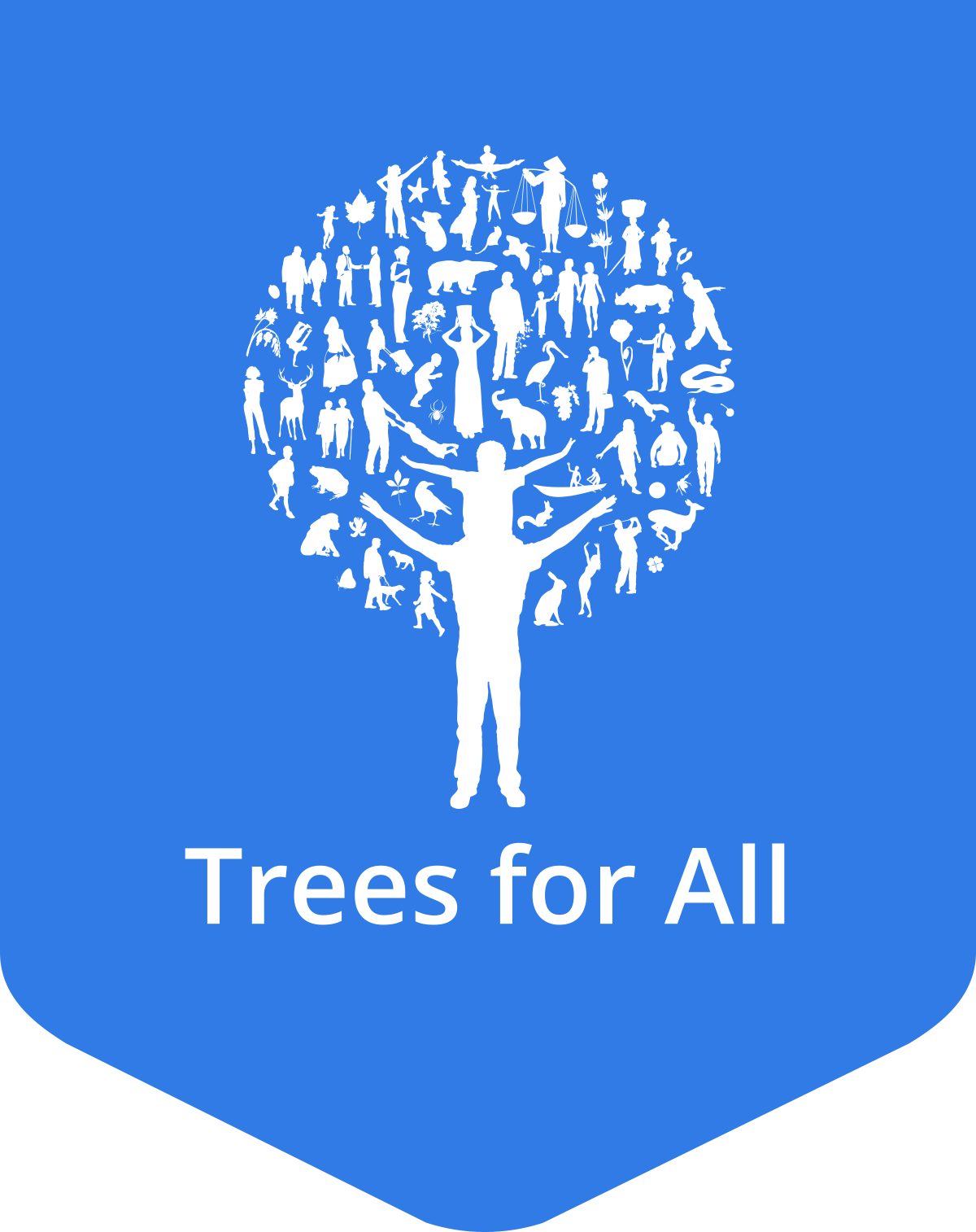Dorpsbos Kolham
Bosherstel in Groningen
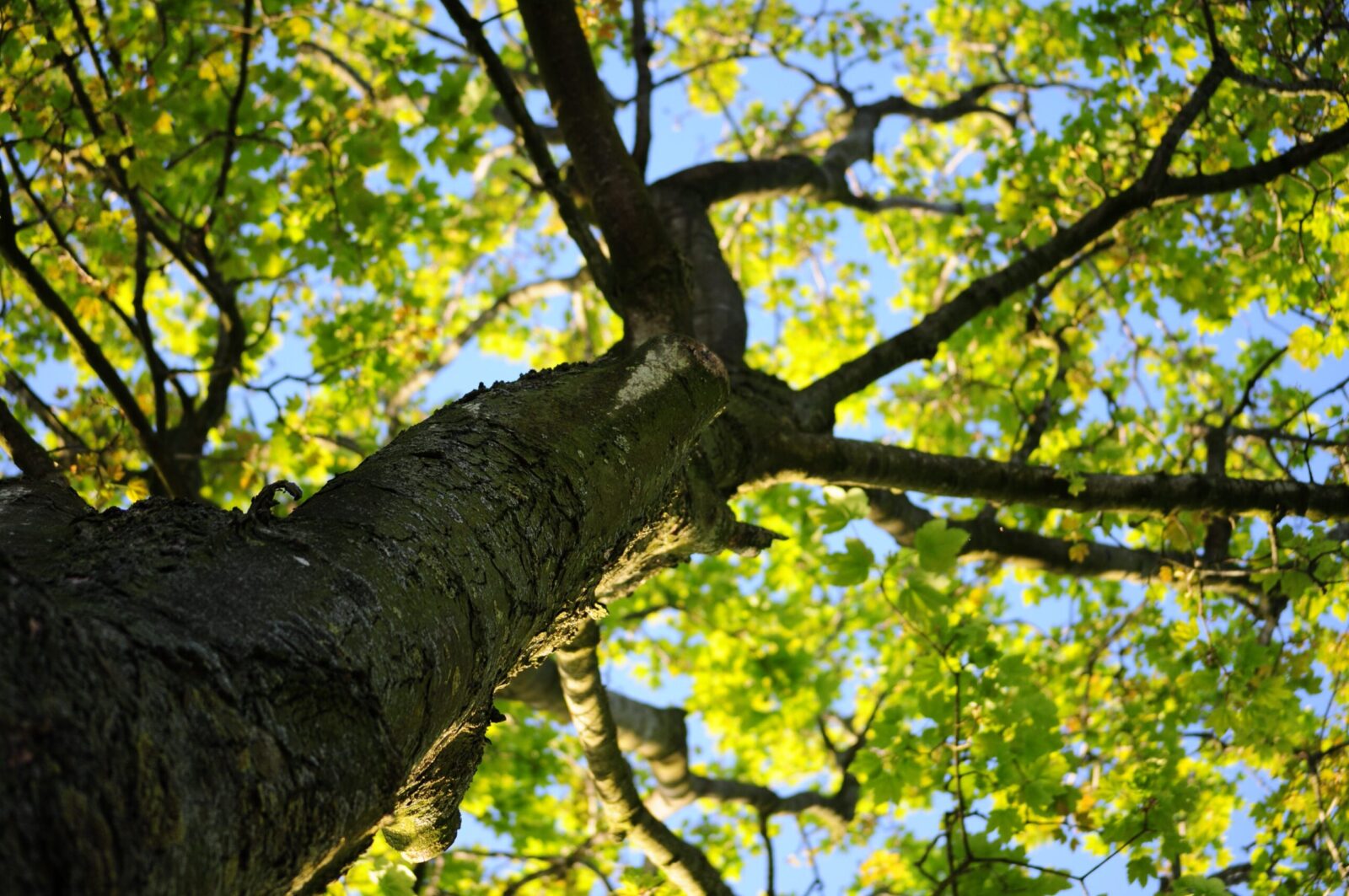
2024 was a special year for Trees for All, as we celebrated our 25th anniversary! Over the past quarter of a century, we have grown into an organisation that makes an impact worldwide, and together we have planted more than 12 million trees. We celebrated this special milestone by planting our own Anniversary Forest in the Netherlands, along with over 400 enthusiastic donors and our partner Brabants Landschap.
And that was not all. In 2024, we succeeded in planting 1,784,282 trees around the world, thanks to the support of our donors and partners. That is a fantastic result, for which we would like to express our huge thanks to everyone who made a contribution.
In the meantime, our organisation did not stand still. Simone Groenendijk stepped down as managing director and was succeeded by two new directors. Stef Röell started as director of Projects and Innovation on 1 October 2024. In addition, Marieke Romano joined as director Fundraising, Marketing & Communications on 6 January 2025.
We are extremely grateful to Simone for the six years she dedicated to our organisation. With her boundless energy, she has continued to grow Trees for All into the organisation it is today.
“I am proud of the impact Trees for All has been able to make in recent years. I would like to thank all donors and partners for the wonderful collaboration and their trust in our approach. It has been a special and meaningful journey for me, which I look back on with great pleasure and gratitude!”
– Simone Groenendijk
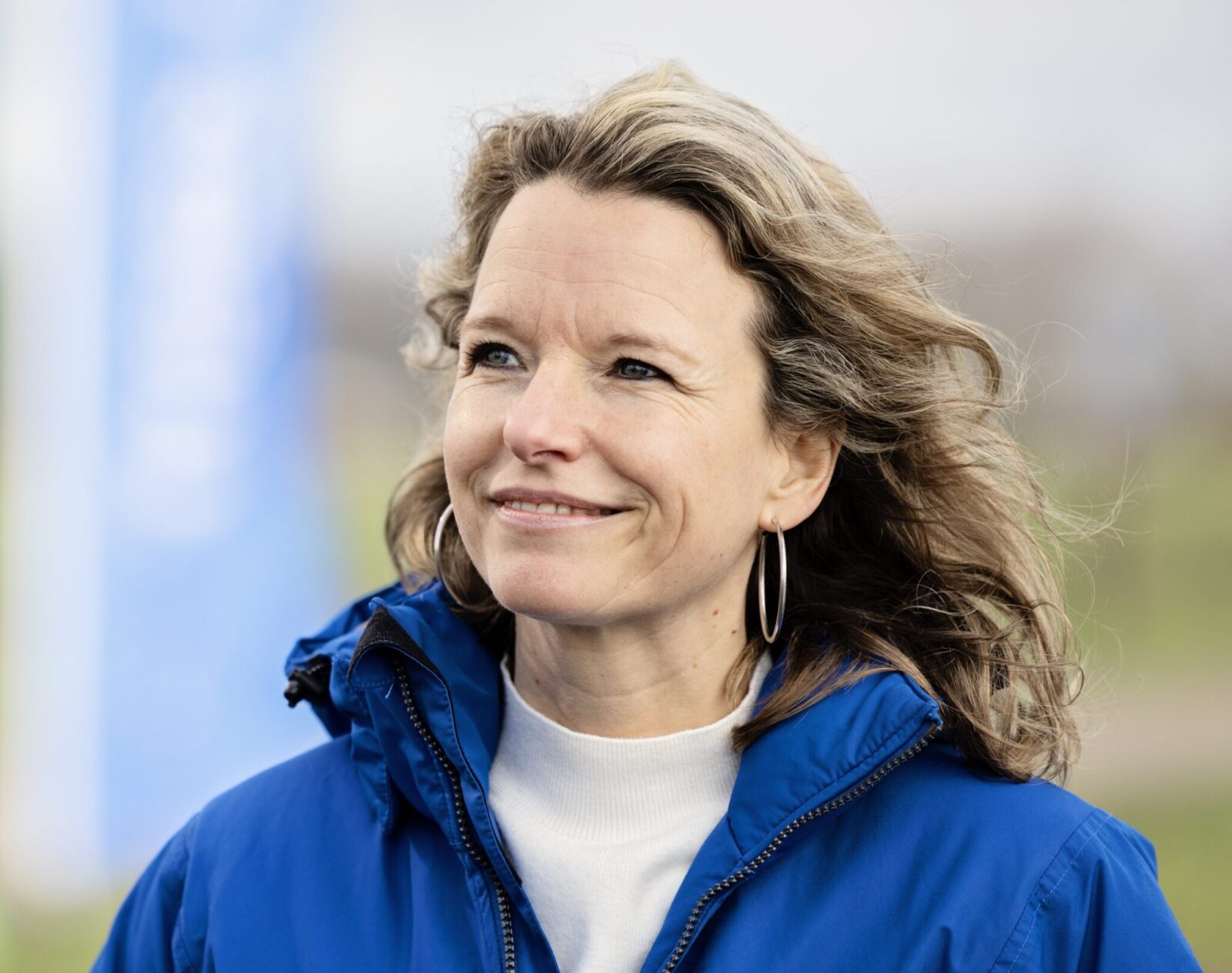
There were also changes in the field. A wet winter in the Netherlands meant we had to postpone several tree planting days until early spring. At the same time, there was a long period of drought in Latin America and Asia, and we had to wait for the first rains to fall – which fortunately did happen eventually.
These circumstances underline the importance of planting new forests, reforestation and forest protection, as trees prevent further climate change and ensure more biodiversity, better water absorption and cooler temperatures.
So in 2025, we will be continuing our work at full tilt and hope to be able to count (once again) on your support. Because without all our donors, partners and ambassadors, we could never have made such an impact over the last quarter of a century. Thank you all for your commitment!
On behalf of the board and directors of Trees for All,



trees planted in the Netherlands and abroad
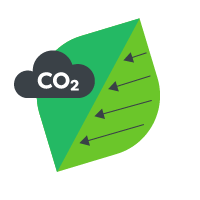
tons of CO2 offset through certified projects

families helped with work and income

projects in 15 countries
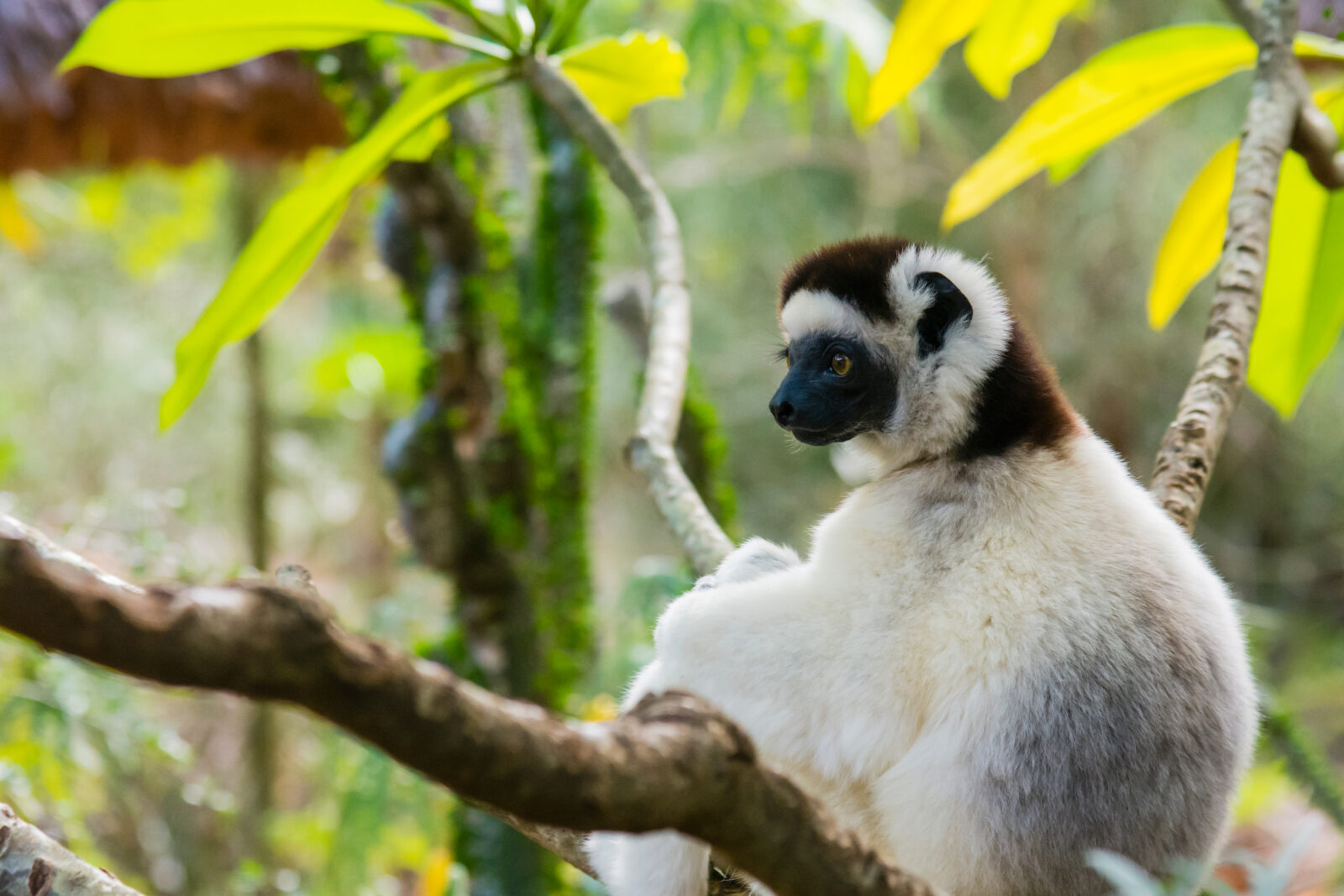
All our tree planting and reforestation projects have a broad impact and contribute to a better climate, more biodiversity and healthier living conditions.
Our biggest milestone in 2024 was our 25th anniversary. For the first time, donors could plant a tree in their name in our digital Anniversary Forest. Afterwards, we planted the Anniversary Forest physically, in North Brabant, along with 400 donors. Our birthday wish was to plant 25,000 trees, but that turned into over 57,000!
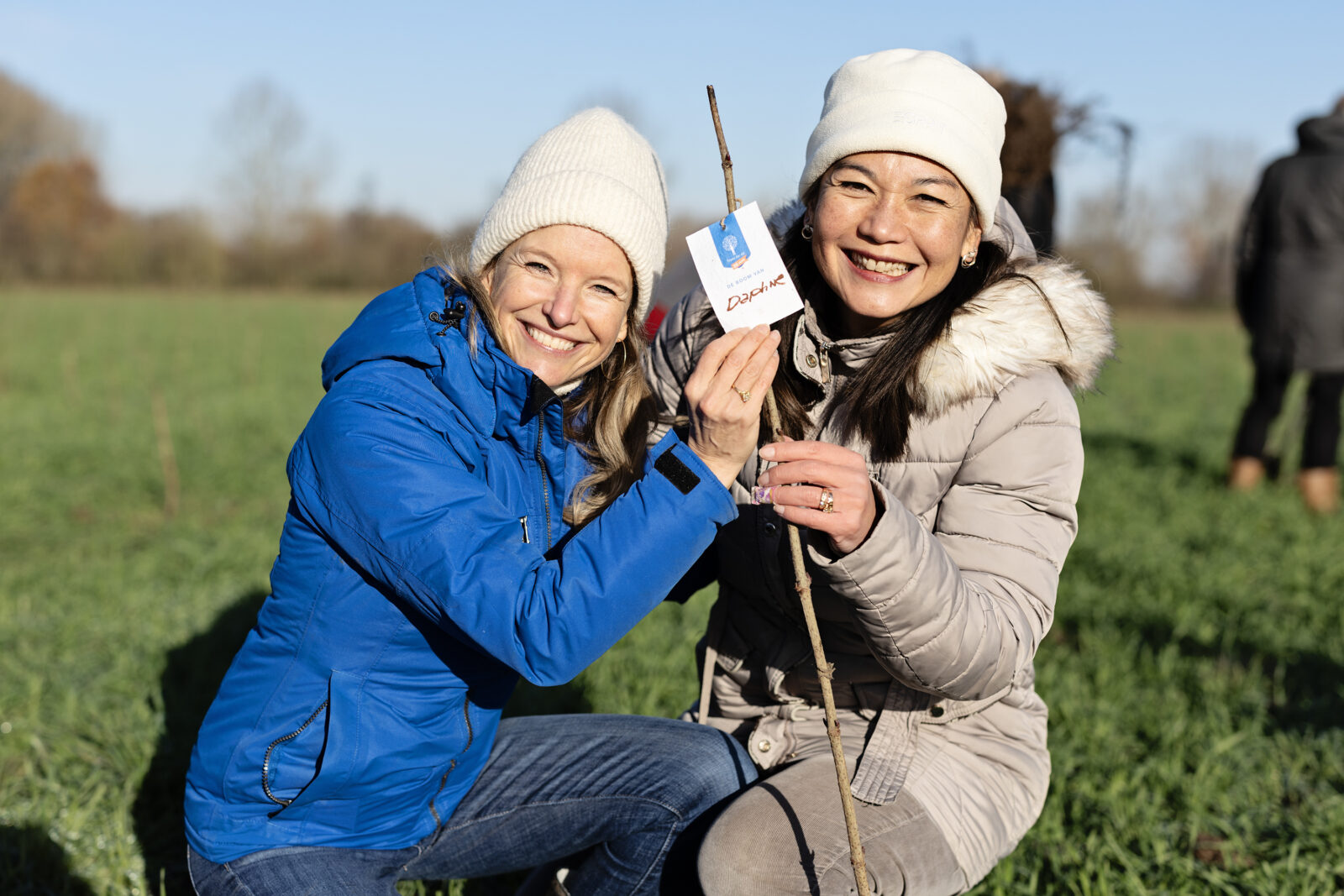
We are proud of the dedicated supporters who help us fulfil our mission: planting more trees worldwide and raising people’s awareness of the importance of trees. In 2024, we could count on support from no fewer than 2,156 businesses and 17,202 private individuals!
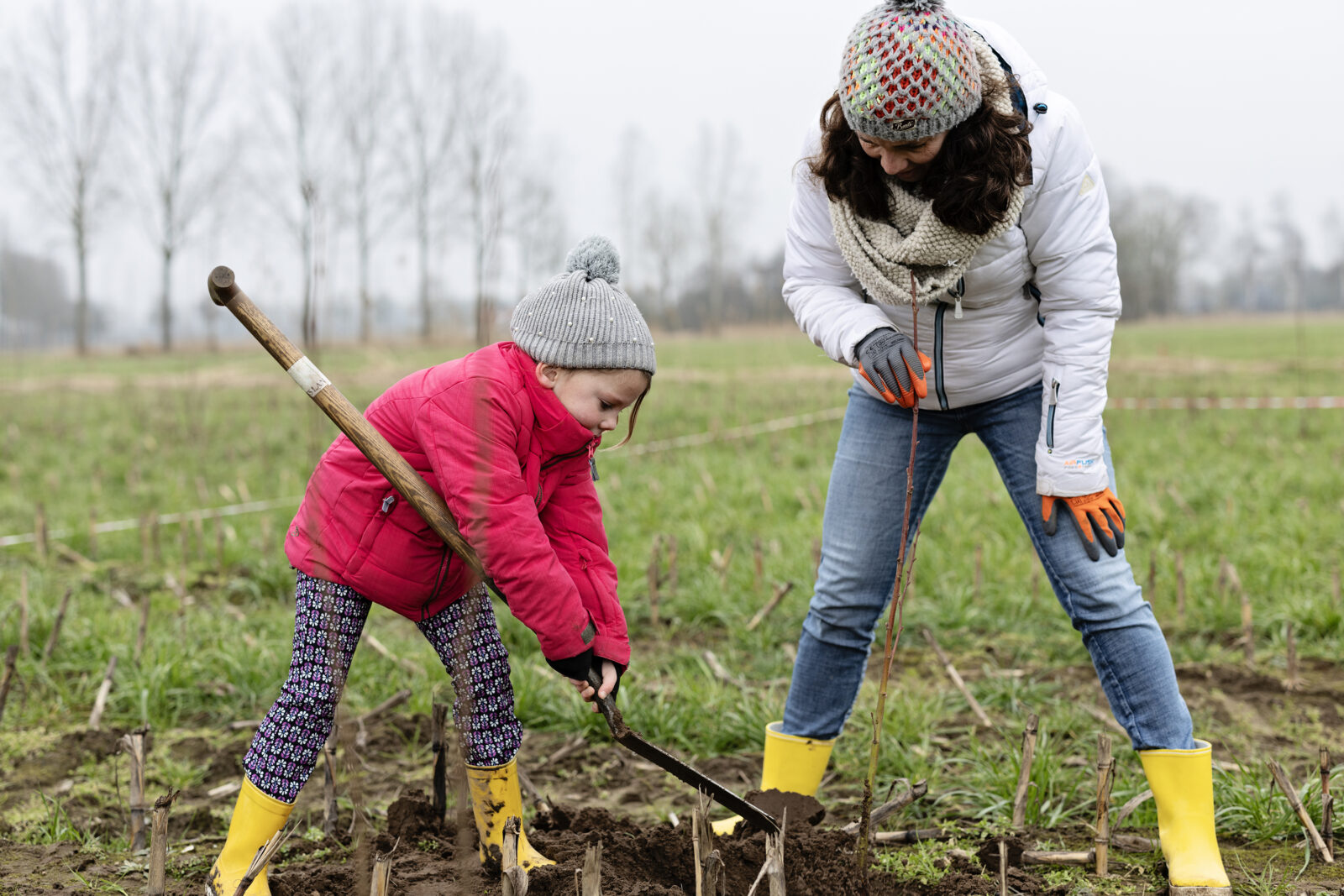
Over the course of 2024, we organised 28 tree planting days in the Netherlands, for which more than 1,500 people rolled up their sleeves, including private individuals and organisations. It is fantastic to come together like that and make a concrete contribution to a greener world.
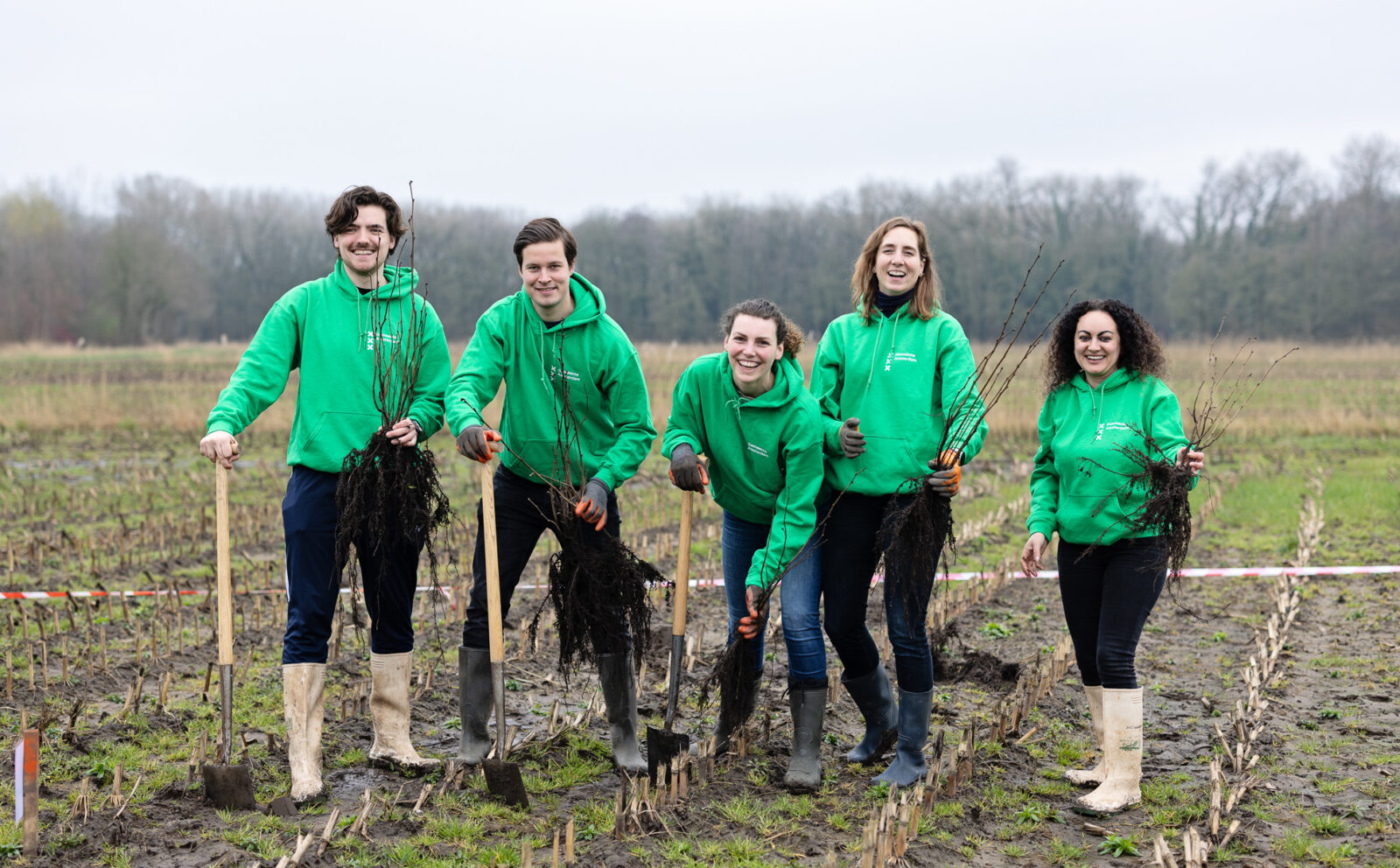
In the Netherlands, we supported 36 projects (both new and ongoing). We planted new forests, restored existing forests and worked on greening the countryside and urban areas. And through our GroenDoen Fonds, we facilitated a further 37 small-scale greening projects across the country!
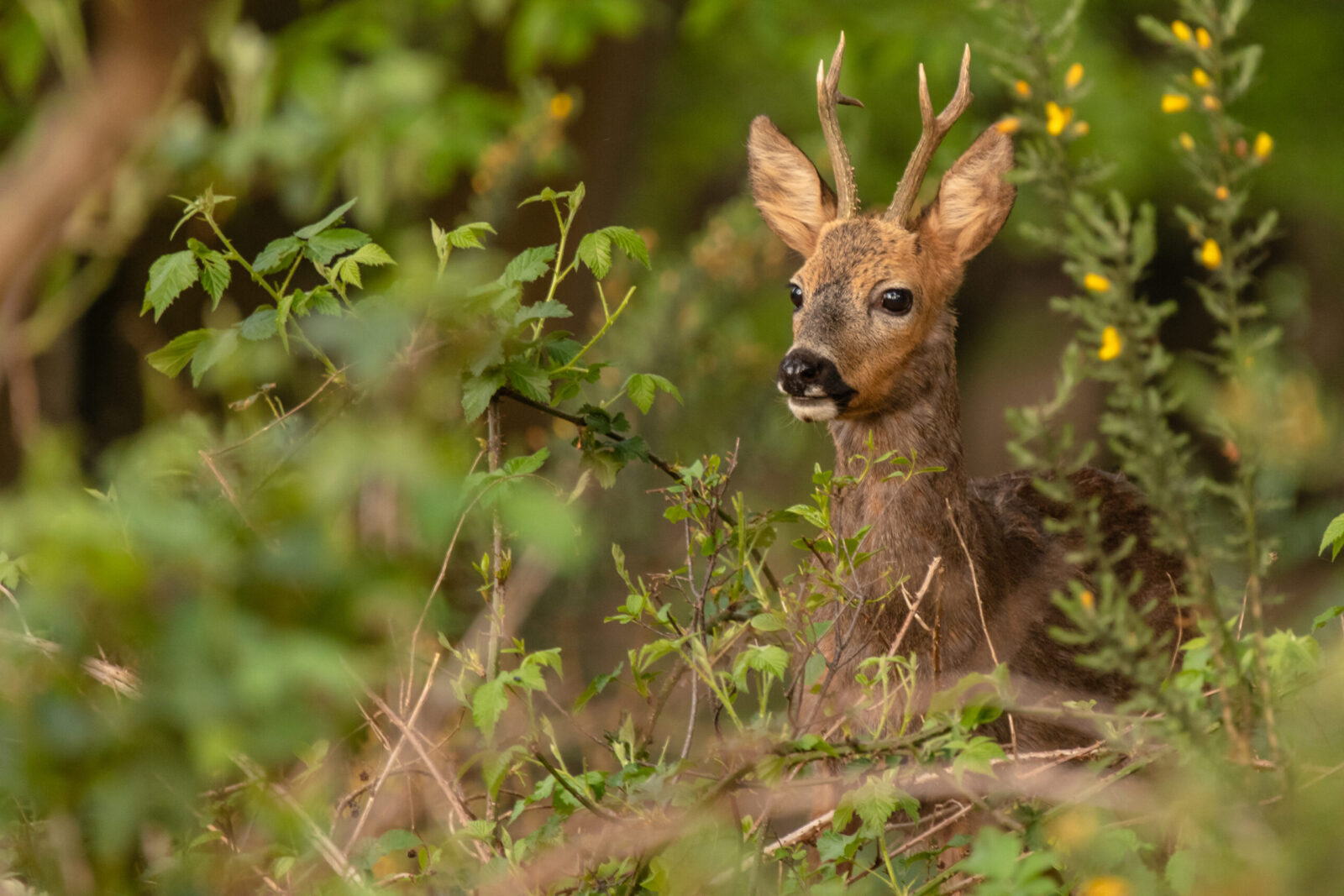
Our biggest milestone in 2024 was our 25th anniversary. For the first time, donors could plant a tree in their name in our digital Anniversary Forest. Afterwards, we planted the Anniversary Forest physically, in North Brabant, along with 400 donors. Our birthday wish was to plant 25,000 trees, but that turned into over 57,000!

We are proud of the dedicated supporters who help us fulfil our mission: planting more trees worldwide and raising people’s awareness of the importance of trees. In 2024, we could count on support from no fewer than 2,156 businesses and 17,202 private individuals!

Over the course of 2024, we organised 28 tree planting days in the Netherlands, for which more than 1,500 people rolled up their sleeves, including private individuals and organisations. It is fantastic to come together like that and make a concrete contribution to a greener world.

In the Netherlands, we supported 36 projects (both new and ongoing). We planted new forests, restored existing forests and worked on greening the countryside and urban areas. And through our GroenDoen Fonds, we facilitated a further 37 small-scale greening projects across the country!

We were also active beyond our national borders, supporting 19 international projects in 15 countries. One extra special activity was the start of our own reforestation project in Tanzania, where we are protecting the unique biodiversity of the Nguru Mountains, along with the PAMS Foundation and the local population.
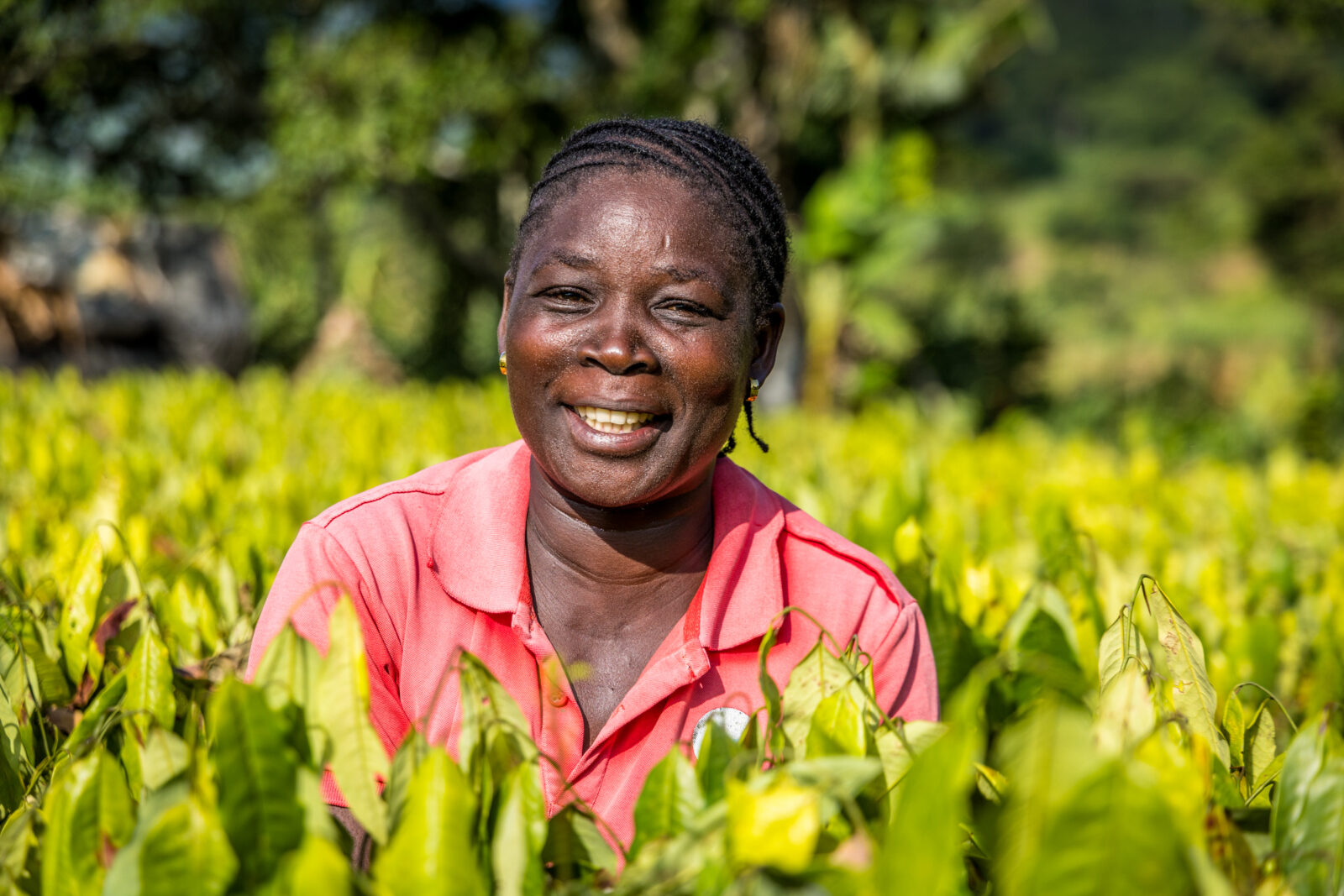
Through our schools programme for students in senior secondary vocational education (mbo), Trees for Schools, we aim to raise students’ awareness of the climate and the importance of trees. Alongside their climate lessons, the students designed their own green school grounds and planted trees and shrubs on the grounds. Through the programme, we have already reached 1,500 students!
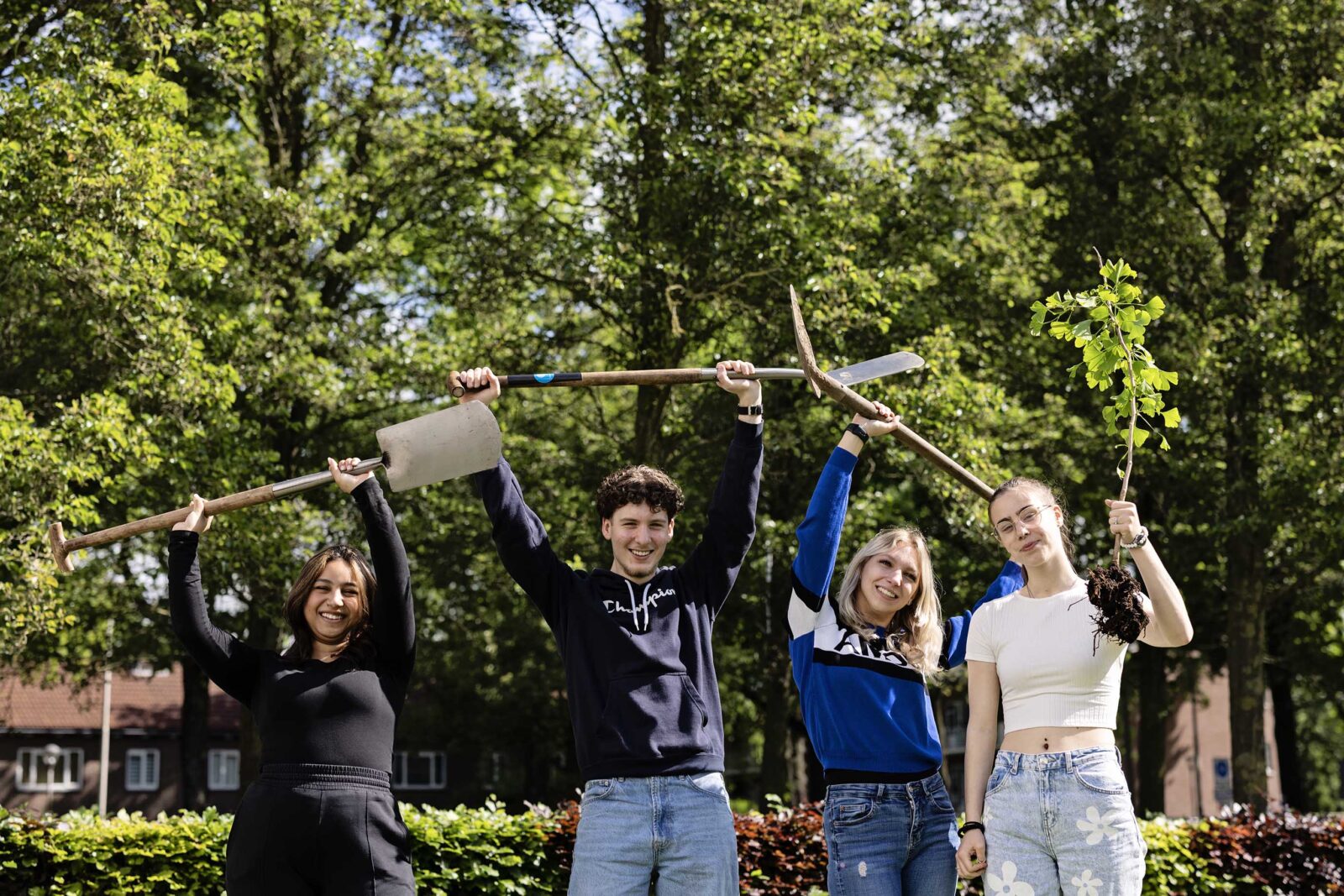
We were also active beyond our national borders, supporting 19 international projects in 15 countries. One extra special activity was the start of our own reforestation project in Tanzania, where we are protecting the unique biodiversity of the Nguru Mountains, along with the PAMS Foundation and the local population.

Through our schools programme for students in senior secondary vocational education (mbo), Trees for Schools, we aim to raise students’ awareness of the climate and the importance of trees. Alongside their climate lessons, the students designed their own green school grounds and planted trees and shrubs on the grounds. Through the programme, we have already reached 1,500 students!

Through our work, we contribute to several Sustainable Development Goals, focusing on:
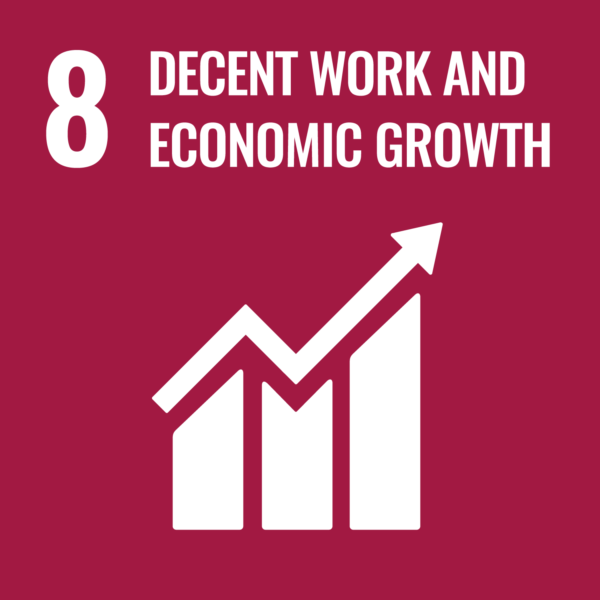
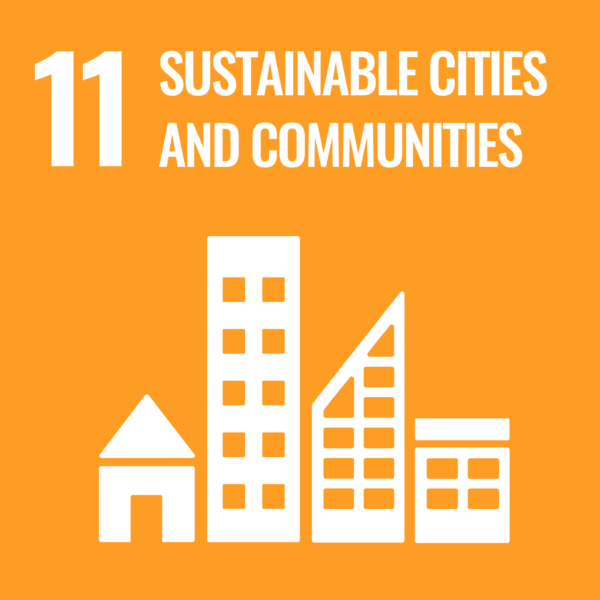
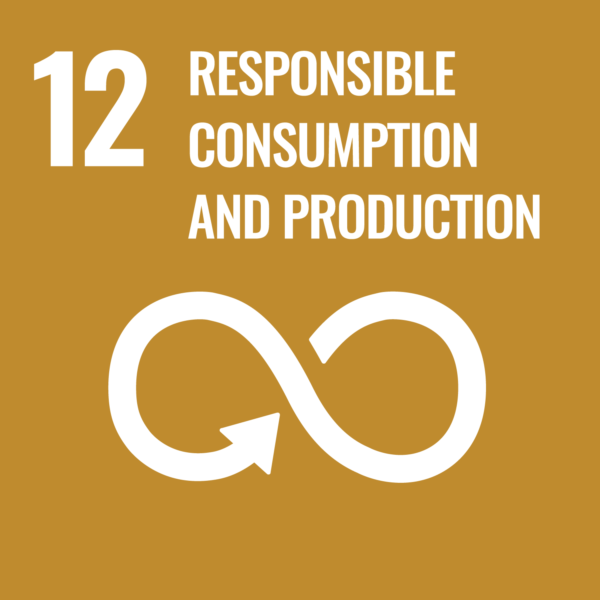
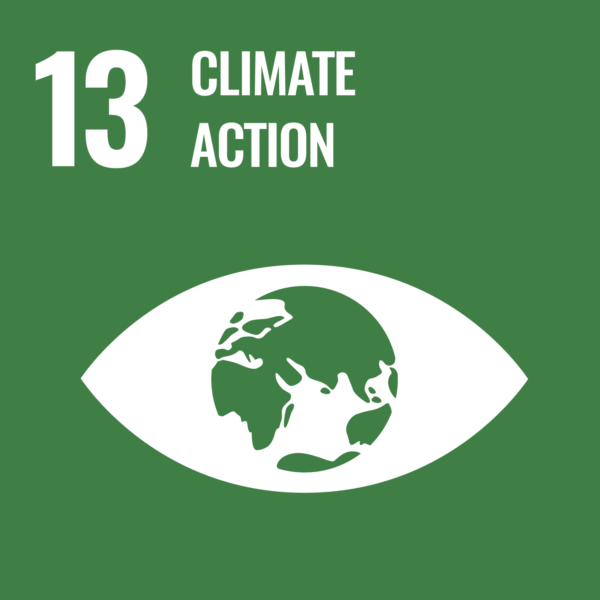
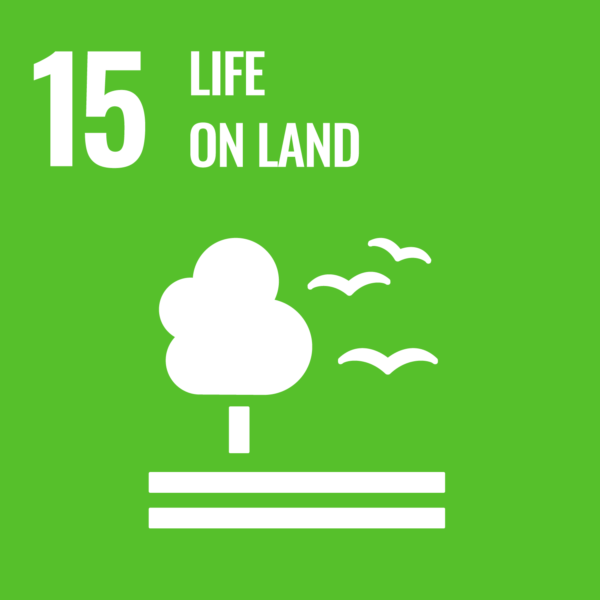
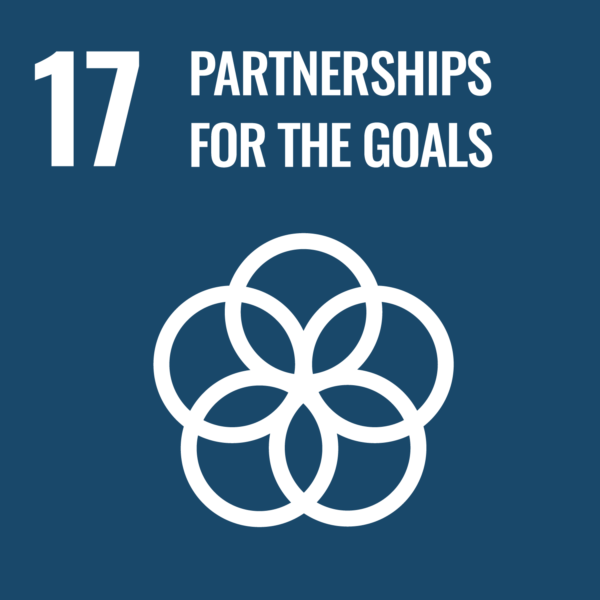
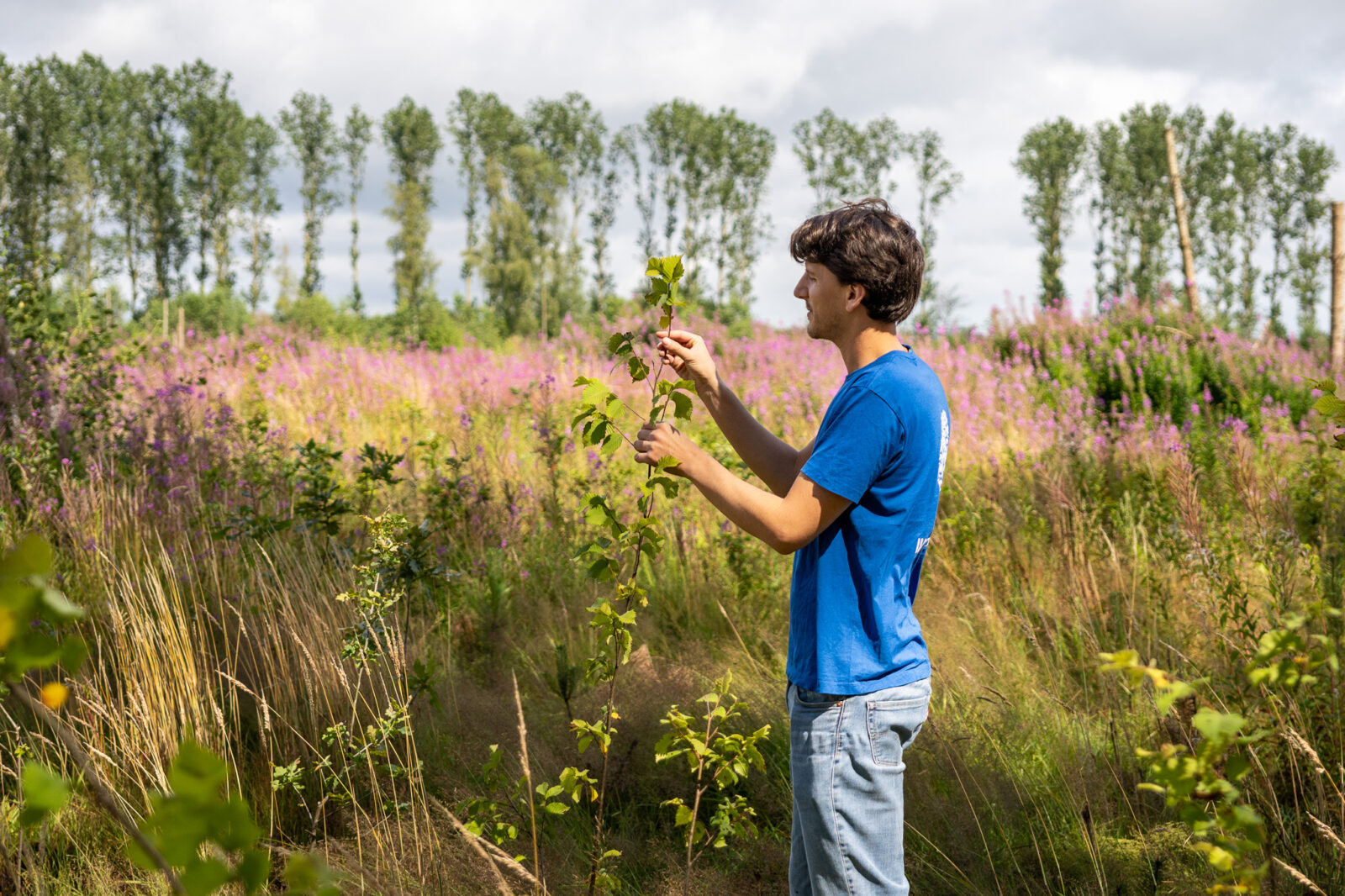
Trees are essential to all life on earth. That’s why Trees for All has devoted 25 years to creating more forests in the world. We plant trees in the Netherlands and abroad, as well as raising people’s awareness of the importance of trees. Along with our donors and partners, we work on ensuring a better climate, more biodiversity and healthier living conditions.
Trees are essential to all life on earth. That’s why Trees for All has devoted 25 years to creating more forests in the world. We plant trees in the Netherlands and abroad, as well as raising people’s awareness of the importance of trees. Along with our donors and partners, we work on ensuring a better climate, more biodiversity and healthier living conditions.
For an organisation devoted to creating more forests in the world, it is only logical that sustainability is a priority. We plant trees and forests responsibly, with a view to the long term. We have been doing so for 25 years now, as a reliable recognised charity with a CBF certificate. We work with a team of experts who attach great value to personal contact with partners and donors, and with one another. After all, in order to plant as many trees as possible, we need as many people as possible. So our outlook is always positive: together we can make a difference!
Trees for All supports tree planting and reforestation projects all over the world. Half of the trees are planted in the Netherlands and the other half abroad. This is a deliberate choice. Climate change, deforestation and the loss of biodiversity are global problems, which we want to tackle both close to home and on the other side of the world. We do so by working with our partners on planting new forests and restoring and protecting existing forests.
All the projects we support have a broad impact. That means they contribute to:

The trees we plant sequester carbon. So they prevent further global warming and ensure a liveable climate.

Trees and forests form the habitat for numerous plants and animals. By planting and protecting forests, we reinforce and increase biodiversity all over the world.

Trees provide us with oxygen, fresh air, water, food and medicines. Moreover, our international projects improve the living conditions of local communities, as they are a source of more work, income and food.
Quality is an important principle in our work. We plant the right tree in the right place and ensure it is looked after in the right way. In practice, this means we prefer to plant native species that belong to a specific area. We also invest in long-term relationships with our project partners.
All our partners have a sound (re)forestation plan. They are able to provide long-term management of trees and forests and have a track record in doing so. They also have sufficient capacity to implement a project. And Trees for All remains involved in a project for at least ten years, thus ensuring that trees and forests are managed well – not just now, but also in the future.
Trees for All links support from society (private individuals and businesses) to professional parties (our project partners), who include landscape or nature conservation organisations in the Netherlands and abroad.
Our project partners either own the land or cooperate with private landowners or local communities, who make their land available. We then provide the necessary funding, project supervision and additional knowledge and expertise. In short, our work is based on our role as a bridging party.
Finally, we believe that together we can make a difference. We do so by raising people’s awareness of the importance of trees, and above all by offering concrete and positive prospects for action.
Anybody who wishes can approach us to plant trees or offset their carbon emissions. Because although one tree might not make a forest, hundreds or thousands together do. In this way, we create a green and healthy planet for ourselves and pass it on to future generations!
Trees for All is a Public Benefit Organisation (ANBI) with a CBF certificate. The CBF checks that recognised charities meet strict quality requirements, thus guaranteeing that your donation contributes to a better world and that you can trust Trees for All.

Trees for All supports tree planting and reforestation projects worldwide. How do we select these projects? And more importantly, how do we ensure that trees grow to become a strong and mature forest in the long term, thus contributing to more biodiversity and to the local surroundings?
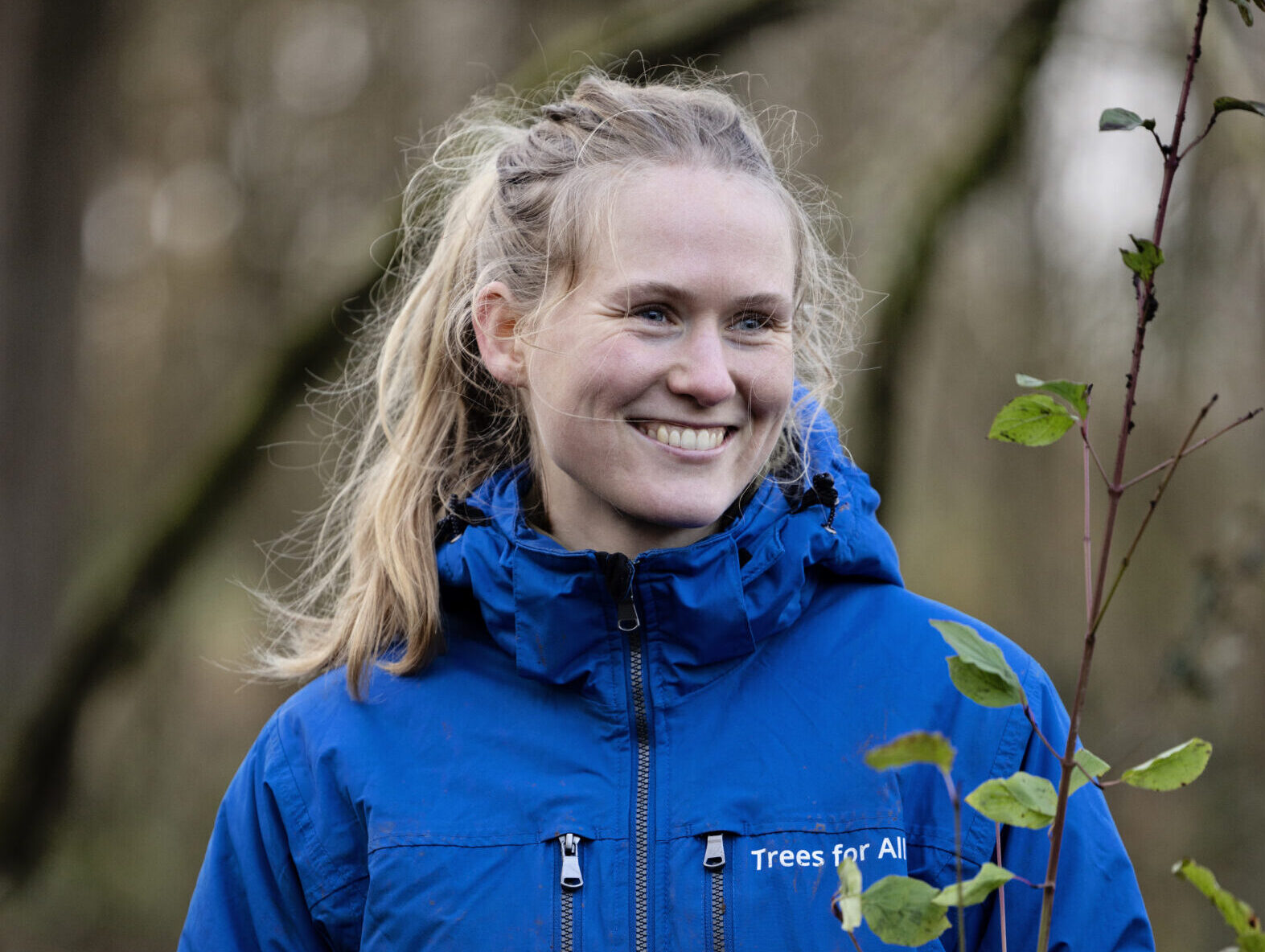
All our projects and partners are carefully selected by our in-house project managers, who test each project against our project criteria. All our project managers have great expertise in forest and nature management and are closely involved in the various projects. This involves assessing planting and management plans, as well as monitoring the project in the long term.
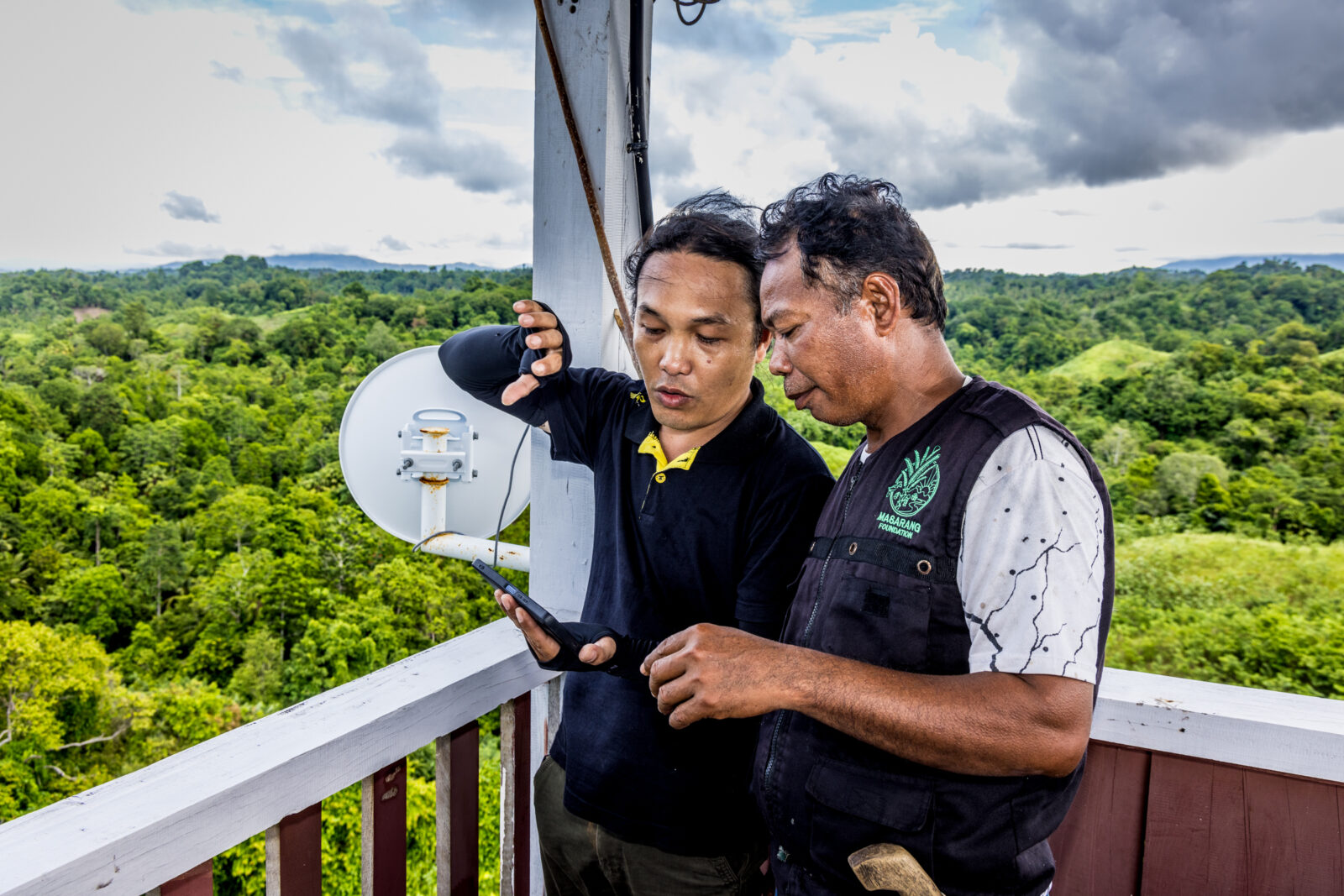
We monitor and evaluate all our projects carefully. Our project partners in the Netherlands and abroad are obliged to keep us regularly informed about the trees planted and to provide us with reports. We also monitor projects ourselves through several field visits.
In order to measure the short-term and long-term effects well, we also make additional investments. In Indonesia (Sulawesi), for example, the development of the new forest is tracked permanently from an observation tower. And in Mexico, our project partner does various biodiversity measurements, assisted by innovative monitoring technology and local universities.
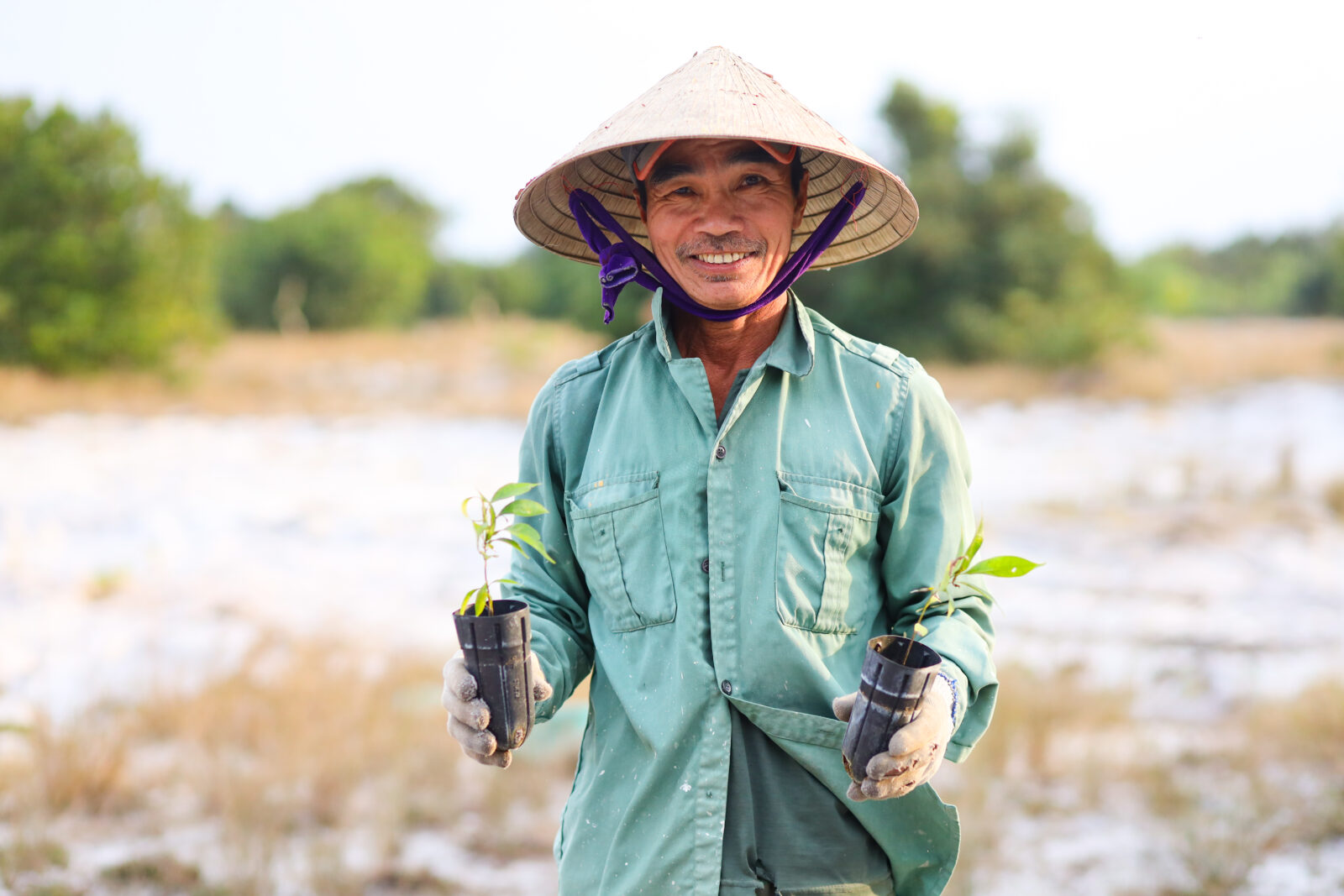
Tree planting and reforestation projects necessarily involve challenges. We try to avoid as many risks as possible through taking preventive measures, such as creating firebreaks, providing extra water supplies for planting, or constructing fencing to protect the trees against damage from animals.
At the same time, we cannot predict every situation, and sometimes it is necessary to adjust a project. Thanks to our close involvement in the projects and the flexibility of our project partners, we are able to do so promptly and take additional measures where necessary.
All the projects we support have a broad impact. This means a project always contributes to a better climate, more biodiversity and healthier living conditions. Our projects abroad also ensure extra work and income for local communities.
We only contribute to projects that focus on planting trees. This may involve planting new forests or restoring and reinforcing existing ones. In the Netherlands, we also support the planting of landscape elements, food forests and urban greenery.
Our preference is for planting native species, and trees and shrubs that are typical of the area. These are species that occur naturally in the area or which have proved to thrive there over the centuries. They have a positive influence on local biodiversity and on the ecosystem as a whole.
We plant trees and forests for the long term. So for each area, we join our project partners in looking at what is needed for trees to grow into a healthy and climate-proof forest. That might include setting up a temporary enclosure, providing extra irrigation for the trees planted or carrying out soil tillage.
Our project partners are responsible for the long-term management of the trees and forests. Agreements about this are laid down in contracts. We remain involved in a project for at least ten years during which time our project partners keep us informed through monitoring reports. We also visit the projects ourselves.
We work with project partners who have a good track record . That means that they have demonstrable experience in developing and implementing tree planting and reforestation projects. Preferably, our partners have gained this experience in the region where the project is taking place.
For projects abroad, we work on the basis of integral project financing. In short, we look at the complete context of the project, which may include setting up nurseries, protecting and irrigating trees, long-term monitoring, or training courses in forest management and fire prevention. Our projects also benefit the local population, as they contribute to work and income, better food security or improved water supplies.

From Amsterdam to the Achterhoek, and from Friesland to South Limburg: in 2024, we supported 36 projects for greening the Netherlands. We planted new forests, restored existing forests and supported the planting of food forests and urban greenery.
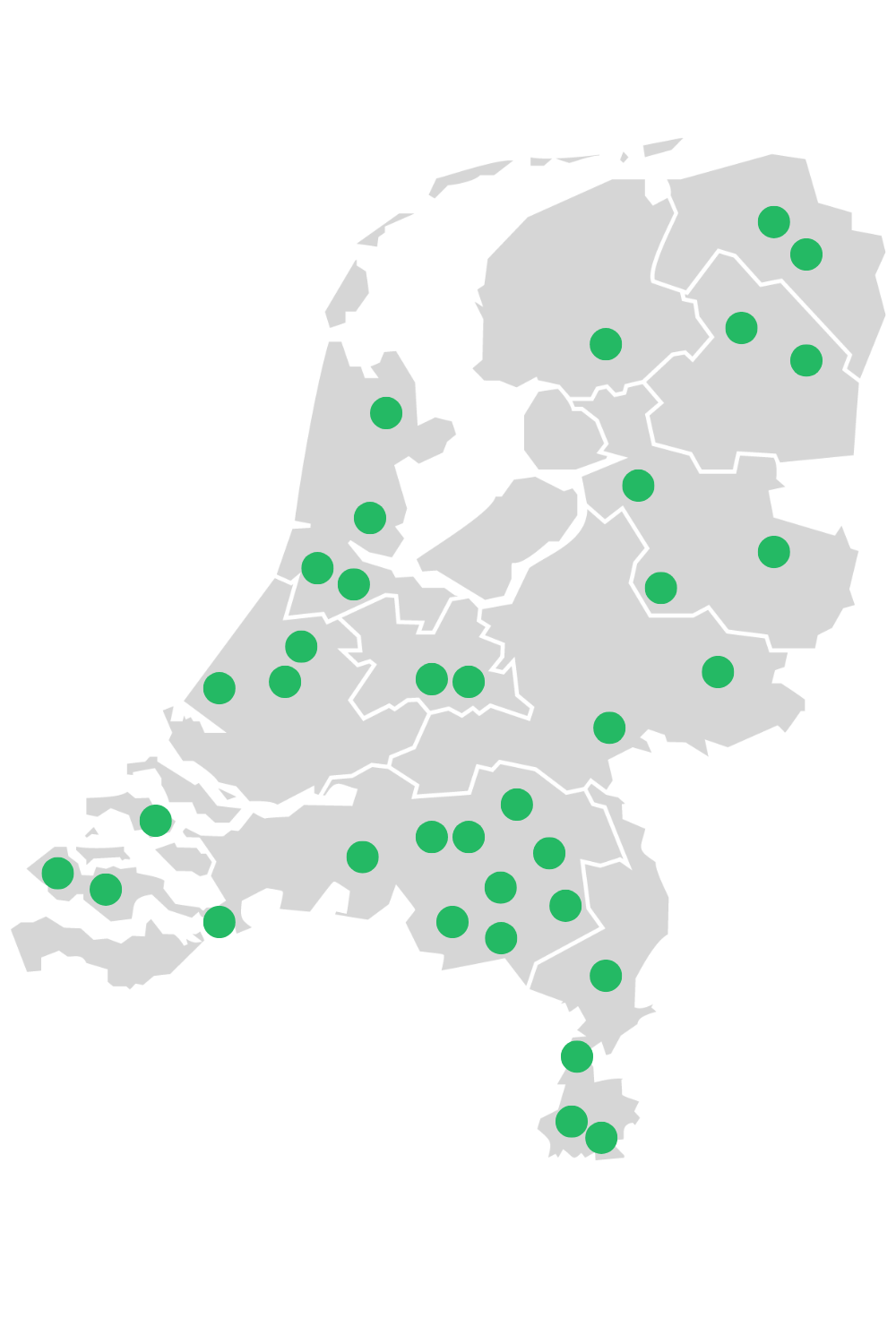
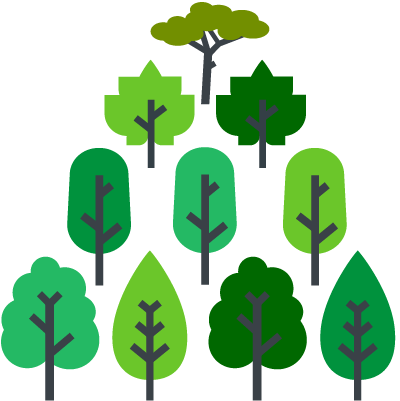
planting new forsers or avenue trees
restoration of damaged forest and reinforcement of existing forests

planting trees and hedges in rural areas

planting trees and shrubs in and around towns

planting forests of trees and shrubs that produce food
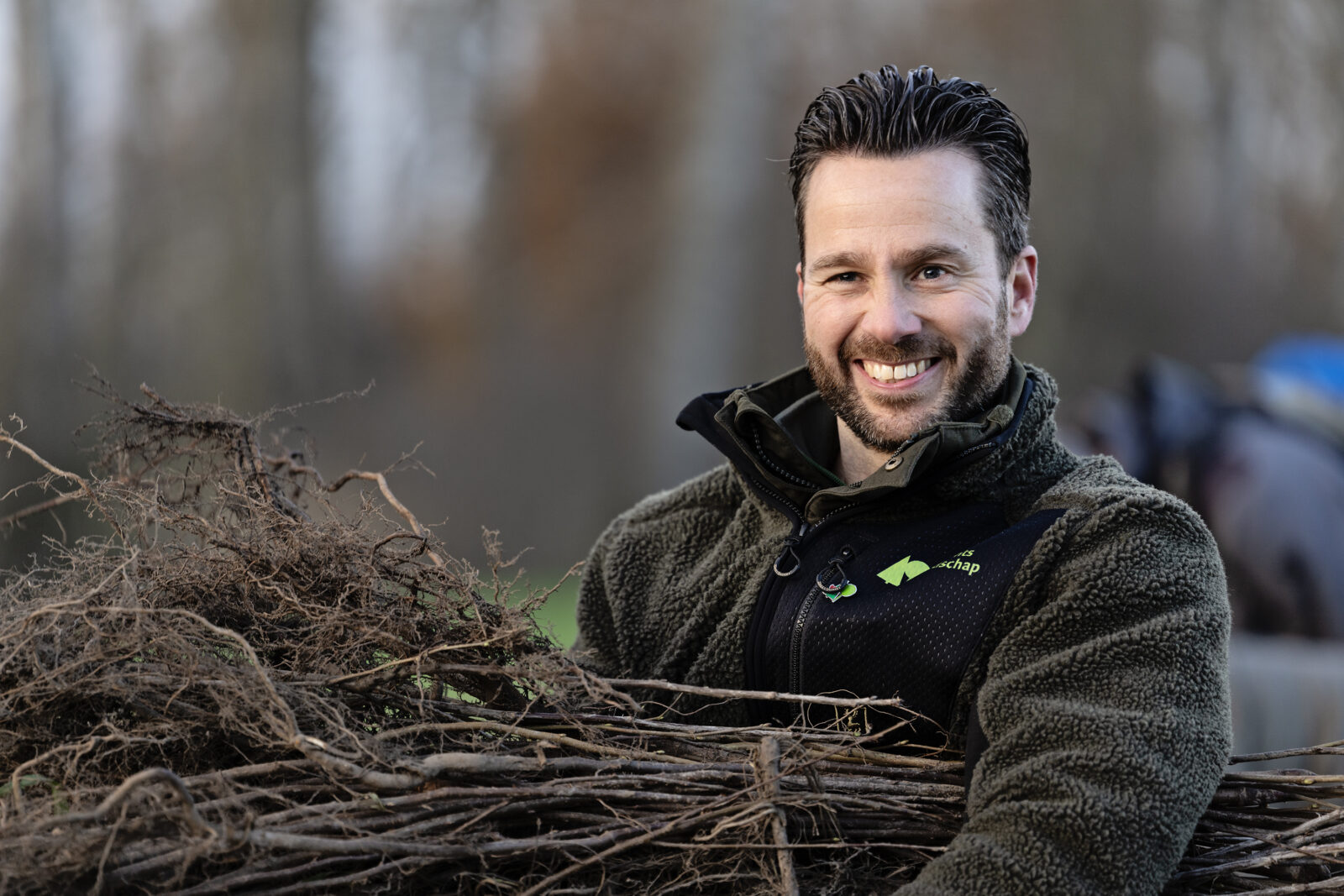
Planting trees requires thorough preparation, but above all a flexible attitude. In 2024, for example, we had to contend with an extremely wet winter, which meant we had to postpone several tree planting days until the early spring. Fortunately, thanks to the flexibility of our project partners, we succeeded in planting nearly all the trees on time. In just a few case, the planting schedule was shifted to the winter of 2024-2025.
Last year, we planted new forests at various locations in the Netherlands. We did so, for instance, on former agricultural land, in order to link up existing natural areas.
A good example of this is our project with ARK Rewilding Nederland, in which we are expanding rare loam forests in North Brabant. These forests are home to numerous plants and animals, which are gaining more habitat thanks to our planting. In this way, we are reinforcing the unique biodiversity of the loam forests.
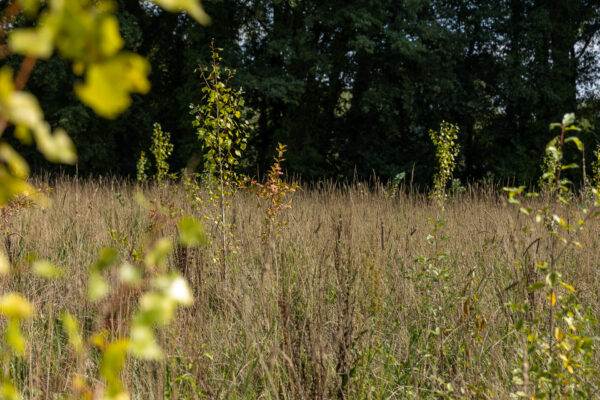
Besides planting new forests, we have also worked on restoring and revitalising existing forests. In the past, many monocultures were planted in the Netherlands, which consist of only one or a few species of tree. This makes those forests extra vulnerable to drought, disease or pests, or a combination of them.
We are future-proofing these forests by planting a wide variety of trees and shrubs that suit the conditions of the local environment. This creates strong, resilient forests that can take knocks in the future as well, and which are more resistant to change. A good example of this is our project in the Limburgse Peel en Maas, where we have reinforced an existing forest with 19 new native species.
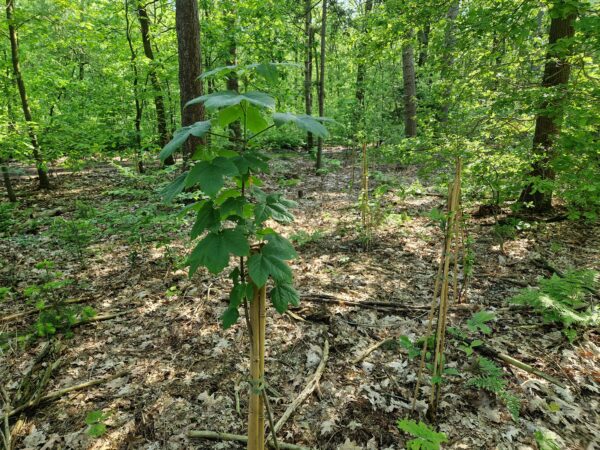
Throughout the Netherlands, we also supported the planting of landscape elements, such as rows of trees, hedges or small copses. Many of these elements have disappeared over the years. Along with farmers and private landowners, we are working on restoring them, which is an important goal for many reasons. Landscape elements boost biodiversity, sequester carbon, improve the soil and water balance, link up existing natural areas and create an attractive landscape.
In South Limburg, for example, we planted over 30,000 trees, shrubs and hedgerows in partnership with Omniverde, to link up two natural areas. By doing so, we are expanding and protecting the habitat of the critically endangered garden dormouse, of which only two populations remain in the whole of the Netherlands.
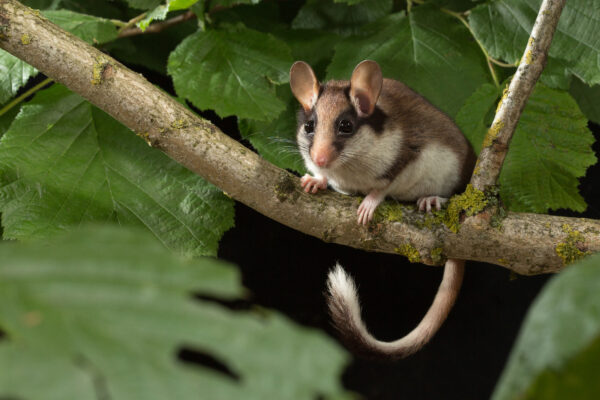
The dormouse (photo: Wesley Overman)
Meanwhile, we also continued our work on planting food forests, where trees, bushes and plants are grown that provide food, such as vegetables, fruit and nuts. Food forests thus play an important role in the transition to environmentally friendly agriculture; a development to which Trees for All is happy to contribute.
For instance, we facilitated the creation of the Roestelberg Food Forest in Kaatsheuvel. Besides the food forest, this location will also house an information centre, tea garden and shop where you can buy produce from the forest. Pupils from primary schools in the region also lent a hand with the planting. It is a good example of a project from which the local community can both learn and benefit!
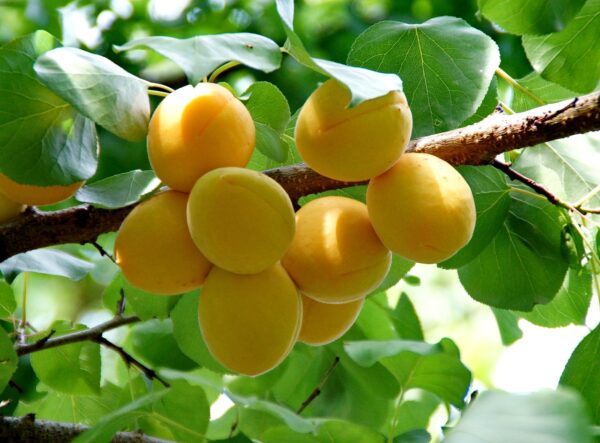
We were active in the urban environment as well, working on greening the municipalities of Bergen op Zoom and Asten. We also made plans to plant more trees and shrubs in the municipalities of Utrecht and Haarlemmermeer.
Another new activity was the development of a pilot to green industrial estates. In 2025, we will roll out this pilot, in order to create better links between the urban environment and the surrounding countryside. And all that greenery will also create healthy surroundings for the people working there!
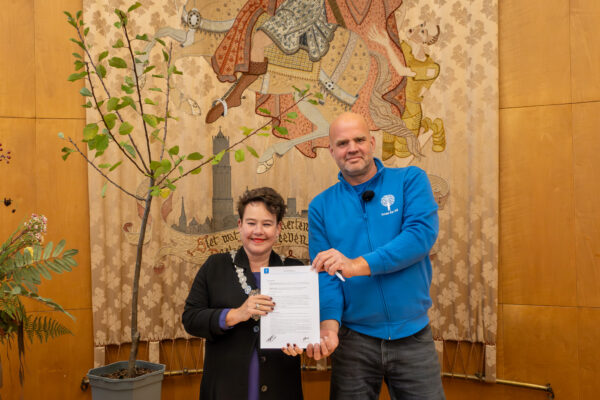
Sharon Dijksma, Mayor of Utrecht, and Stef Röell, Director of Projects and Innovation, signed a letter of intent for more trees in Utrecht
We were not alone in planting all those trees. We collaborate with dozens of project partners throughout the Netherlands, who own the land and manage the trees and forests in the long term. Some of them, like ARK Rewilding, Brabants Landschap and Landschap Overijssel, have been working successfully with us for many years already. In 2024, we also entered into new partnerships and valuable collaborations for the future, such as De Groene Stelling.
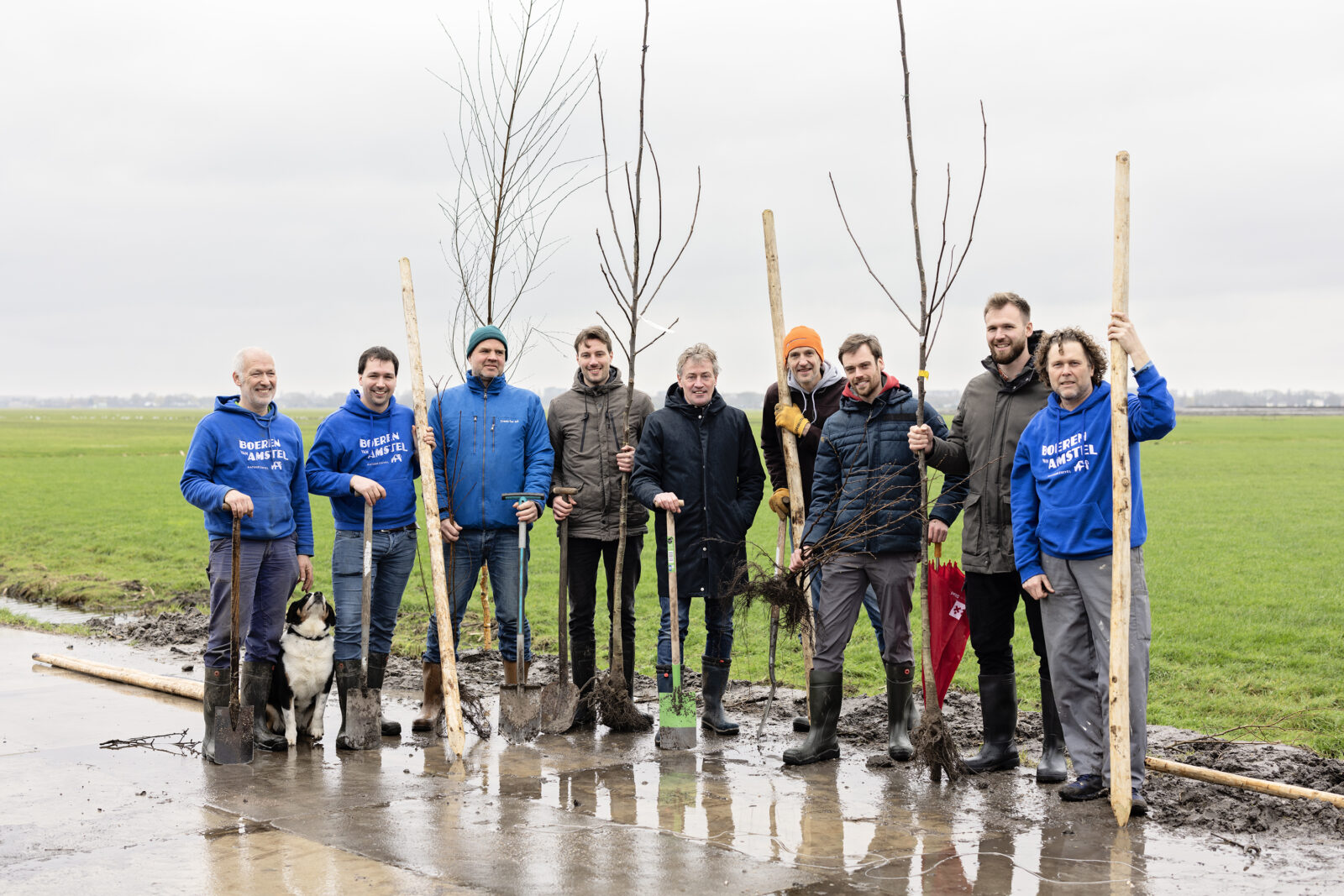
De Groene Stelling is an initiative trough which social partners, farmers, entrepreneurs and residents are working to create a greener landscape around Amsterdam. The first project kicked off in February, when 16 dairy farmers from Amstelland planted trees on and around their farmyard, in order to give a boost to biodiversity and the landscape. More projects will follow in the coming year!
In 2024, we implemented our projects in the Netherlands together with the following project partners:
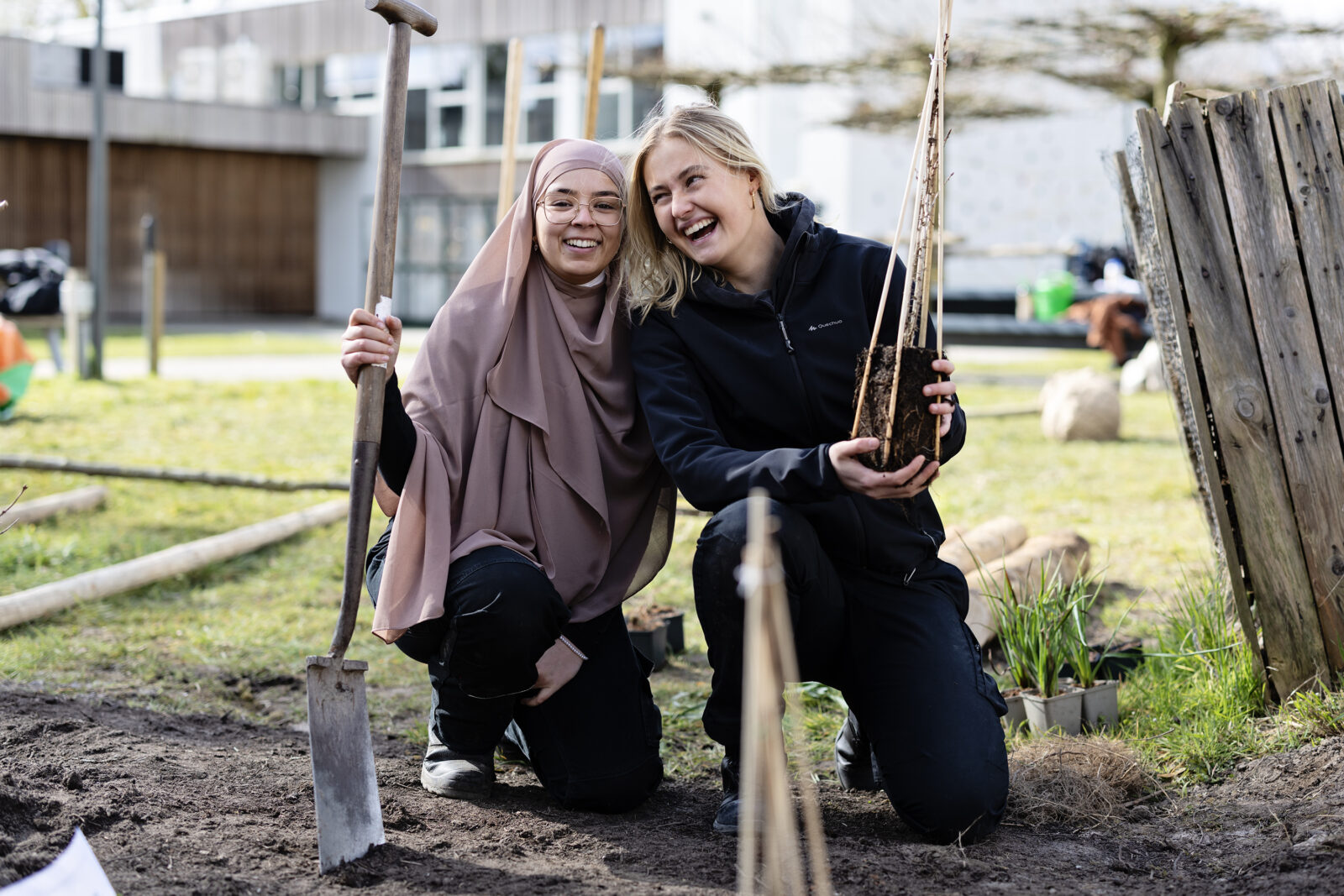
Alongside the projects we facilitate, we have also set up several of our own programmes to help make the Netherlands greener. This allows us to make an even bigger impact, together with our partners.

Fund for small-scale greening projects by local foundations and associations
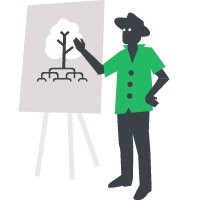
Schools programme for senior secondary
vocational education (mbo)

Programme by Arla Foods to help farmers
green their land and farmyards

Greening programme for the Brainport Eindhoven region,
in partnership with ASML
Through our GroenDoen Fonds, we aim to facilitate small-scale greening projects throughout the Netherlands. Foundations and associations can apply to the fund for a sum of up to 5,000 Euros, to be spent on planting trees and shrubs in their neighbourhood. In 2024, we succeeded in facilitating 37 projects through the fund.
One good example is the village estate ’t Eemgoed, close to Almere, where a commune was able to complete its food forest thanks to a contribution from our GroenDoen Fonds.
The GroenDoen Fonds receives financial support from our partners Vandebron, Univé Buurtfonds and ASML.
We set up our schools programme Trees for Schools especially for students in senior secondary vocational education (mbo). Through it, we aim to raise students’ awareness of climate change and the role of trees. We provide climate lessons, as well as greening the school grounds along with the students themselves. In 2024, we were active at seven new schools, including ROC Mondriaan in The Hague.
“Trees for Schools helps us weave the greening of the school grounds into our education. I think the best thing is that the students contribute their own ideas and help realise the plans themselves. That really brings themes like sustainability and greening to life.”
– Sylvie van Bleiswijk, ROC Mondriaan
We implement Trees for Schools with the assistance of De Jonge Klimaatbeweging, landscape architect Marieke de Keijzer and Donker Groep. We were also able to count on financial support from the Nationale Postcode Loterij, Accenture, KUBUS, Catharina Foundation, MVRDV architects and ABN AMRO MeesPierson Filantropie Advies.
We have been supporting the ReNature programme by Arla Foods since 2023. Along with Arla and BoerenNatuur, we help dairy farmers plant trees and shrubs on and around their farmyard, thus increasing and boosting biodiversity in the countryside. In 2024, we helped 30 farms to plant trees.
Photos: Tanya van Genderen
Finally, we started a new three-year venture in partnership with ASML to plant 455,000 trees in the Brainport Eindhoven region. The high-tech company from Veldhoven approached us with their wish to expand the nature in the region and contribute to healthy surroundings. In addition, ASML makes a contribution to our GroenDoen Fonds.
The first 4,000 trees were collected symbolically by bike by ASML employees during Bike On!, an event organised by ASML to encourage staff to go to work by bike. Participant cyclists far exceeded the goal of making 24,000 commuting trips by bike in a week. These 4,000 trees have already been planted in the Veldhoven ground.
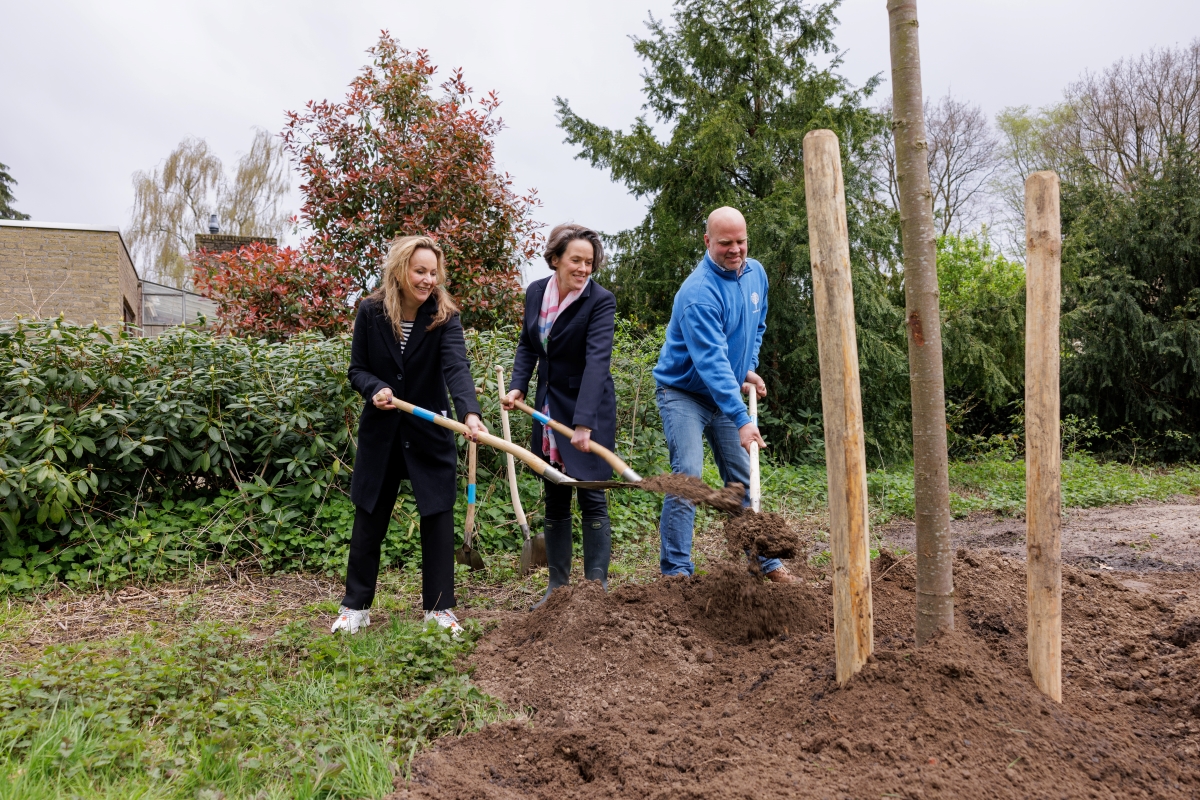
“Thanks to our collaboration with Trees for All, we contribute to the restoration of biodiversity and a more robust and attractive landscape, as well as to green and healthy surroundings in the Brainport Eindhoven region.”
– Marjolein de Hooge, Head Society & Community Engagement at ASML
We have lots of ideas for developing many more programmes for greening the Netherlands even further with trees. In 2025, for instance, we will start on greening industrial estates and the healthcare sector. If you are interested in contributing to one of our programmes as an organisation, please get in touch with us.
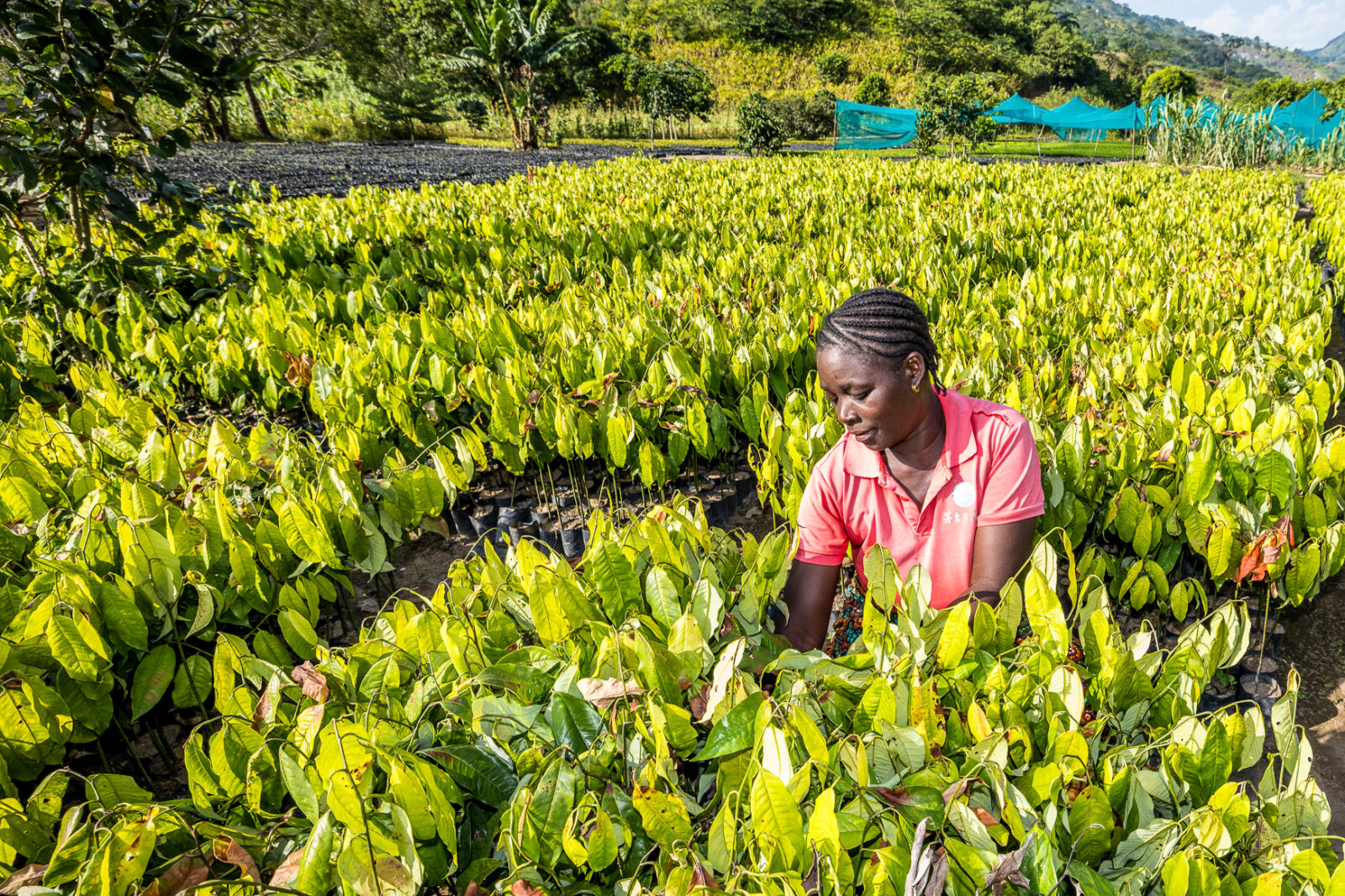
In 2024, we supported 19 projects in Europe, Asia, Africa and Latin America, ranging from reforestation and forest protection projects to the introduction of sustainable agriculture. Together with our partners and the local populations, we worked on creating not only more forest, but also a more sustainable landscape, more water and more food.
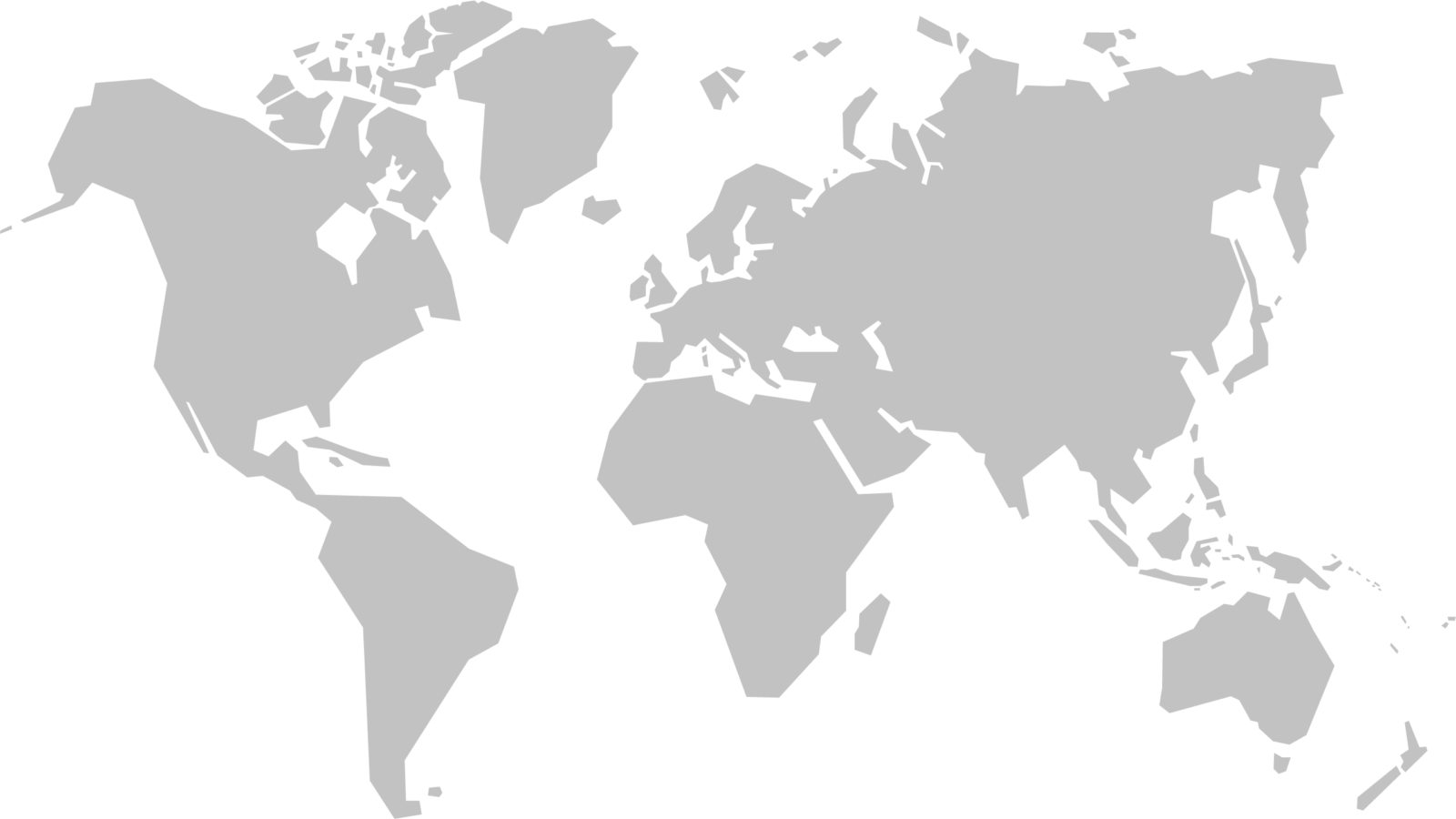
Planting 700 metres of hedgerows on school grounds, for more biodiversity and greener school surroundings.

Restoration of native landscape in Natural Park Sierra de Maria-Los Velez, in collaboration with AlVelAl.

Landscape restoration in the Faia Brava Reserve in order to regenerate lost nature, in collaboration with ATNatureza.

Expansion and reinforcement of existing forest for more biodiversity, in collaboration with Natuurpunt.

Transforming grassland into living forest, together with Limburgs Landschap Vlaanderen.

Reforestation and sustainable agroforestry in order to conserve the unique biodiversity, in collaboration with the PAMS Foundation and local communities.

Planting trees to increase food security, in collaboration with Climate Lab and local communities. It is crucial for this region, where drought and food shortages are the order of the day.

Agroforestry and restoration of floodplain forests in the Sahel, in collaboration with Tree Aid.

Restoration of original rainforest in Kibale National Park, in collaboration with Face the Future.

Restoration of the lowest lowland forests on West Madagascar, which occur nowhere else in the world, in collaboration with the Zazamalala Foundation.

In collaboration with our partner SENDAS and a local team, we are restoring parts of the mangrove forest along the coast. This is important for biodiversity and for the ecosystem as a whole!

Restoration of forest landscape in collaboration with SENDAS, local farmers and indigenous communities. By planting trees, we make the farmers’ land more sustainable and we improve water availability in the region.

In collaboration with AMBIO, we guide farmers in making the transition to agroforestry as an alternative to agriculture and livestock farming. In doing so, we reduce the necessity to fell new parts of the forest.

Planting a new tropical forest on former pastureland, in order to link up existing areas of rainforest, in collaboration with Adopt Rainforest Foundation and the local population.

In collaboration with Sicirec, we are supporting farmers in their transition to agroforestry: a sustainable alternative to traditional livestock farming and agriculture. Farmers plant crops like coffee and cacao between the trees.

A combination of reforestation and agroforestry in order to improve access to water, in collaboration with the Samay Foundation and local communities in the Andes Mountains.

Restoration of dune forest in collaboration with Unique and HUSTA, for better coastal protection and the preservation of endangered tree species.

In collaboration with the Masarang Foundation, we are transforming choking grasslands into native tropical rainforest, through an approach that has proven effective.

Restoration and protection of peat swamp forests, and thereby the habitat of endangered orang-utans, in collaboration with the Borneo Nature Foundation.

Planting 700 metres of hedgerows on school grounds, for more biodiversity and greener school surroundings.
Restoration of native landscape in Natural Park Sierra de Maria-Los Velez, in collaboration with AlVelAl.
Landscape restoration in the Faia Brava Reserve in order to regenerate lost nature, in collaboration with ATNatureza.
Expansion and reinforcement of existing forest for more biodiversity, in collaboration with Natuurpunt.
Transforming grassland into living forest, together with Limburgs Landschap Vlaanderen.
Reforestation and sustainable agroforestry in order to conserve the unique biodiversity, in collaboration with the PAMS Foundation and local communities.
Planting trees to increase food security, in collaboration with Climate Lab and local communities. It is crucial for this region, where drought and food shortages are the order of the day.
Agroforestry and restoration of floodplain forests in the Sahel, in collaboration with Tree Aid.
Restoration of original rainforest in Kibale National Park, in collaboration with Face the Future.
Restoration of the lowest lowland forests on West Madagascar, which occur nowhere else in the world, in collaboration with the Zazamalala Foundation.
In collaboration with our partner SENDAS and a local team, we are restoring parts of the mangrove forest along the coast. This is important for biodiversity and for the ecosystem as a whole!
Restoration of forest landscape in collaboration with SENDAS, local farmers and indigenous communities. By planting trees, we make the farmers’ land more sustainable and we improve water availability in the region.
In collaboration with AMBIO, we guide farmers in making the transition to agroforestry as an alternative to agriculture and livestock farming. In doing so, we reduce the necessity to fell new parts of the forest.
Planting a new tropical forest on former pastureland, in order to link up existing areas of rainforest, in collaboration with Adopt Rainforest Foundation and the local population.
In collaboration with Sicirec, we are supporting farmers in their transition to agroforestry: a sustainable alternative to traditional livestock farming and agriculture. Farmers plant crops like coffee and cacao between the trees.
A combination of reforestation and agroforestry in order to improve access to water, in collaboration with the Samay Foundation and local communities in the Andes Mountains.
Restoration of dune forest in collaboration with Unique and HUSTA, for better coastal protection and the preservation of endangered tree species.
In collaboration with the Masarang Foundation, we are transforming choking grasslands into native tropical rainforest, through an approach that has proven effective.
Restoration and protection of peat swamp forests, and thereby the habitat of endangered orang-utans, in collaboration with the Borneo Nature Foundation.
In Mexico (Los Tuxtlas), we worked with our partner SENDAS on restoring mangrove forests. Thanks to an enthusiastic team, the trees we planted are growing very well. And moreover, the employees are improving the water network, which is already stimulating the dispersal of mangrove seeds throughout the project area! It is very exciting that a manatee with young has been spotted in the project area again, after many years, which further underlines the importance of mangrove restoration for the local biodiversity. Photo: stock
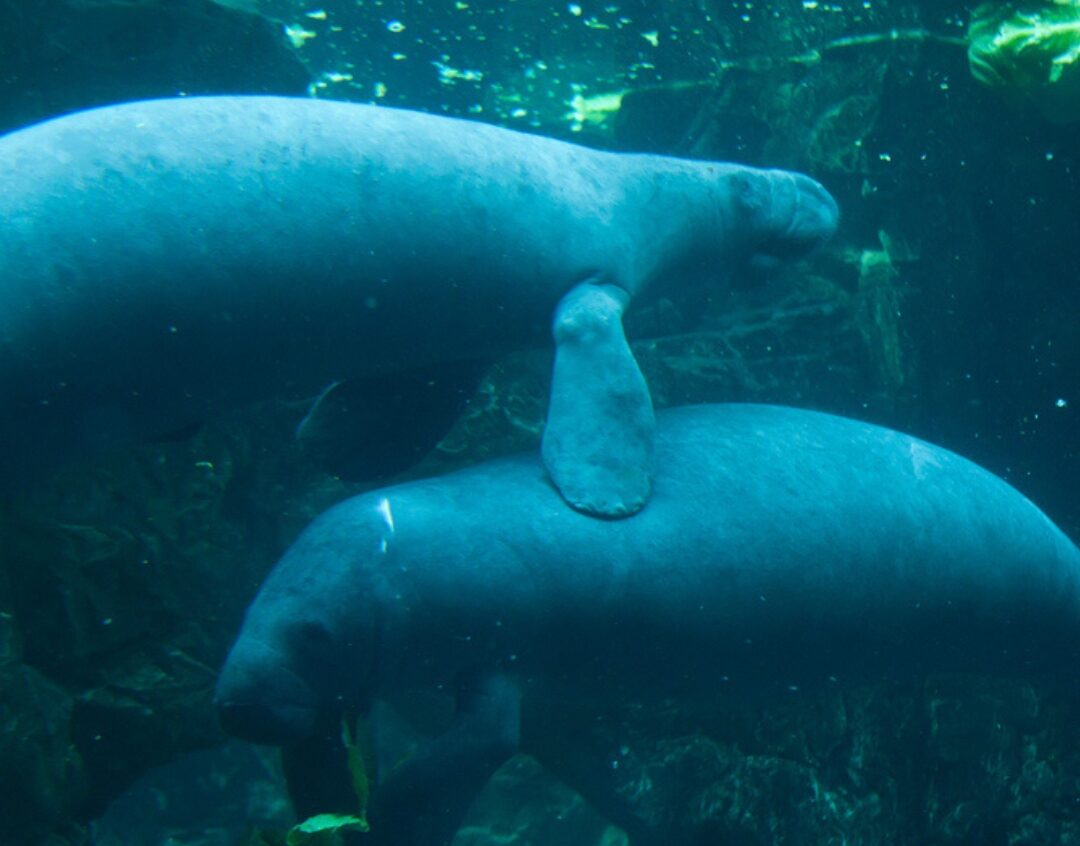
In Tanzania, we have started a project of our own, together with the PAMS Foundation. We are working on reforestation, sustainable agroforestry and forest protection in the Nguru Mountains. We planted the first trees last year and they are growing really well. We are now at an advanced stage of getting certification for the carbon sequestered in the project, in accordance with the Plan Vivo standard. When this has been finalised, our donors can also contribute to the project, and together we can restore and protect even more forests!
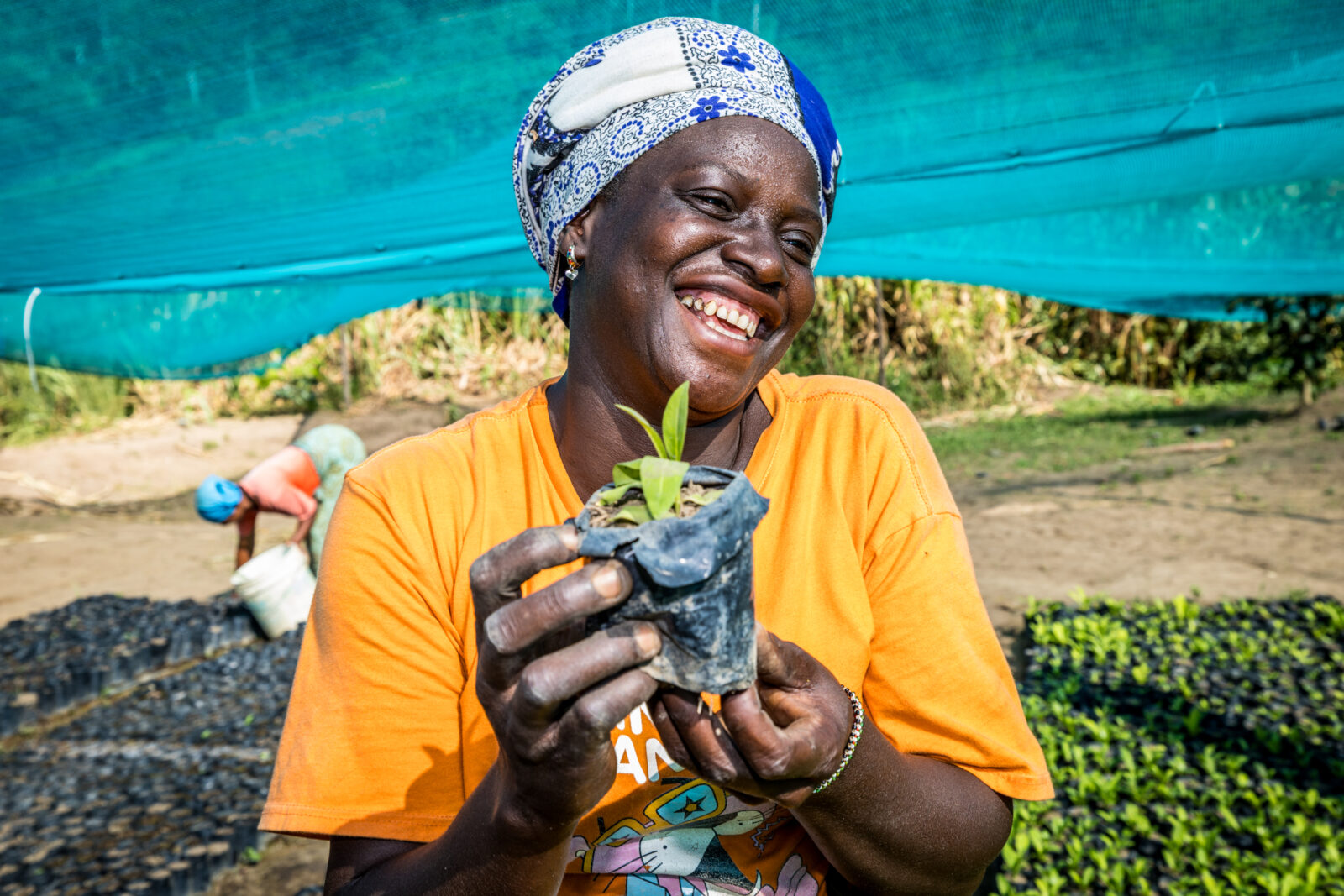
When the rains fell in Bolivia after a dry period, we could continue planting trees in the Andes Mountains, which we are doing in partnership with the Samay Foundation in order to improve the availability of water. And it’s working! The planting is boosting the absorption of water and the speed at which water flows through the area. In the coming years, we will see an even greater effect on the water balance, which is currently being recorded in detail by our partner Biogrowth.
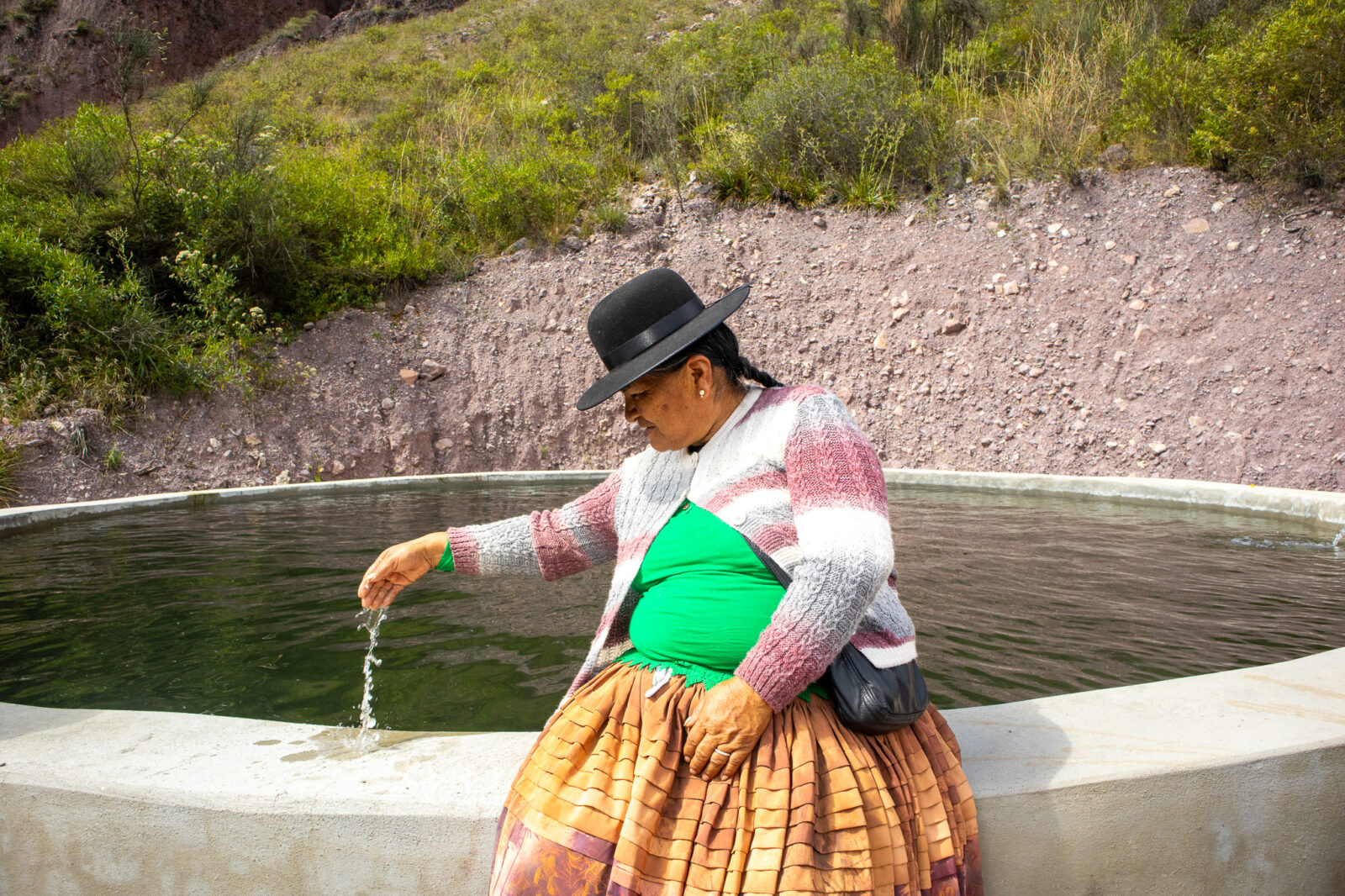
In Portugal, we continued our work with ATNatureza on landscape restoration in the rocky Faia Brava Reserve. Very little of the nature that has disappeared here can recover on its own. So we have replanted 8,000 trees that are native to the area, such as holm oaks and cork oaks. In addition, ATNatureza is constantly testing new planting techniques, like planting acorns between the rocks, in order to also restore nature in places that are difficult to reach. We are proud to be working with partners like these, who are continually innovating in order to make a success of a project.
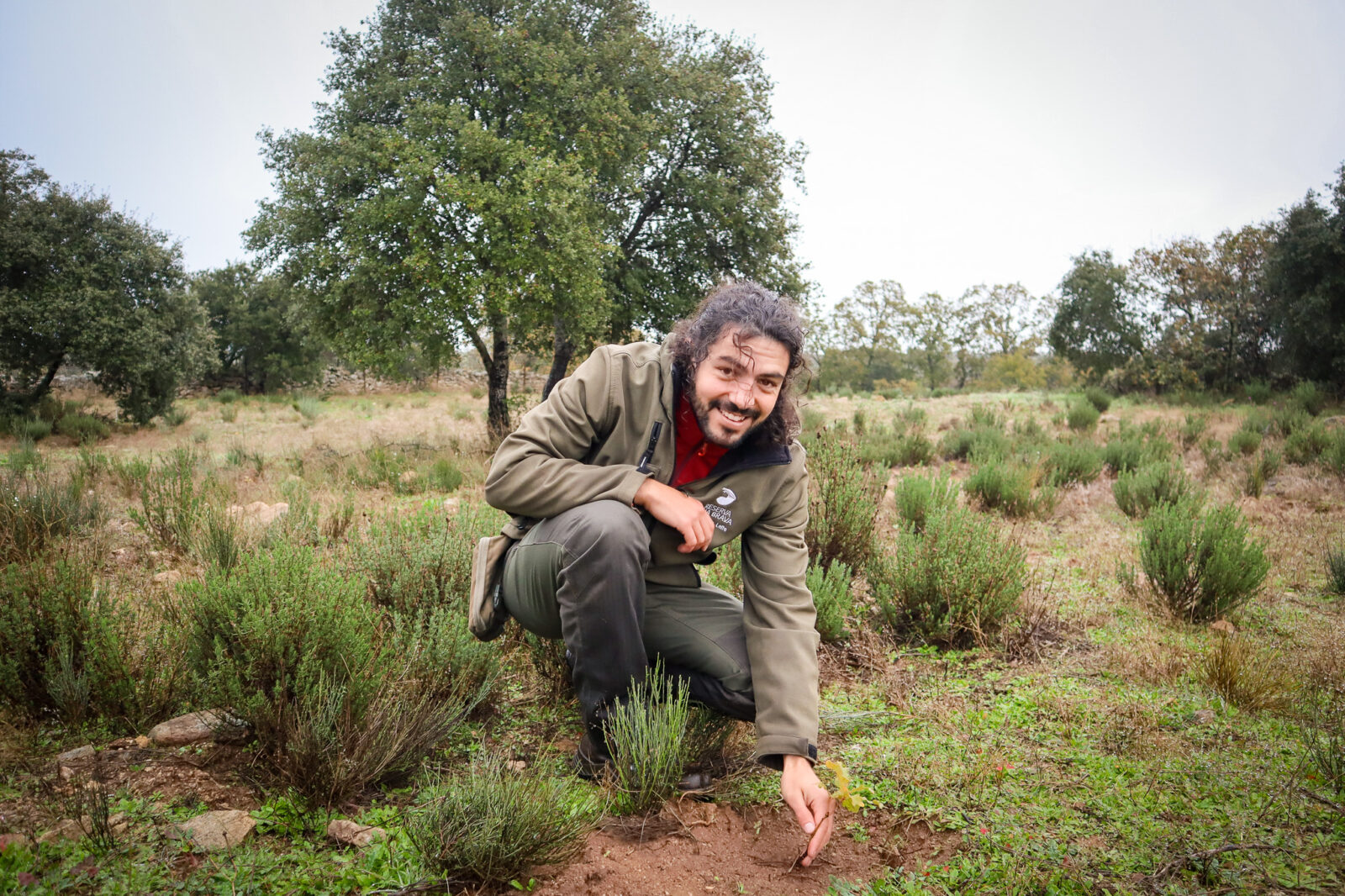
In Vietnam we continued the restoration of dune forests along the coast, along with our partners Unique and HUSTA. By restoring lost forests, we are protecting the coastal region against sand storms and flooding, as well as preventing the permanent loss of unique tree species. Even better, we have replanted a tree species that scientists believed to be already extinct! In the coming year, we will continue this replanting, so that the Lithocarpus concentricus – and many other unique species – will grow in large numbers again in the area!
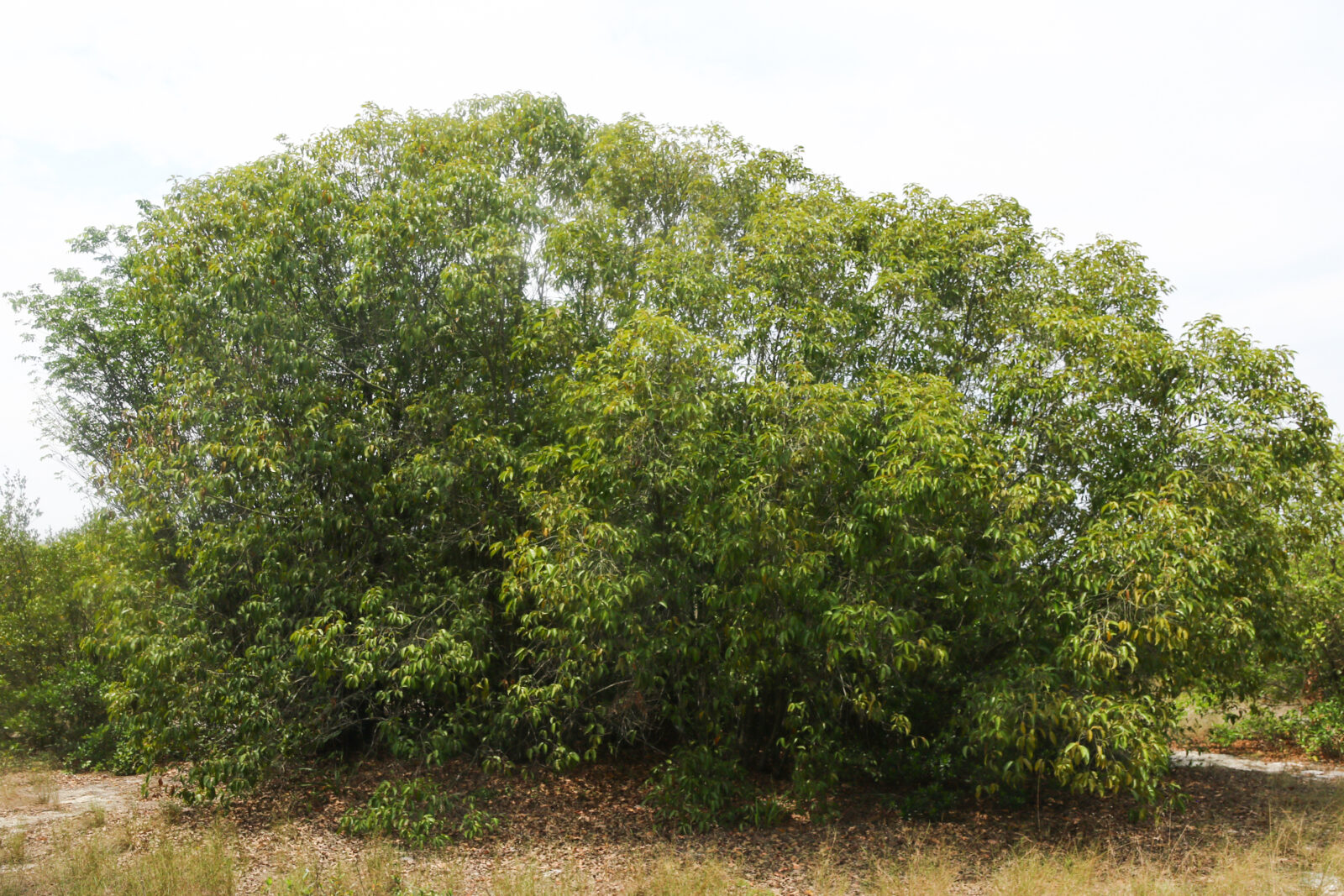
In Ethiopia, we supported a new project in the region of Tigray. Along with our partner Climate Lab, we are helping farming families in their transition to agroforestry. Farmers plant a combination of trees and food crops, thus contributing to greater food security. This is crucial in a region where drought and food shortages are the order of the day. The transition to agroforestry makes the local population less dependent on imports and more resistant to the consequences of climate change.
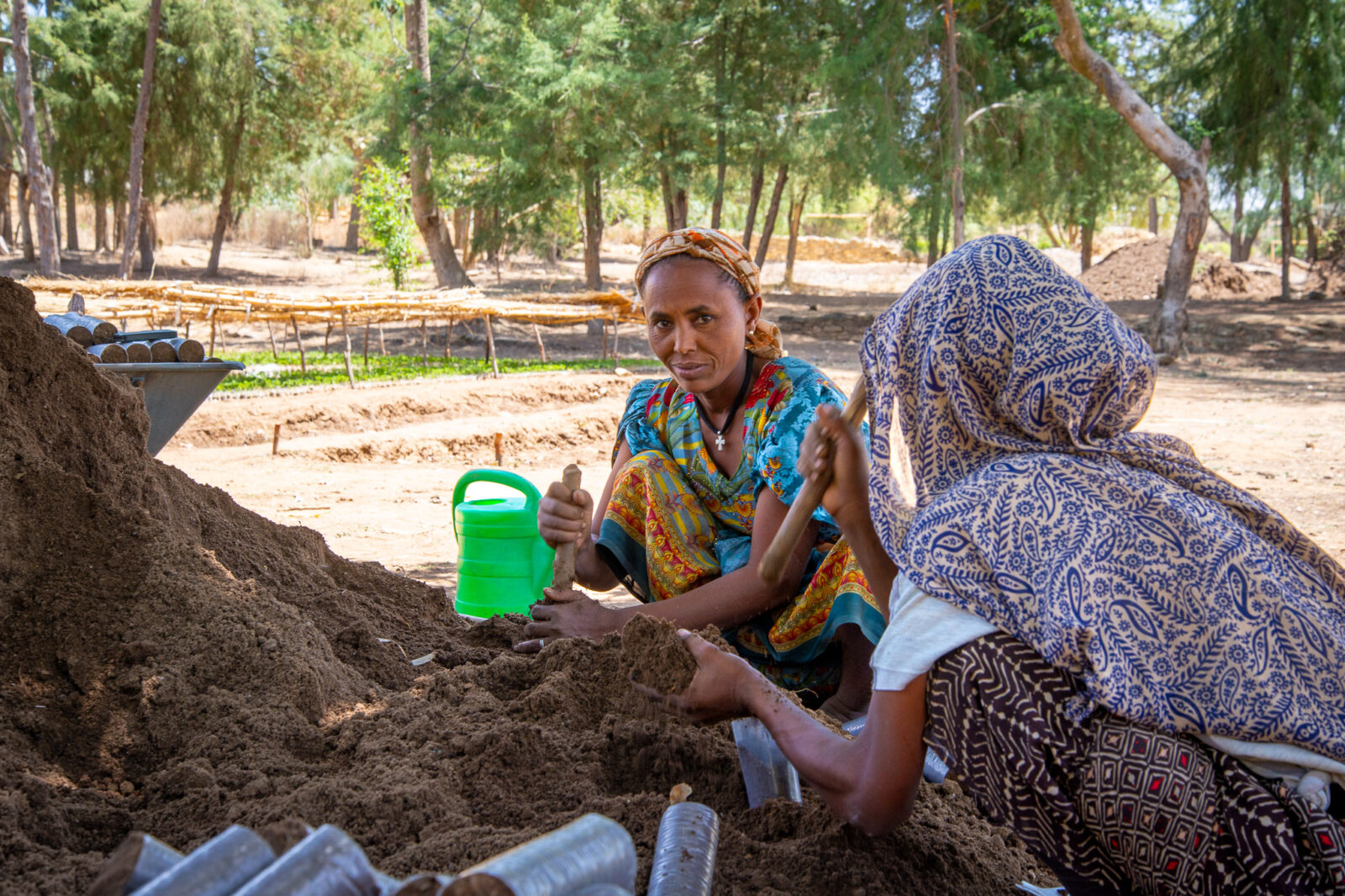
In Mexico (Los Tuxtlas), we worked with our partner SENDAS on restoring mangrove forests. Thanks to an enthusiastic team, the trees we planted are growing very well. And moreover, the employees are improving the water network, which is already stimulating the dispersal of mangrove seeds throughout the project area! It is very exciting that a manatee with young has been spotted in the project area again, after many years, which further underlines the importance of mangrove restoration for the local biodiversity. Photo: stock

In Tanzania, we have started a project of our own, together with the PAMS Foundation. We are working on reforestation, sustainable agroforestry and forest protection in the Nguru Mountains. We planted the first trees last year and they are growing really well. We are now at an advanced stage of getting certification for the carbon sequestered in the project, in accordance with the Plan Vivo standard. When this has been finalised, our donors can also contribute to the project, and together we can restore and protect even more forests!

When the rains fell in Bolivia after a dry period, we could continue planting trees in the Andes Mountains, which we are doing in partnership with the Samay Foundation in order to improve the availability of water. And it’s working! The planting is boosting the absorption of water and the speed at which water flows through the area. In the coming years, we will see an even greater effect on the water balance, which is currently being recorded in detail by our partner Biogrowth.

In Portugal, we continued our work with ATNatureza on landscape restoration in the rocky Faia Brava Reserve. Very little of the nature that has disappeared here can recover on its own. So we have replanted 8,000 trees that are native to the area, such as holm oaks and cork oaks. In addition, ATNatureza is constantly testing new planting techniques, like planting acorns between the rocks, in order to also restore nature in places that are difficult to reach. We are proud to be working with partners like these, who are continually innovating in order to make a success of a project.

In Vietnam we continued the restoration of dune forests along the coast, along with our partners Unique and HUSTA. By restoring lost forests, we are protecting the coastal region against sand storms and flooding, as well as preventing the permanent loss of unique tree species. Even better, we have replanted a tree species that scientists believed to be already extinct! In the coming year, we will continue this replanting, so that the Lithocarpus concentricus – and many other unique species – will grow in large numbers again in the area!

In Ethiopia, we supported a new project in the region of Tigray. Along with our partner Climate Lab, we are helping farming families in their transition to agroforestry. Farmers plant a combination of trees and food crops, thus contributing to greater food security. This is crucial in a region where drought and food shortages are the order of the day. The transition to agroforestry makes the local population less dependent on imports and more resistant to the consequences of climate change.

Planting trees may sound simple, but there is a lot involved, particularly beyond our own borders. Each country and each region is different with regard to its climate, landscape, biodiversity and socio-economic conditions. So in order to successfully plant trees and restore forests, our approach needs to be thoroughly customised.
We therefore work with local project partners all over the world, who know the region and the context well. Not only do they manage the land, but they also have good connections with local authorities, relevant organisations and the local population. This is essential to the success of an international project.
Along with our partners, we have facilitated all sorts of tree planting and reforestation projects. For instance, we contributed to restoring mangrove forests in Mexico, tropical rainforests in Indonesia and Costa Rica, peat swamp forests on Borneo, dune forests in Vietnam and lowland forests on Madagascar.
We also supported agroforestry projects, whereby farmers plant a combination of trees and crops to produce food and generate income. We did so, for example, in Bolivia, Ghana, Mexico, Tanzania and Ethiopia.
Agroforestry is a sustainable alternative to traditional forms of agriculture and livestock farming, which lead to the loss of many forests worldwide. By helping people embark on agroforestry, we remove one of the main motives for deforestation, whilst also improving people’s income and food supplies.
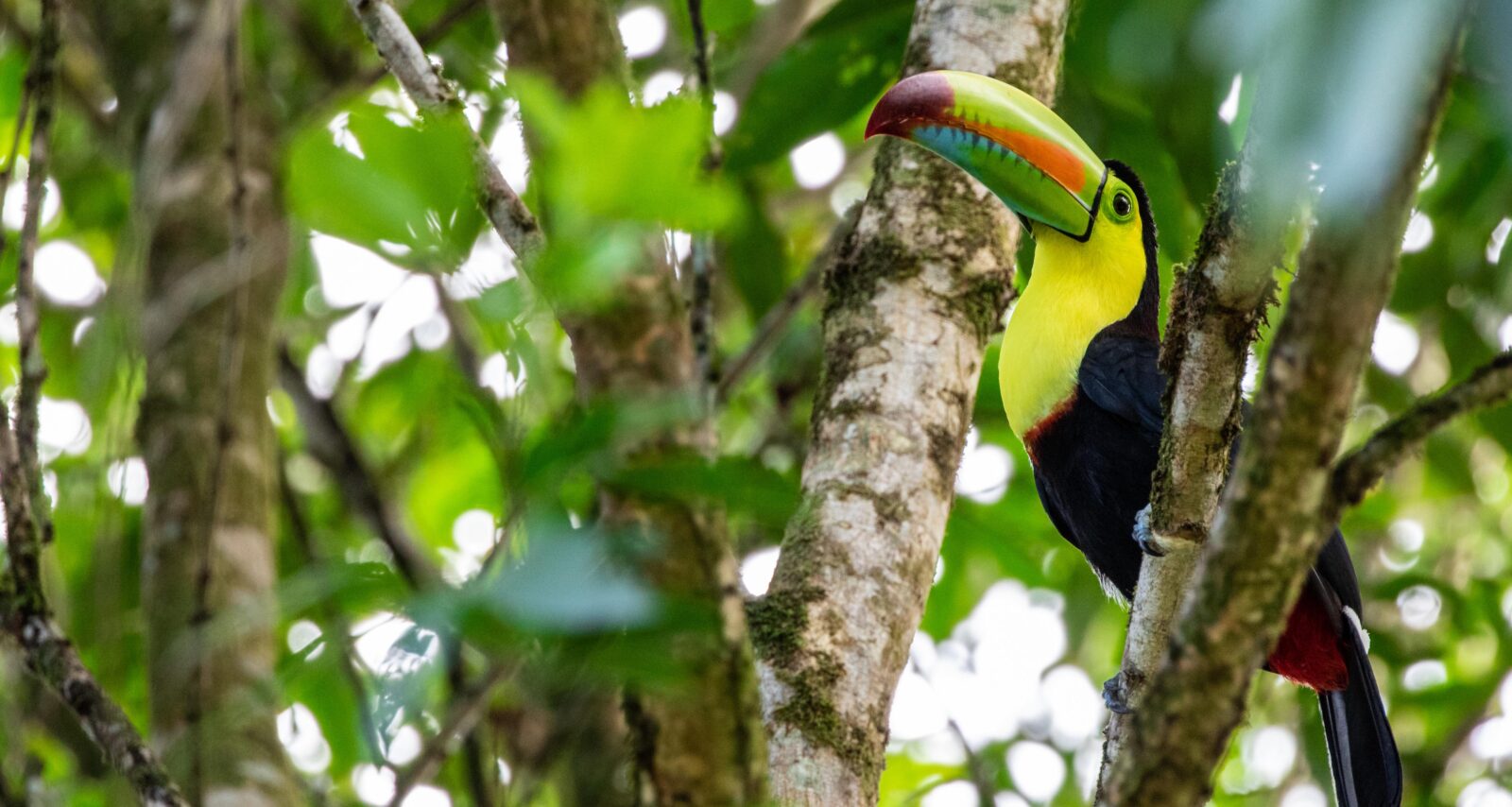
We take an integral approach to all these different projects, meaning that we look at the total package of a project. Along with our partners, we make a detailed analysis of what is needed to successfully develop the trees into a mature forest. This might include setting up local nurseries, irrigating and protecting the trees, providing training in forest management or agroforestry, fire prevention and long-term monitoring.
An integral approach also means that the trees have added value not only for the climate and biodiversity, but also for the local population. For example, they improve the availability of water or food, or generate income in another way. This economic value contributes to the involvement and motivation of local communities to protect and maintain the forest both now and in the future.
Managing and maintaining the planting are fundamental principles in our way of working. Throughout the year, our partners keep us informed on progress and make adjustments where necessary. For instance, a prolonged period of drought in Latin America and Asia meant we had to postpone planting until the first rains came – which did eventually happen, fortunately.
Sometimes, it was also necessary to take additional measures to give the trees a good start. These included extra irrigation, creating firebreaks or adjusting the planting method. In doing so, it is a huge bonus to be able to work with flexible project partners, who have great knowledge and expertise, and can act quickly. It helps us to improve the planting where necessary and to apply increasingly effective planting methods. This is something we continue to do in the long term, in order to make a success of the projects!
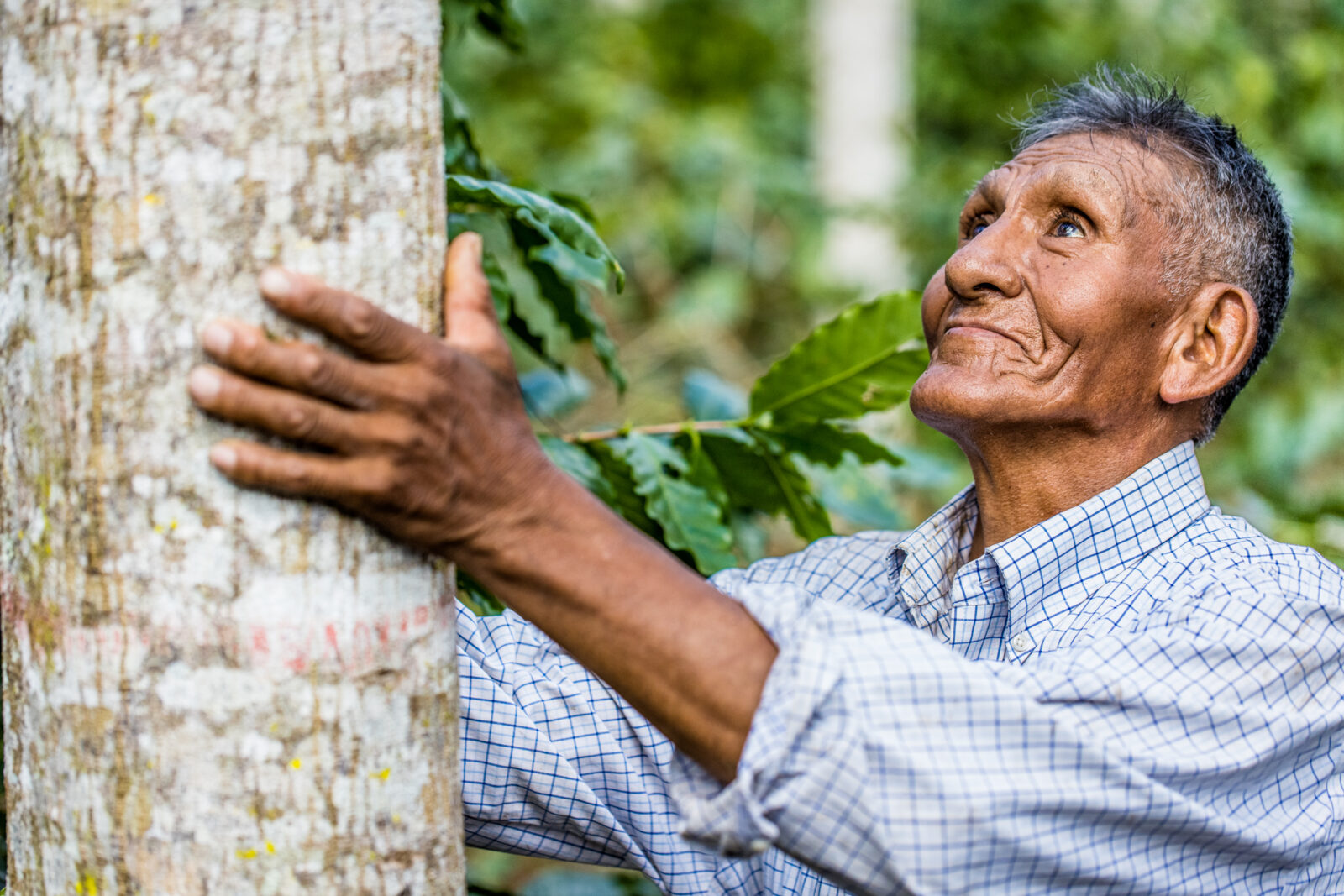
In 2024, we collaborated with the following international project partners:
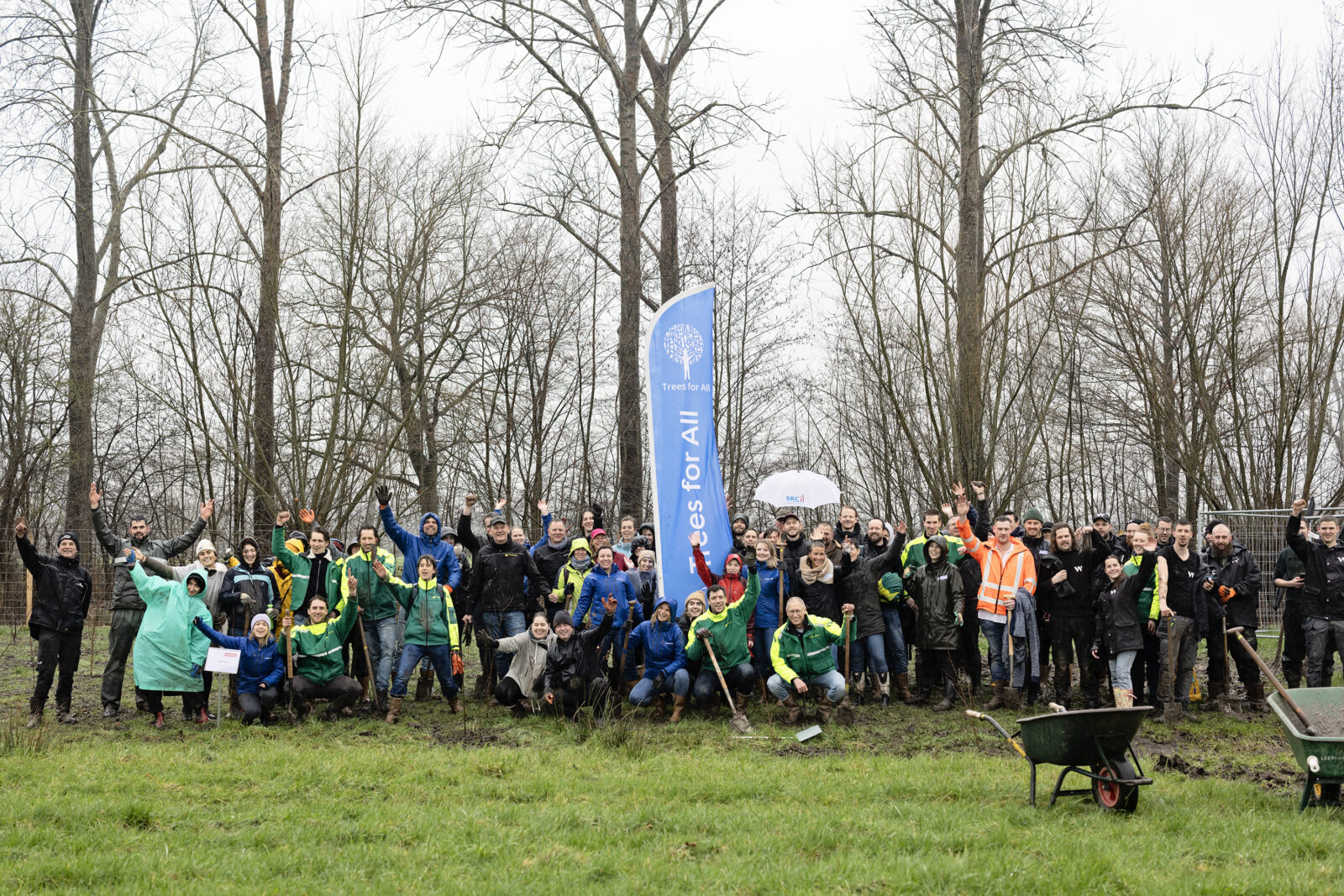
In 2024, we again received support from every corner of society. Whether businesses or private individuals, we are grateful to our dedicated supporters, whose contributions allow us to plant more trees worldwide and to raise more people’s awareness of the importance of trees.
![]()
private and business donors contributed in 2024 to our mission. Thanks everyone!

Euro total income in 2024

Euro from 2,156 businesses and organisations
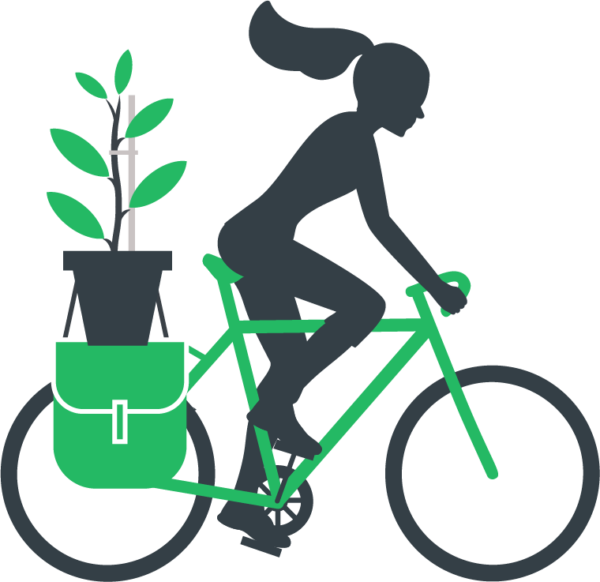
Euro from 17,202 private donors
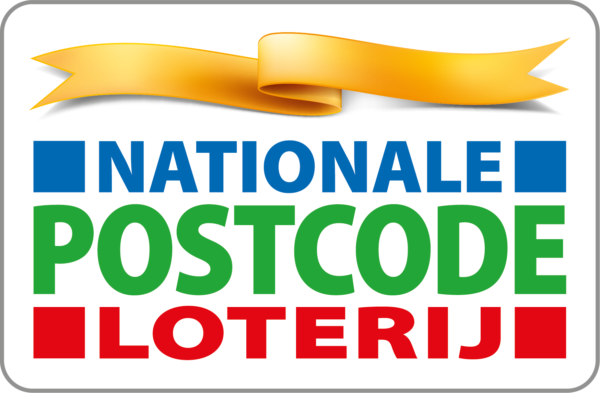
Euro from the Nationale Postcode Loterij, part of an one-off donation of 1 million Euros for three years

of each Euro spent on our objectives
In 2024, we organised 28 tree planting days throughout the Netherlands!
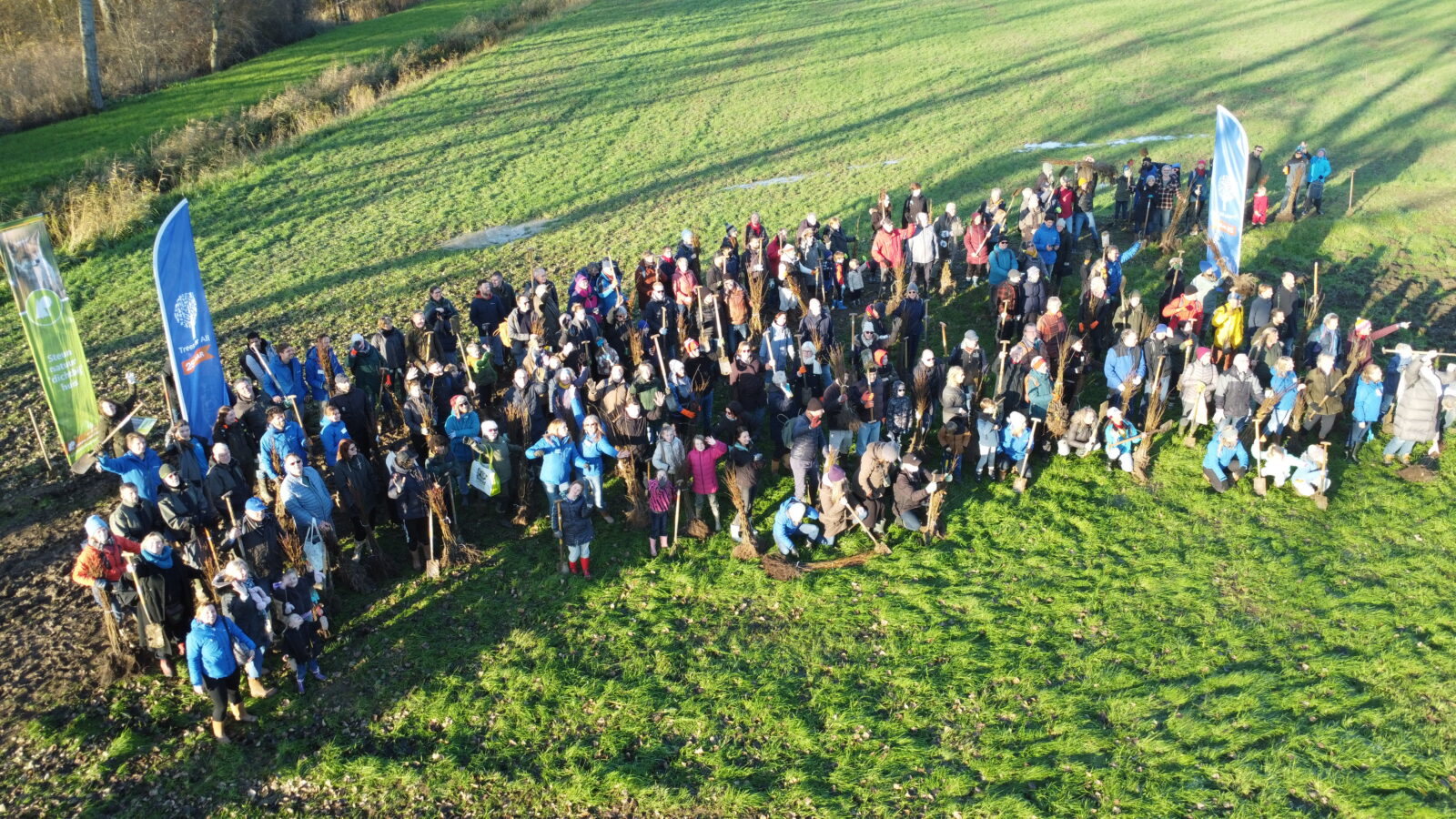
At least 400 private donors planted with us.
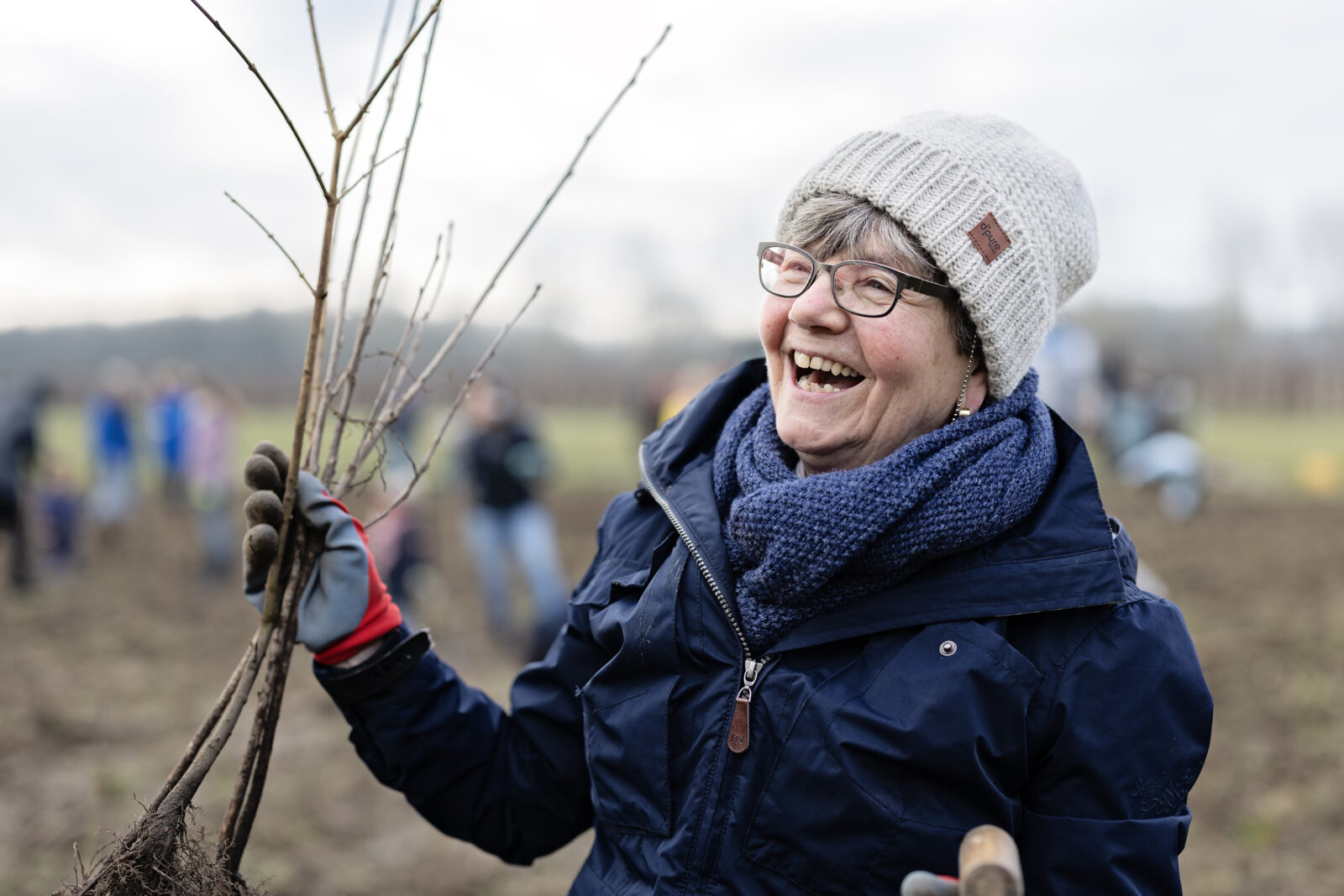
In 2024, we organised 28 tree planting days throughout the Netherlands!

At least 400 private donors planted with us.

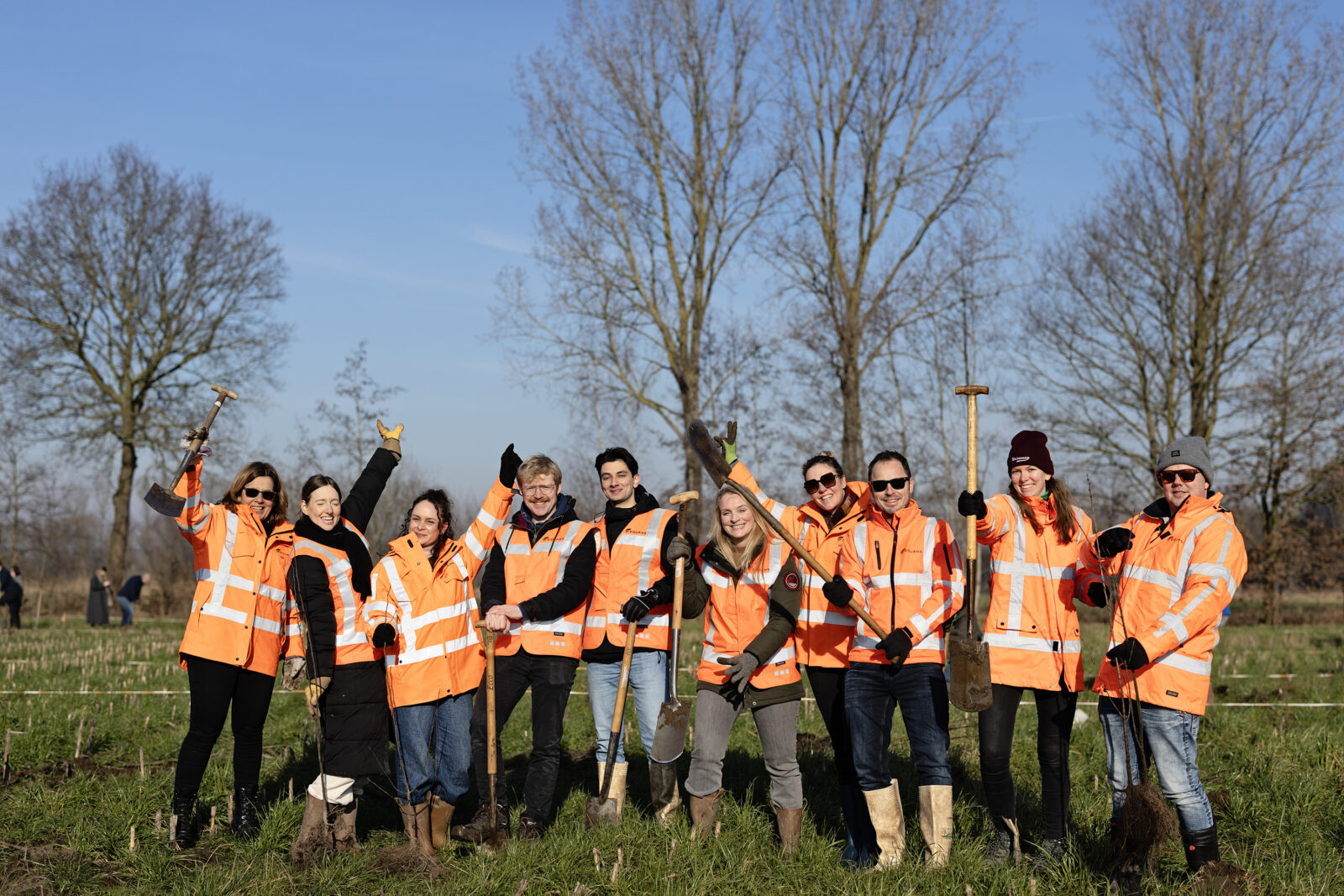
And more than 100 different organisations came to our tree planting days with their customers, employees or associates.
In total, more than 1,500 people joined us and rolled up their sleeves!
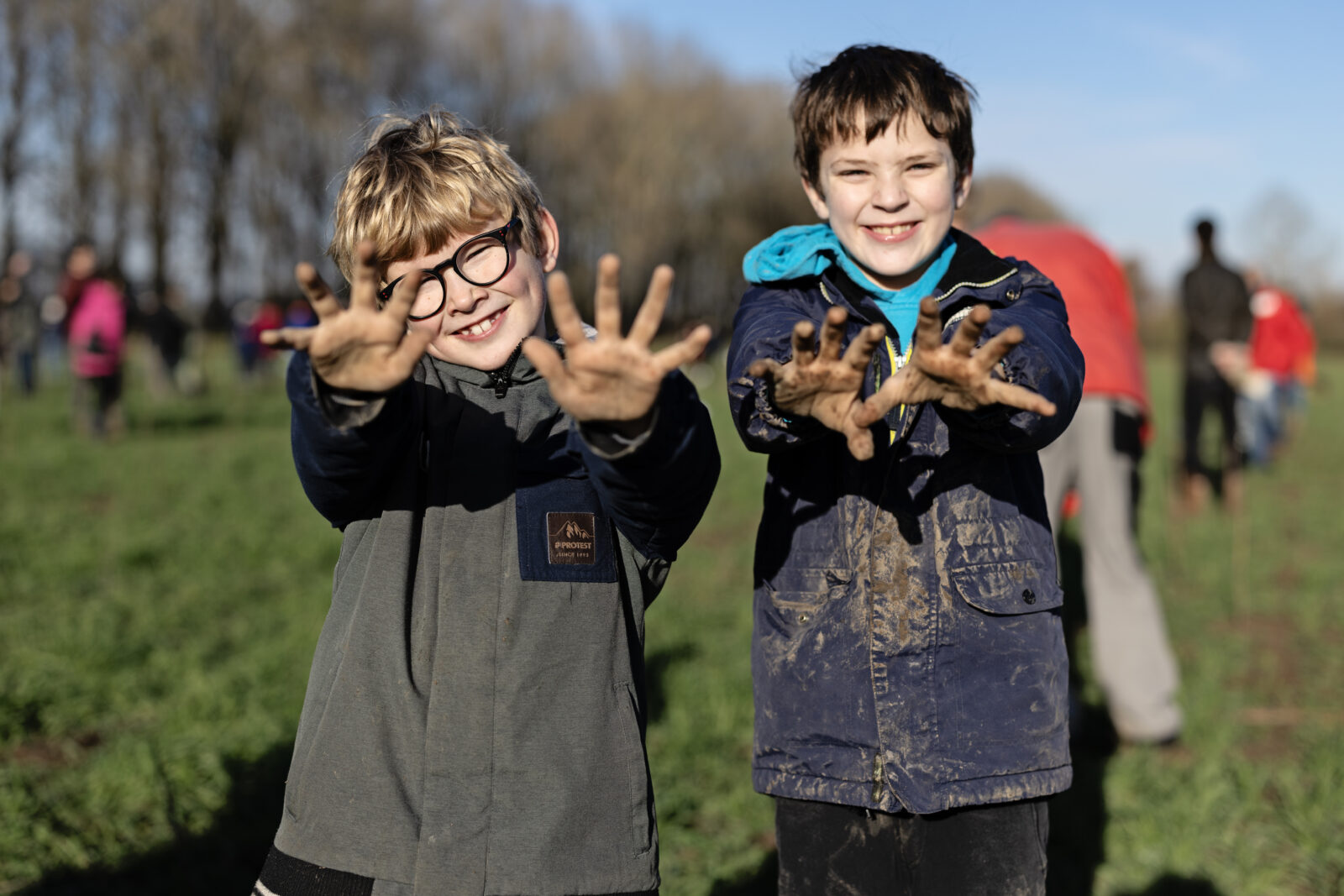
We are incredibly grateful for this support that allows us to fulfil our mission.

In total, more than 1,500 people joined us and rolled up their sleeves!

We are incredibly grateful for this support that allows us to fulfil our mission.

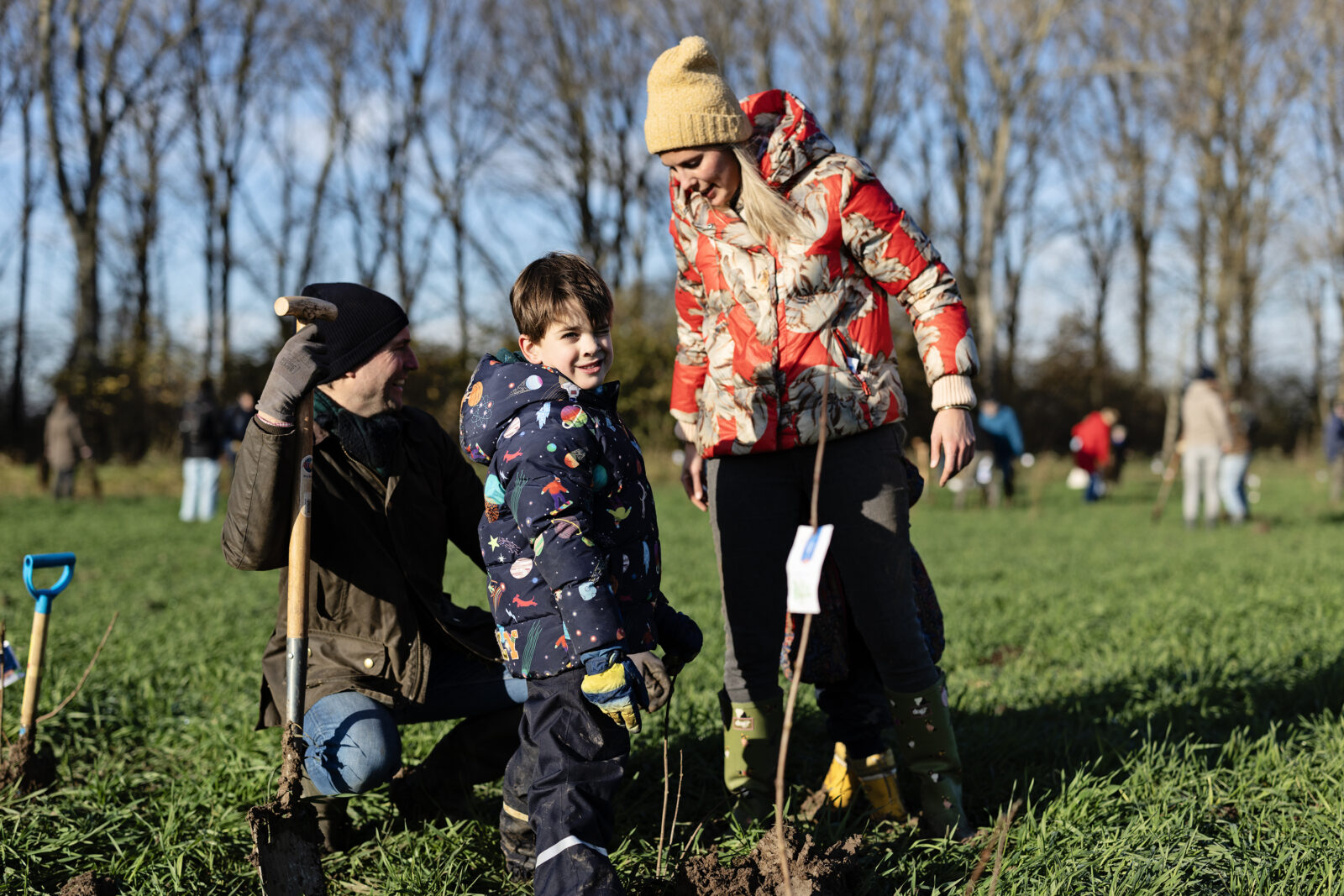
Together, we can plant more trees worldwide and make future generations more aware of the importance of trees!
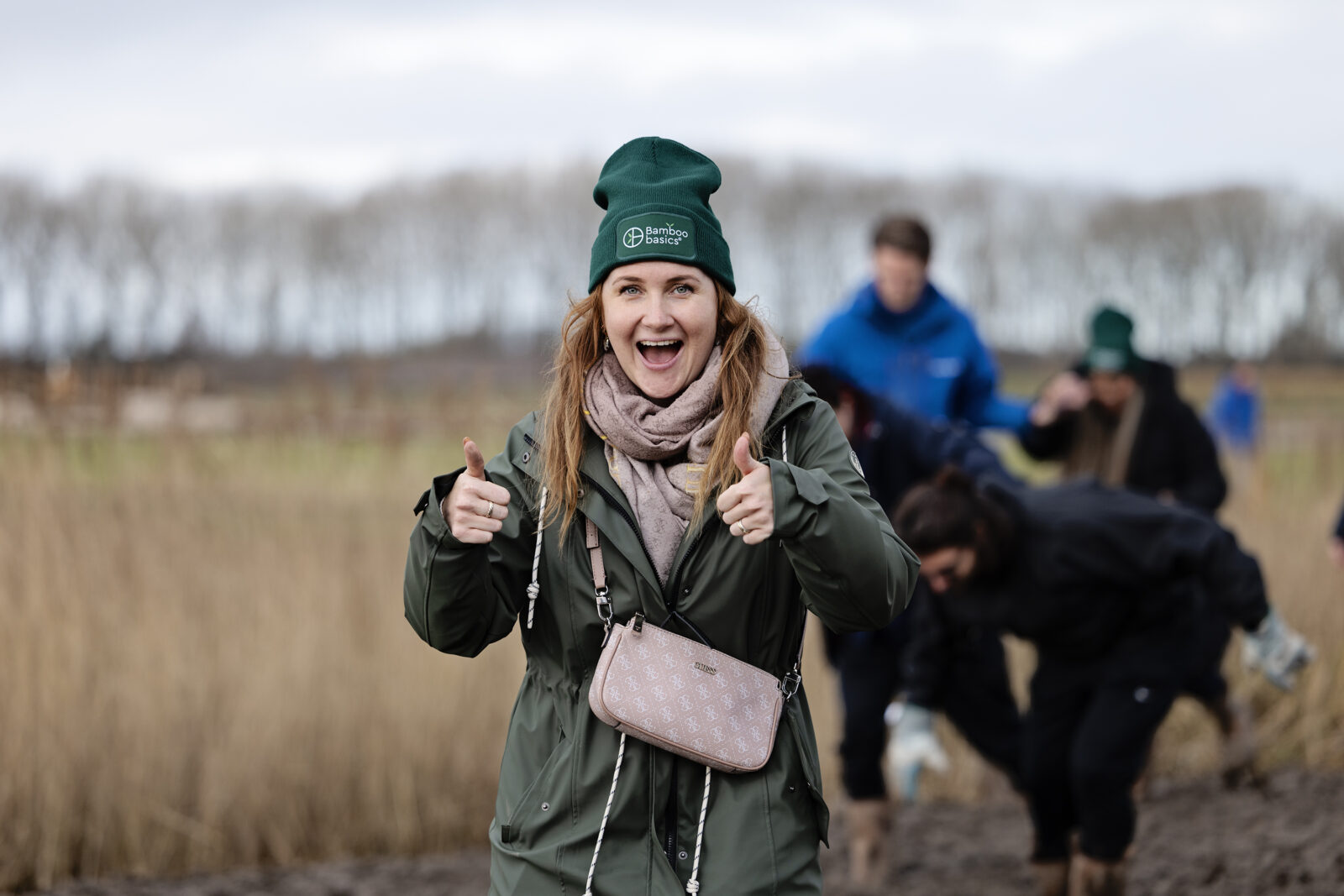

In 2024, we received support from 2,156 businesses and organisations: from big corporate organisations to self-employed people. So let’s take a look at these partnerships for creating more forests in the world?
For businesses, a partnership with Trees for All is a concrete way of implementing their sustainability plans. So we enjoy working with organisations that are intrinsically motivated to make their business operations more sustainable and see planting trees as one of the ways to do so.
In recent years, we have built up a firm support base of corporate partners. Some organisations make a one-off contribution to our work, although we prefer to enter into long-term partnerships wherever possible.
In 2024, once again we could count on contributions from our long-term corporate partners, including Accenture, ANWB, Arla Foods, Arriva, ASML, ASN Bank, a.s.r., A. Vogel, Baker Tilly, Boekenbalie, BEAT Cycling, Brute Bonen, Conclusion, Crisp, Dille & Kamille, Dura Vermeer, Equans, Gemeente Amsterdam, Kathmandu, Hotels for Trees, Innocent Drinks, Jaarbeurs, La Trappe, Lowlander, Sogeti, Synchroon en Vandebron.
We are incredibly grateful for this support from every corner of the business community!
While we could count on this broad support, the market around us changed. Businesses are becoming more alert – and rightly so – to the risk of greenwashing. The theme of carbon offsetting got a lot of negative publicity last year, whereby we saw a decrease in demand. We also saw more and more businesses turning their focus from carbon sequestration to carbon reduction.
We applaud this latter development wholeheartedly. It is not without reason that our motto is: first reduce your emissions, and then offset them. We do not see carbon sequestration as a goal in itself, but as a means to accelerating the transition to a more sustainable world. Moreover, it allows us to facilitate tree planting and reforestation projects that would otherwise never get off the ground.
So we sought – and are constantly seeking – new opportunities to respond to changing developments in the market and in the wishes of businesses. In 2025, for instance, we will be further developing our collaboration with Stichting Stimular, assisted by the Envirometer: this tool helps businesses calculate their footprint and gain insight into their reduction possibilities. In addition, they can then sequester their unavoidable emissions in our certified forestry projects.
Another development is the broadening of our collaboration with businesses. Our partner Conclusion, for example, has planted a corporate forest in North Brabant in recent years, offsetting the organisation’s unavoidable carbon emissions through us. This expert in business transformations and IT is now supporting us by making their expertise available: specialists help us to measure and gain insight into our impact on biodiversity.
We also have a special partnership with coffee roasters Brute Bonen, whereby the coffee beans from our project in Bolivia are now also available in the Netherlands. And our partner Accenture facilitated a Design Thinking session for us and our partners. The consultants also gave some guest lessons in our Trees for Schools programme. A valuable way of working together to achieve even more!
Various businesses contributed to the implementation of our greening programmes:
If you would like your company to contribute regularly to creating more forests in the world, there are various options for becoming a Trees for All partner.
As a corporate forest partner, you plant your own corporate forest in your name in the Netherlands. You donate a minimum amount of € 12,000, so that we can plant a total of 2,000 trees (half in the Netherlands and half in an international project of your choice). A great bonus is that in the Netherlands you – and your colleagues, clients or associates – can help to plant your own corporate forest!
As a landschapspartner, you support the greening of the Dutch countryside. You donate a minimum amount of € 12,000, so that we can plant 2,000 trees. Half of the trees will soon be growing in the countryside of the Netherlands and the other half in an international project of your choice. Landscape partners can also come and plant some of the trees in the Netherlands themselves.
If you are a smaller organisation, but would still like to contribute to more forests in the world, you can become a tree partner. You donate a minimum amount of €1,000 per year for three years. This allows us to plant at least 200 trees a year. For example, you can donate trees per product or service, or choose the form of partnership that suits you best.
If you are working on the structural reduction of your organisation’s carbon emissions, in addition you can offset the remaining emissions through carbon capture in one of our certified forestry projects. We ask all our CO2 partners to provide us with a reduction plan outlining how their organisation is contributing to reducing emissions. Of course, we would be happy to help you draw up this plan.
You might have another special reason for becoming a partner. For example, because you are celebrating a milestone or launching a unique sustainability campaign. Or you want to green your company in a tangible way. In that case, you can opt for a customised partnership. We would be happy to go through the options with you and ensure that together we can contribute to a world with more trees in it.
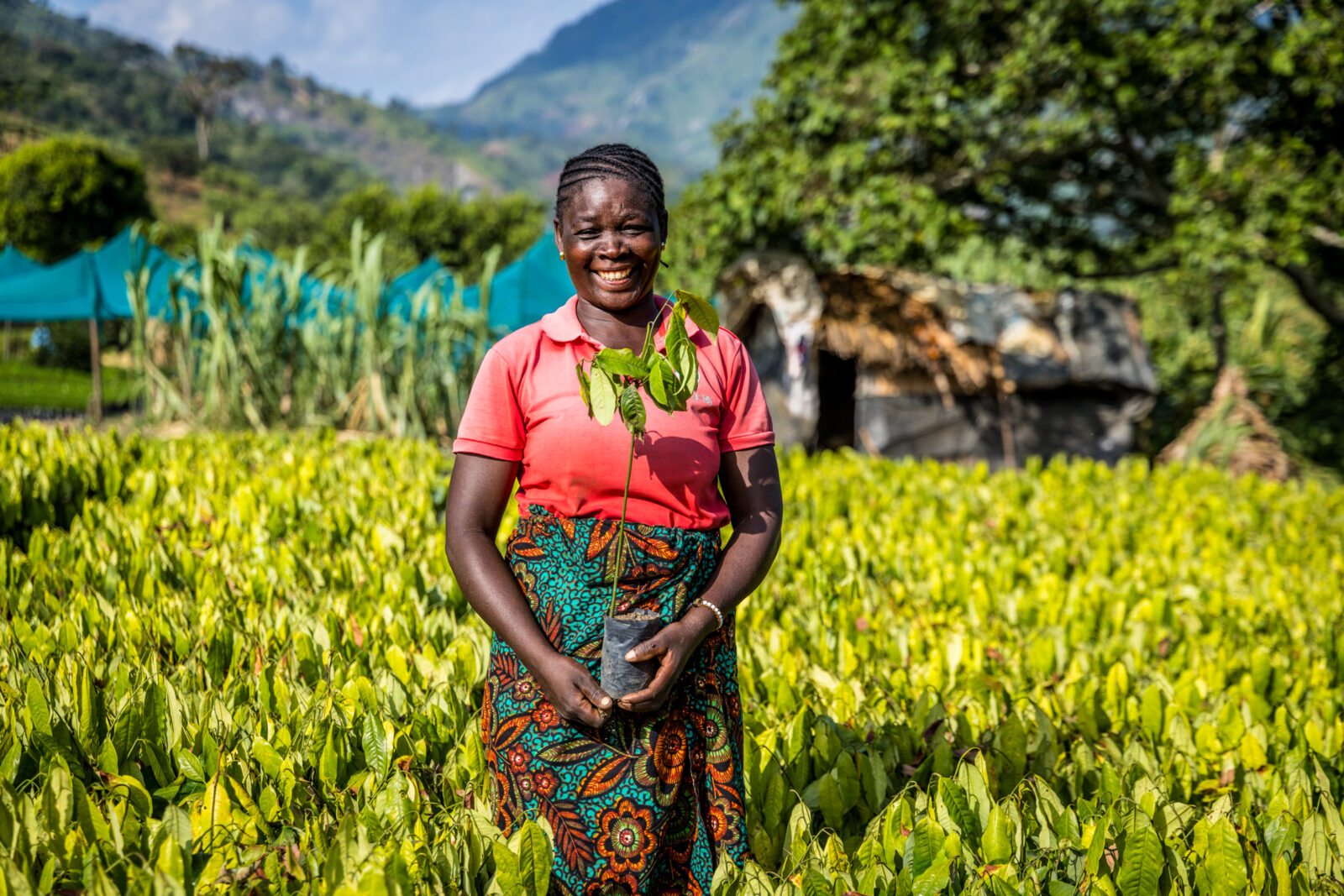
At the beginning of 2023, we received a donation of € 1 million from the National Postcode Lottery, for the period 2023-2025. Among other things, this has enabled us to make our Trees for Schools programme possible and to develop our own reforestation project in Tanzania. We would like to express our warmest thanks to the National Postcode Lottery and all its participants!
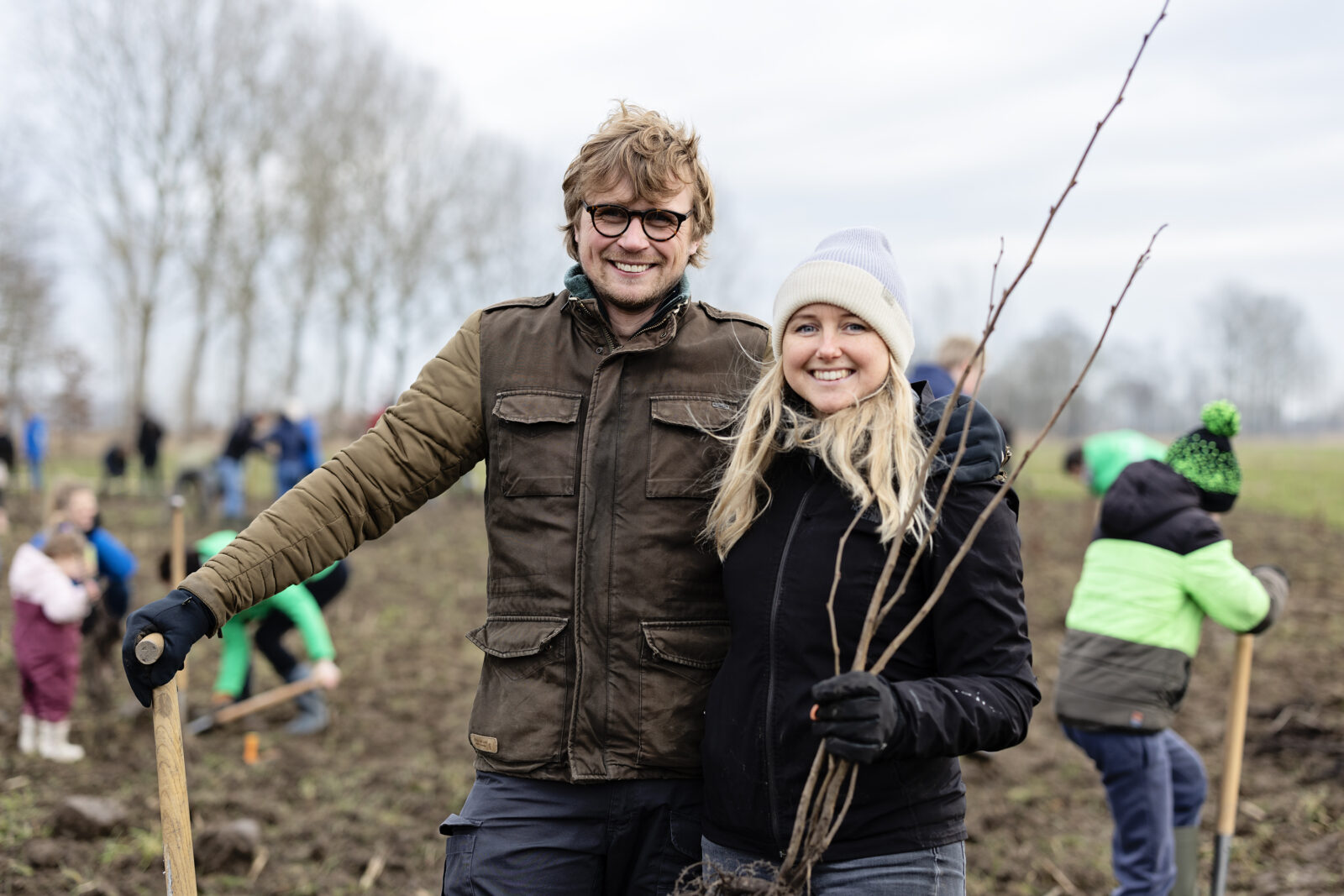
There is always a good reason to plant a tree. We see this time and time again, when we hear the special stories of the people who support our work. And in recent years, they gave that support in all sorts of ways.
Through our website, thousands of donors planted trees (regularly) in our forestry projects worldwide. Thanks to our Track & Trees e-mails, they could keep informed about the progress of their trees afterwards as well. In these e-mails, we give more information about our tree planting projects and the value they add to aspects like climate, biodiversity and people’s living conditions.

This year, too, many people surprised their loved ones with the most sustainable gift in the world: a tree. Through our website , it is possible to gift these trees digitally for every occasion: a birthday, a wedding or the birth of a child, or to say thank you or in memory of someone. Each recipient also gets a personalised certificate.

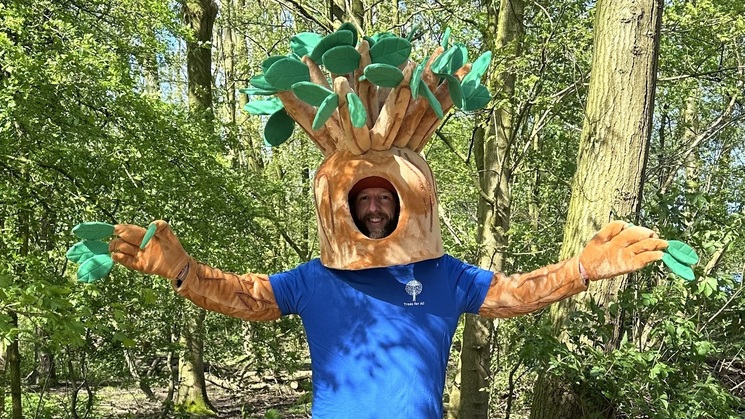
In April, an unusual runner appeared on the starting line of the marathon in Rotterdam. Herman Wooning, also known as the Running Tree Hunk, ran 42 kilometres in a tree suit, to raise money for Trees for All.
His fun campaign raised a total of 2,866 Euros: enough for 573 trees. An achievement that was well worth all the sweat!
Donors could use our online calculation tools (based on calculations by Milieu Centraal) to calculate their personal footprint, including things like flights, car journeys or energy consumption. After all, a more sustainable life begins with insight. They could then offset their emissions (in part) through our certified forestry projects.
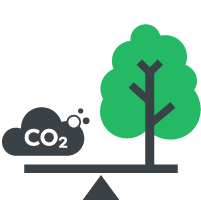
Through our campaign platform, hundreds of people started their own tree campaign. They asked for sponsorship in the form of tree donations, requested trees as a new baby gift or started a collection campaign for someone else. We give some inspiring examples below.

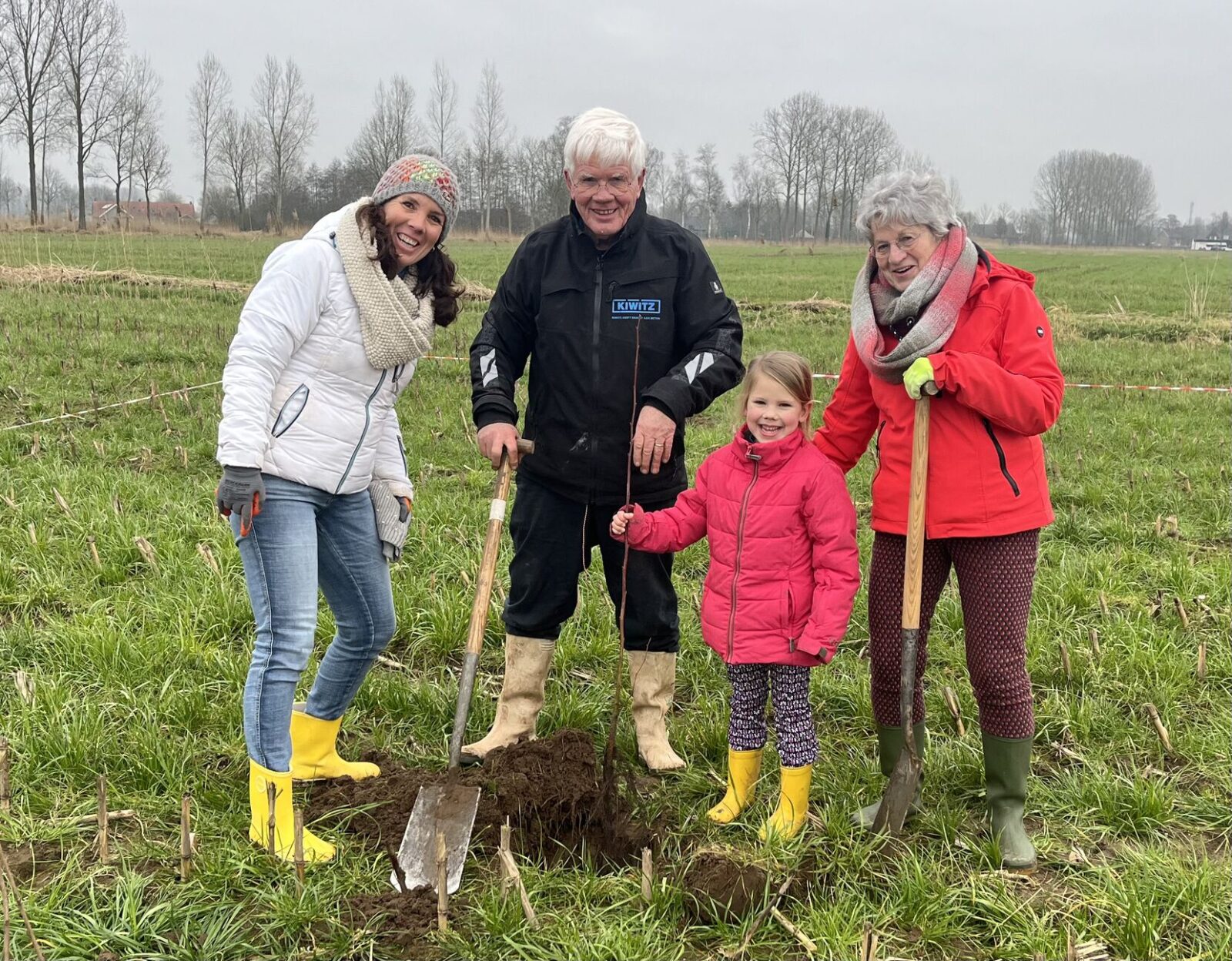
Planting a tree is a meaningful way of remembering a loved one. Cathelijne, for example, asked her circle of acquaintances to donate trees in memory of her deceased husband. “Richard was at his best in nature. It’s wonderful that we’ve now been able to plant more than 1,000 trees for him.”
Along with her parents and daughter, she put the first trees in the ground herself, during our tree planting day. It was a special and loving moment, as a lasting memorial to Richard.
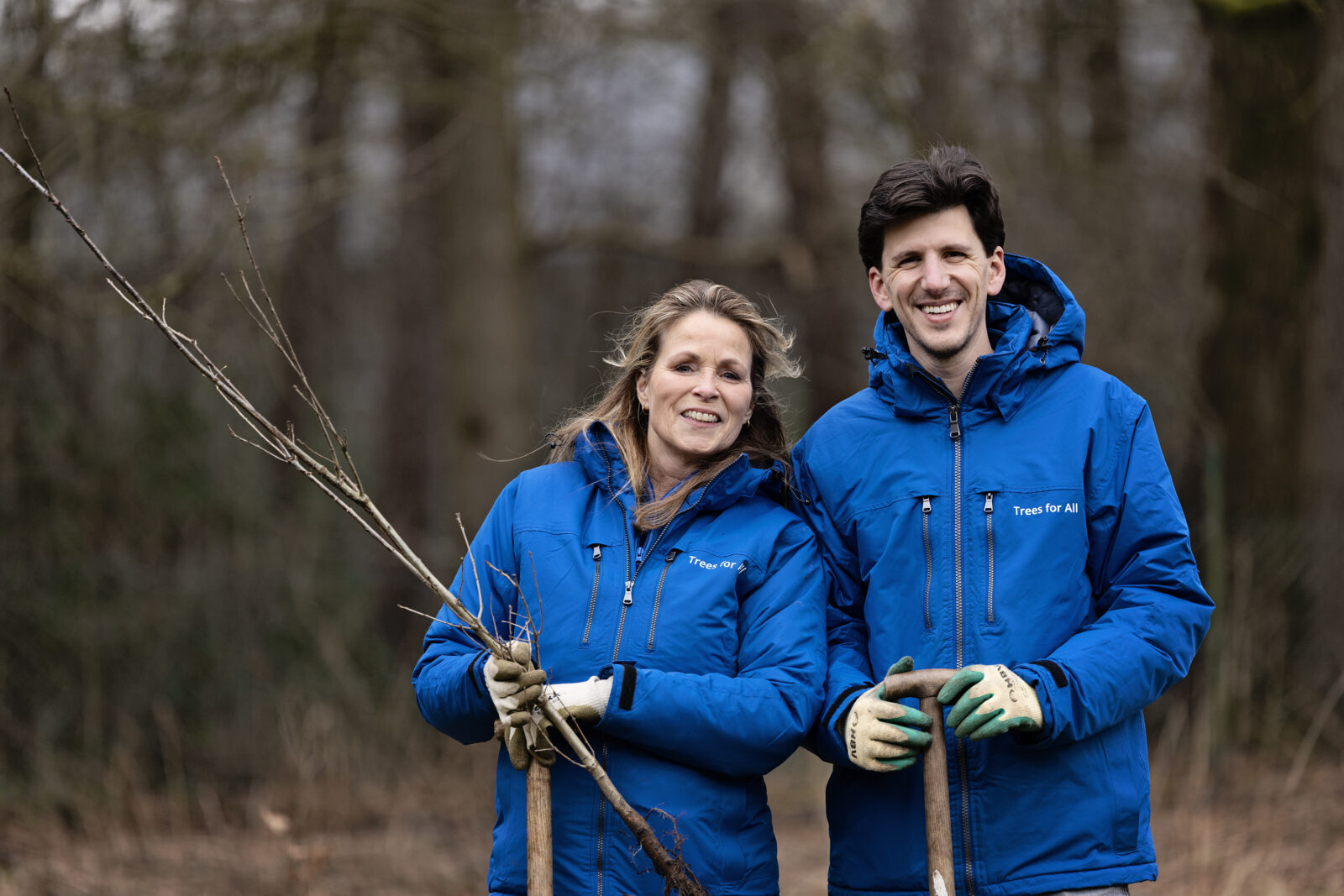
Finally, special thanks go to our private donors who supported us with a major donation last year. We are very grateful to them for this. Together, we carefully consider how and to which type of project we allocate this support. Truly tailored support, which we will continue in 2025 to make the world a greener place!
Most of the donations we receive are earmarked for planting trees in specific forestry projects. As a foundation, we are also dependent on general donations, which we use to start up new innovative projects, for example, or for the further professionalisation of our organisation. Then we can plant even more trees worldwide. If you would like to contribute to this, you can support us through a general donation.
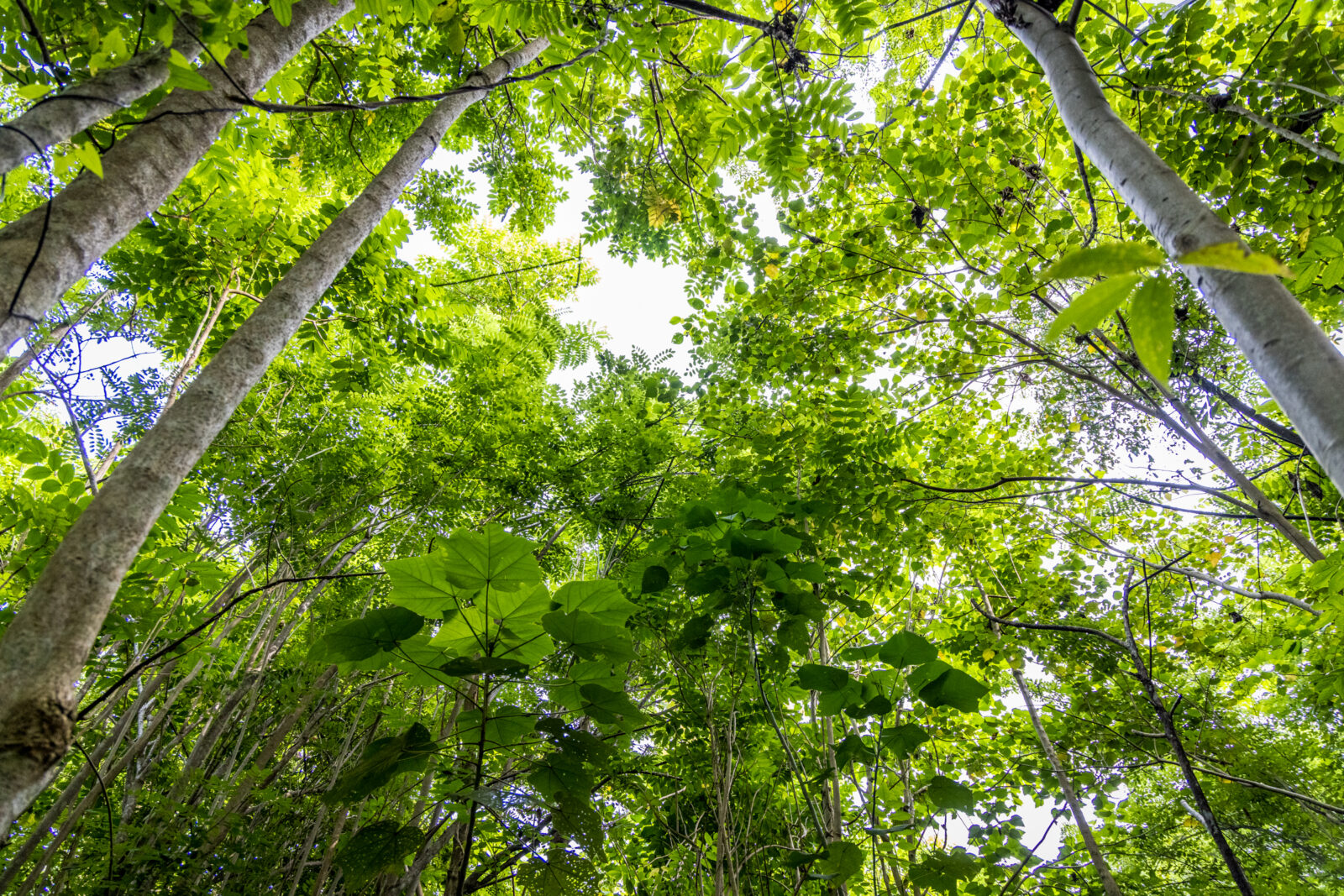
To involve as many people as possible in our work, we conduct campaigns for trees and forests throughout the year, both online and offline. In 2024, we campaigned as follows.
In order to plant as many trees as possible, we need as many people as possible. So we were visible all year round on the streets through our posters. We would like to thank our media partners ESH Media and ClearChannel for this visibility, which helps us to get more people involved in our mission.
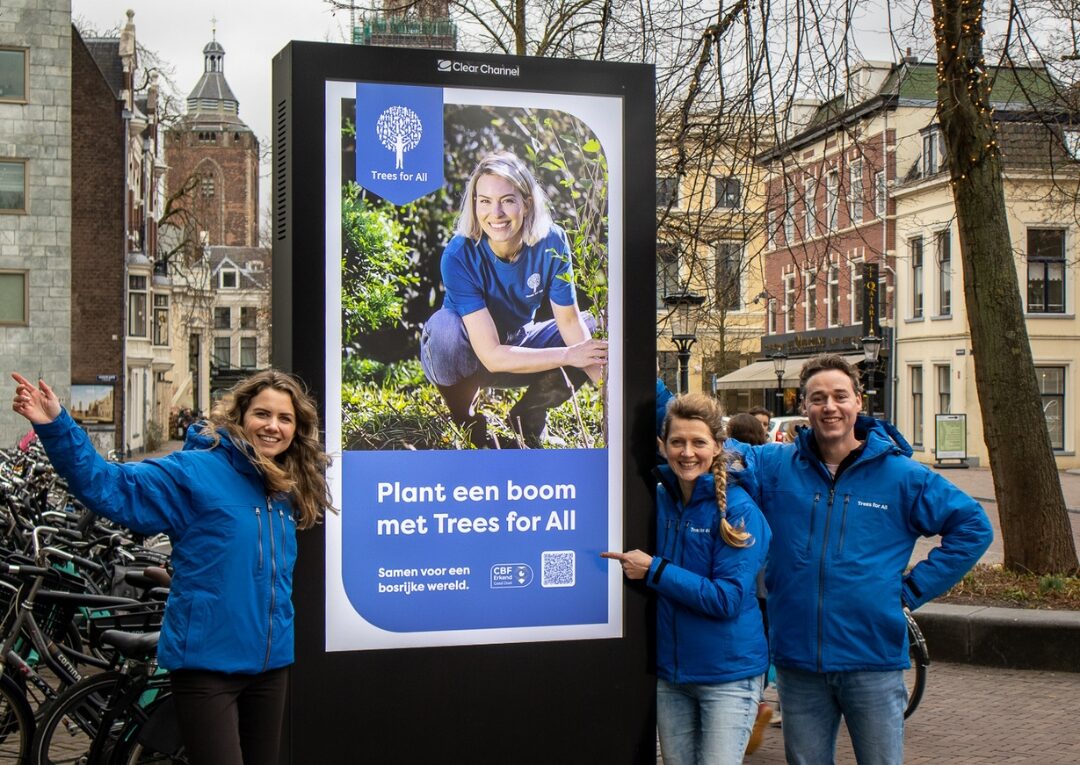
Good, green resolutions begin with insight. So in January we called on people to calculate their previous year’s footprint through our website, so they could make more sustainable choices in the new year. In addition, they could make a donation to offset their 2023 carbon emissions.

In order to plant as many trees as possible, we need as many people as possible. So we were visible all year round on the streets through our posters. We would like to thank our media partners ESH Media and ClearChannel for this visibility, which helps us to get more people involved in our mission.

Good, green resolutions begin with insight. So in January we called on people to calculate their previous year’s footprint through our website, so they could make more sustainable choices in the new year. In addition, they could make a donation to offset their 2023 carbon emissions.

In April, we celebrated Earth Day – the perfect day to do a good a turn for our planet. And what better idea than to make a positive difference to the earth on this day by donating a tree? Thanks to this campaign, we were able to plant an extra 6,948 extra trees in the Netherlands, Indonesia and Mexico.

From extreme heat to exceptionally wet summers: climate change is making our weather more and more extreme. So in the summer we drew attention to the role of trees in combatting climate change and extreme weather conditions, with the help of our ambassador and weatherman Reinier van den Berg.
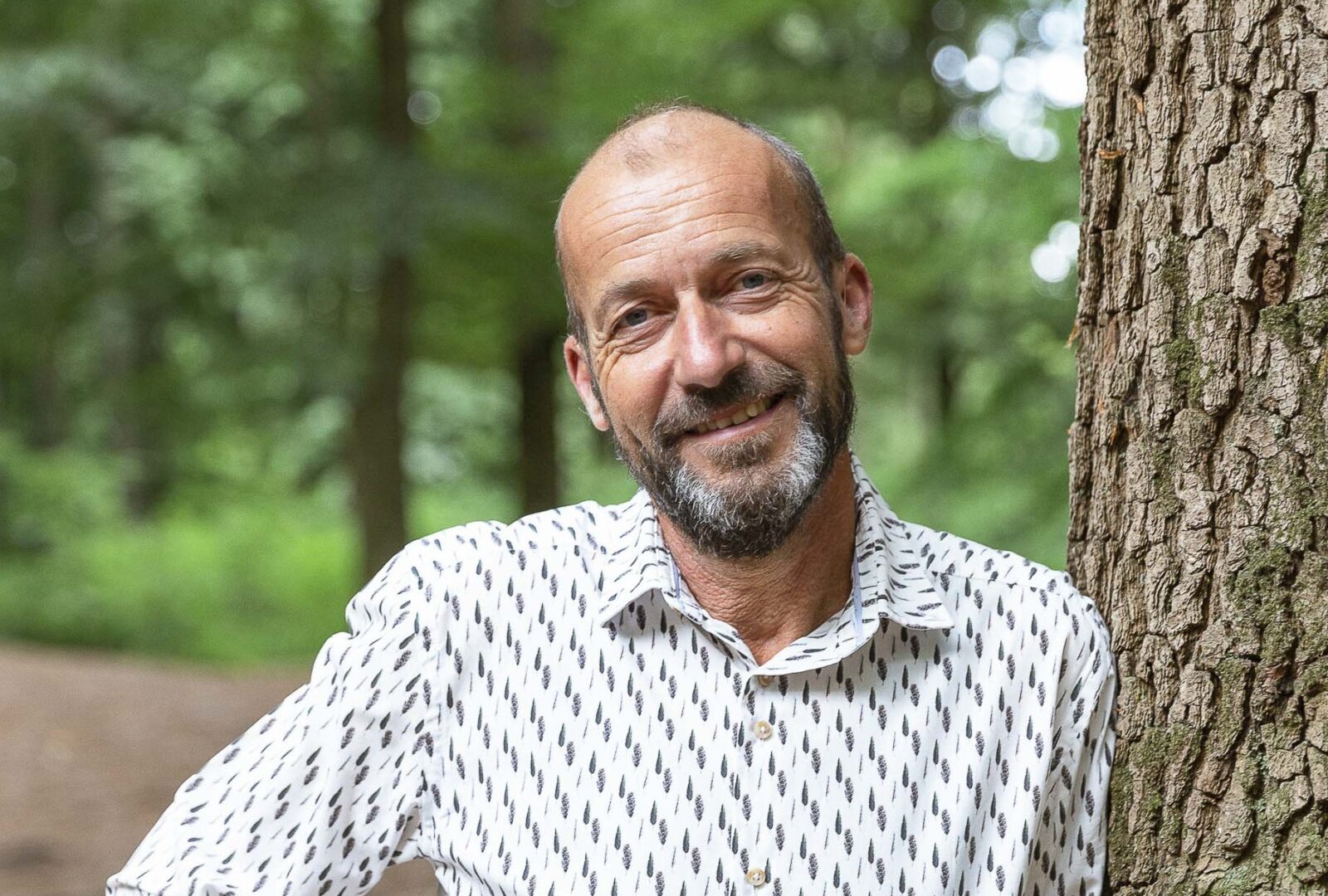
In April, we celebrated Earth Day – the perfect day to do a good a turn for our planet. And what better idea than to make a positive difference to the earth on this day by donating a tree? Thanks to this campaign, we were able to plant an extra 6,948 extra trees in the Netherlands, Indonesia and Mexico.

From extreme heat to exceptionally wet summers: climate change is making our weather more and more extreme. So in the summer we drew attention to the role of trees in combatting climate change and extreme weather conditions, with the help of our ambassador and weatherman Reinier van den Berg.

Throughout the month of October, we celebrated our 25th anniversary with a unique campaign. For the first time in the history of Trees for All, donors could plant a tree in their name, thus fulfilling a wish of many people and businesses.
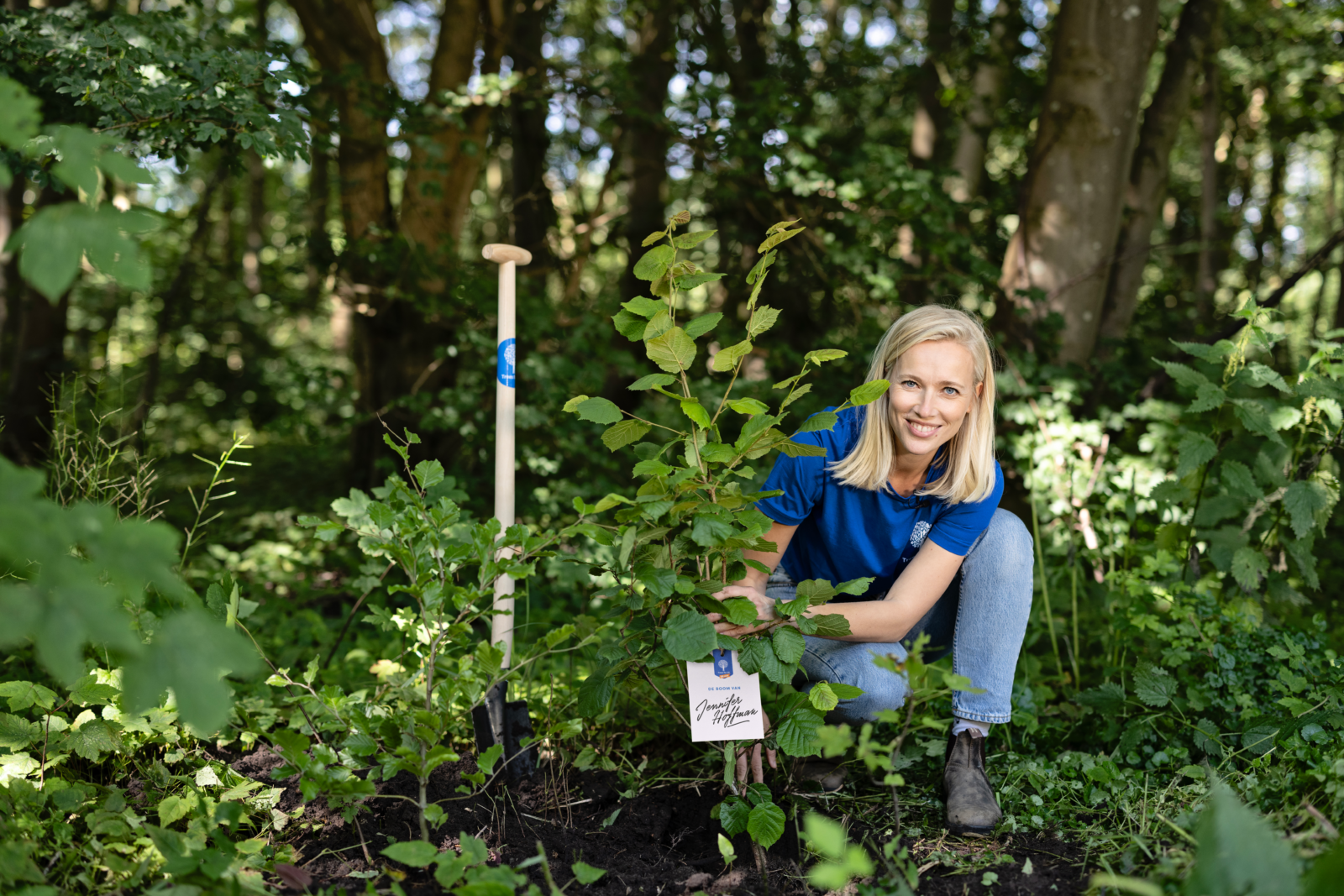
For the sixth year in a row, we voiced our opposition to over-consumption in relation to Black Friday through our Green Friday campaign. We created a Choice Tree that enabled donors to make more sustainable choices in their purchases. In addition, around 200 businesses planted trees instead of offering Black Friday discounts. They included Kaartje2Go, MyWheels, Natuurhuisje, Via Vai, A. Vogel, the City of Amsterdam and Dille & Kamille.
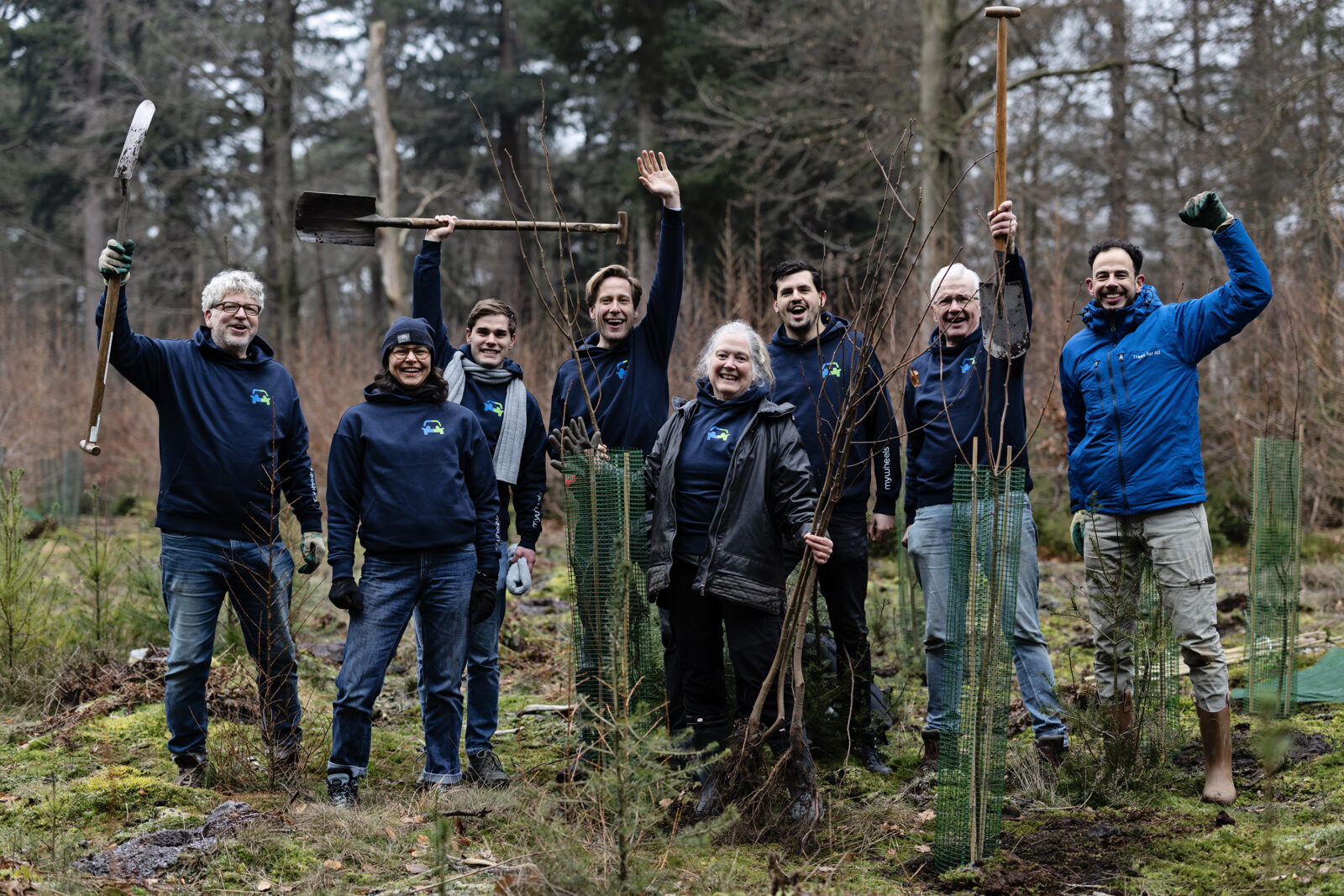
Throughout the month of October, we celebrated our 25th anniversary with a unique campaign. For the first time in the history of Trees for All, donors could plant a tree in their name, thus fulfilling a wish of many people and businesses.

For the sixth year in a row, we voiced our opposition to over-consumption in relation to Black Friday through our Green Friday campaign. We created a Choice Tree that enabled donors to make more sustainable choices in their purchases. In addition, around 200 businesses planted trees instead of offering Black Friday discounts. They included Kaartje2Go, MyWheels, Natuurhuisje, Via Vai, A. Vogel, the City of Amsterdam and Dille & Kamille.

2024 was the year we celebrated our 25th anniversary. Throughout the month of October, our donors could plant named trees in our Anniversary Forest. And people took up the offer en masse!
For our 25th anniversary, our wish was to plant an Anniversary Forest of 25,000 trees: 1,000 for each year of our existence. Thanks to our wonderful supporters, this number grew to no fewer than 57,000 trees! A fantastic result in which we take incredible pride.
For the first time in the history of Trees for All, donors could plant a tree in their name, thus fulfilling a long-cherished wish. Trees were planted by a great number of our donors, who shared some very special stories with us.
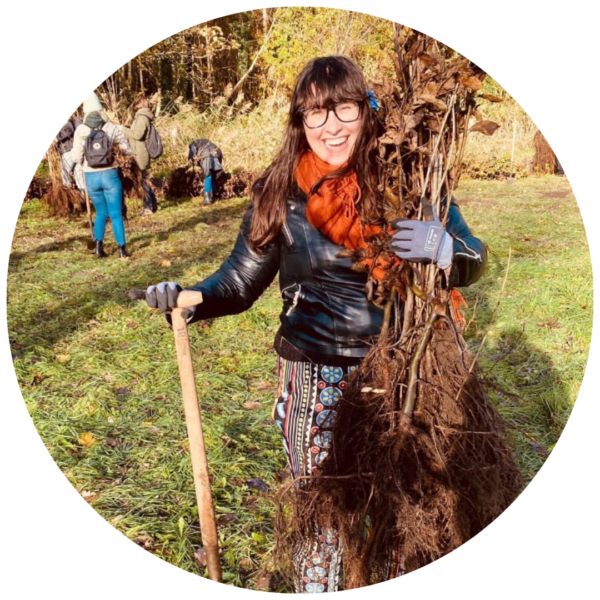
“Almost three years ago, our son Elijah was stillborn. Since then, we’ve experienced how valuable it is to hear or see his name. And now he has a little sister, it feels extremely important to invest in her future by looking after our planet well. So I wanted to plant trees in their names in Trees for All’s Anniversary Forest.”
– Daphne van ’t Hof, donor
All the donors could see their own named tree in the digital Anniversary Forest on our website. We also planted the trees physically in the nature reserve Het Pompveld (West-Brabant) along with over 400 enthusiastic donors.
Besides private donors, we could also count on the support of businesses, such as Jaarbeurs, KUBUS, Dura Vermeer, Pink Roccade, Exact, USG People, Bamboo Basics, Hotels for Trees, Engie and Sogeti. They too had their own reasons for contributing to the Anniversary Forest.
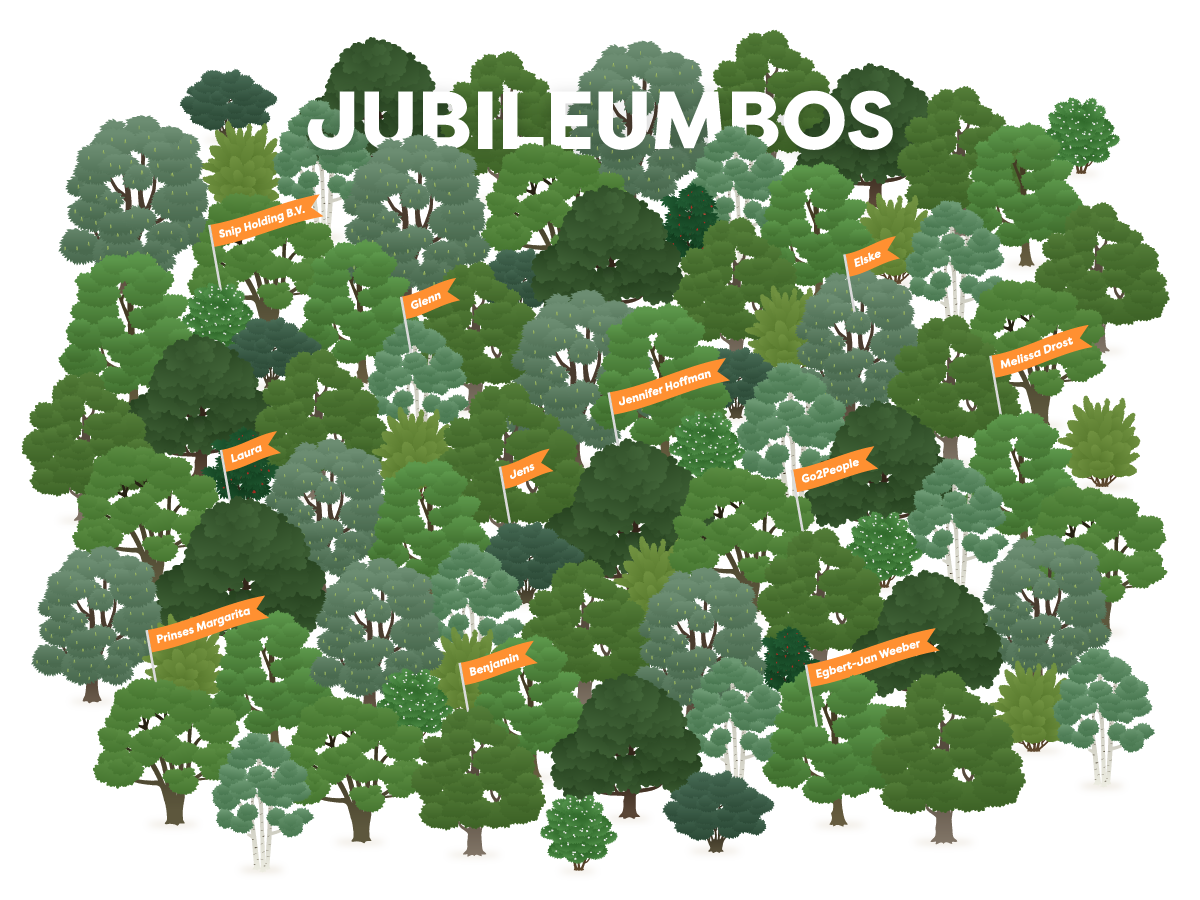
“At Jaarbeurs, we hold the conviction that we must treat our planet with care. So for each exhibition or meeting, and for each conference or event, we donate a tree to Trees for All. As we wanted to join in the 25th anniversary celebrations, we chose to donate all the trees for 2024 to the Anniversary Forest.”
– Marloes van den Berg, Chief People & Sustainability Officer

The Anniversary Forest is now in its initial growth phase in the nature reserve Het Pompveld in West-Brabant. It is a special location, as Het Pompveld is part of a Natura 2000 network. By planting the trees, we are linking up existing natural areas and creating one big habitat for plants and species of animal like the beaver, kingfisher and golden oriole. Our project partner Brabants Landschap helped with the planting and is carrying out the long-term management of the forest.
Together, we have made a lasting impact through this milestone. Now on to the next 25 years!
“We planted a personal tree for each colleague. For us, that was a great way of supporting our sustainability goals and making a tangible contribution to restoring nature. We donated a total of 2,500 trees, whereby each tree reflects the devotion of KUBUS to a sustainable future.”
Erik Pijnenburg, CEO Kubus

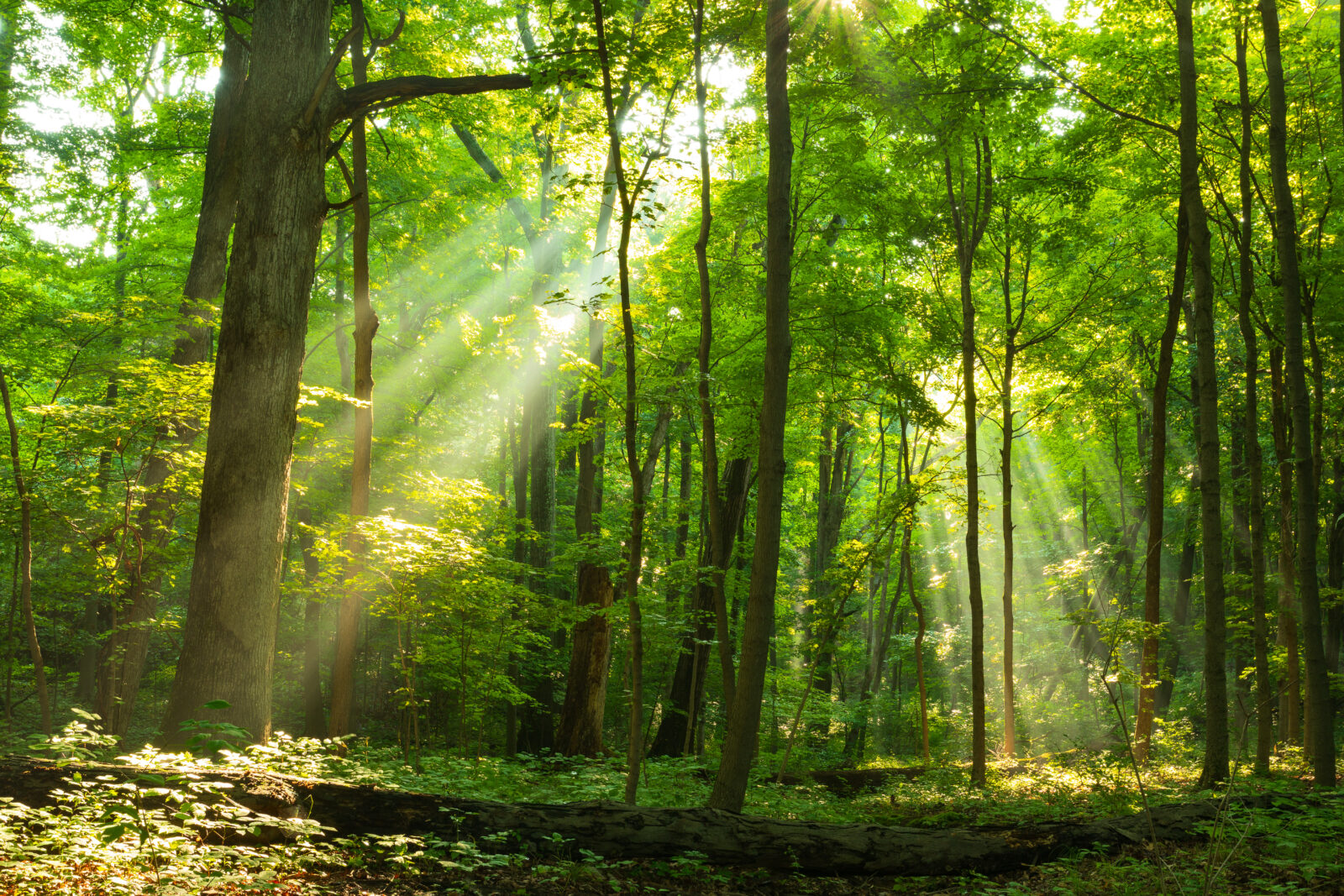
More and more people are choosing to include Trees for All in their will. We really appreciate them also wanting to support our work when they are no longer with us.
Last year, several people pledged to include Trees for All in their will. Their reasons for doing so are very diverse, but the constant factor is that they want to continue contributing to a world with more forests. We think it is fantastic that people make this choice and leave their personal estate (in part) to the cause.

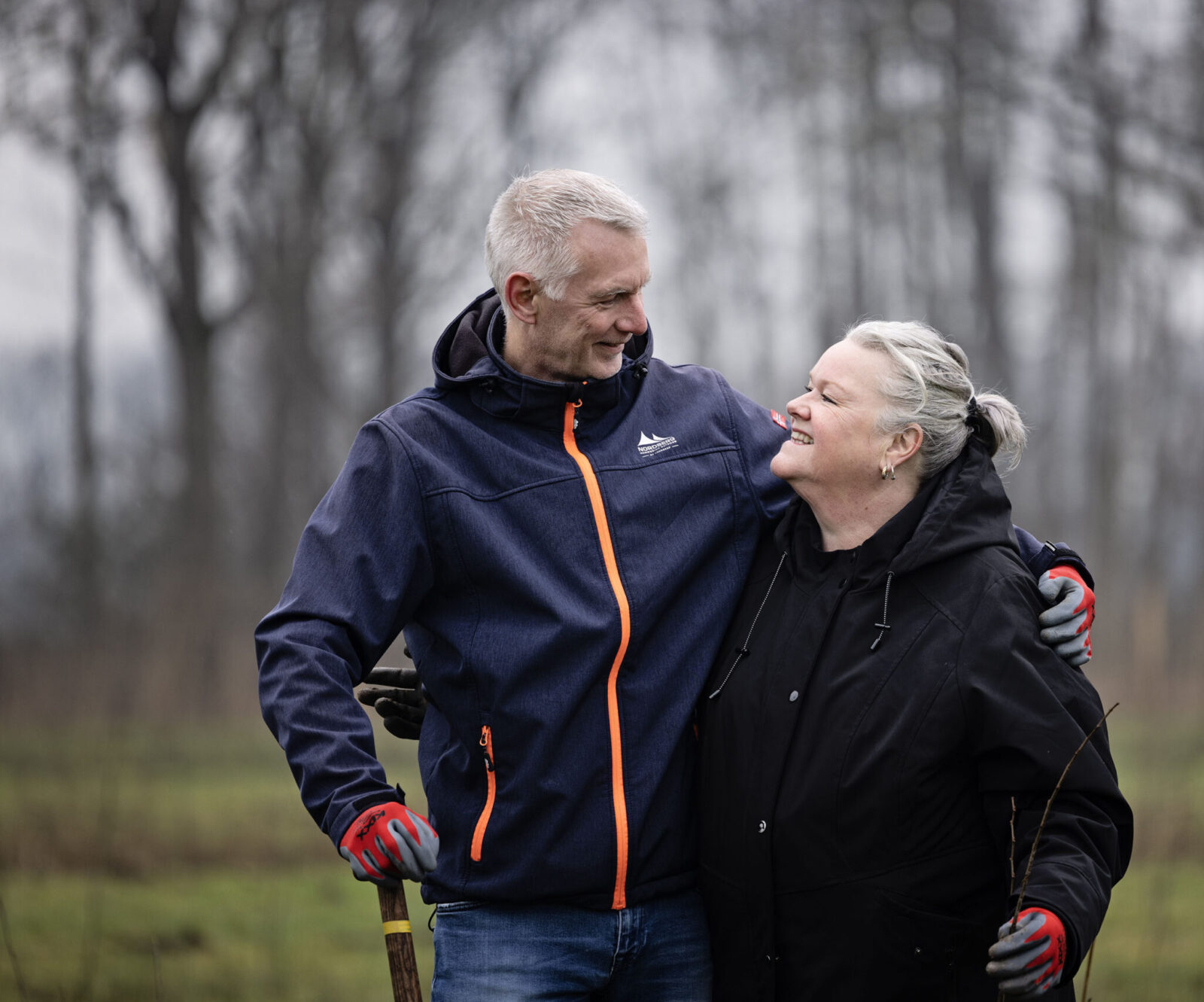
Johan and Carola, for example, decided to include Trees for All in their will as the sole heir. Johan: “When we started thinking about our estate, we immediately knew we wanted to bequeath it to nature. We have no children ourselves, but we wanted to hand down something beautiful for all the children in the world. By investing in nature, we’re helping the generations that follow us. After all, it’s all about their future.”
There are different options to include Trees for All in a will:
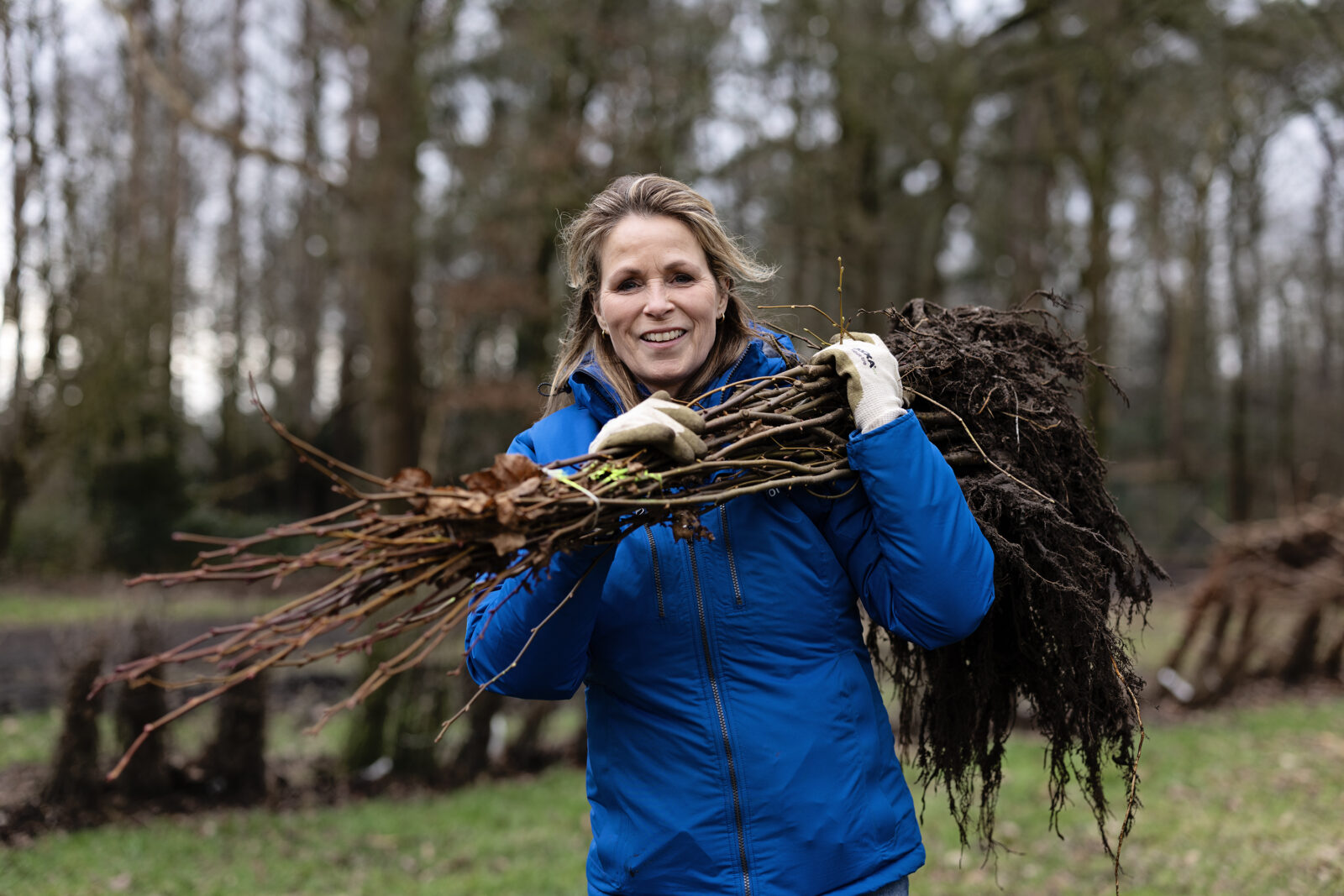
“When people think about how they want their money to be shared out when they are no longer with us, it’s a very personal matter. So I think it’s extra special when people choose to leave it to Trees for All. I listen carefully to their personal wishes and help arrange all the details. We can then ensure that every amount will be put to the right cause, which gives peace of mind.”
– Aletta Janssen, contact person for legacies Trees for All
Handing down a world with more forests is also possible during your life. Several of our donors do so through a regular donation: a fixed amount that you give us every year for a minimum of five years. The benefit of doing so is that a regular donation is fully deductible on your tax return. So you make even more impact for the same amount!
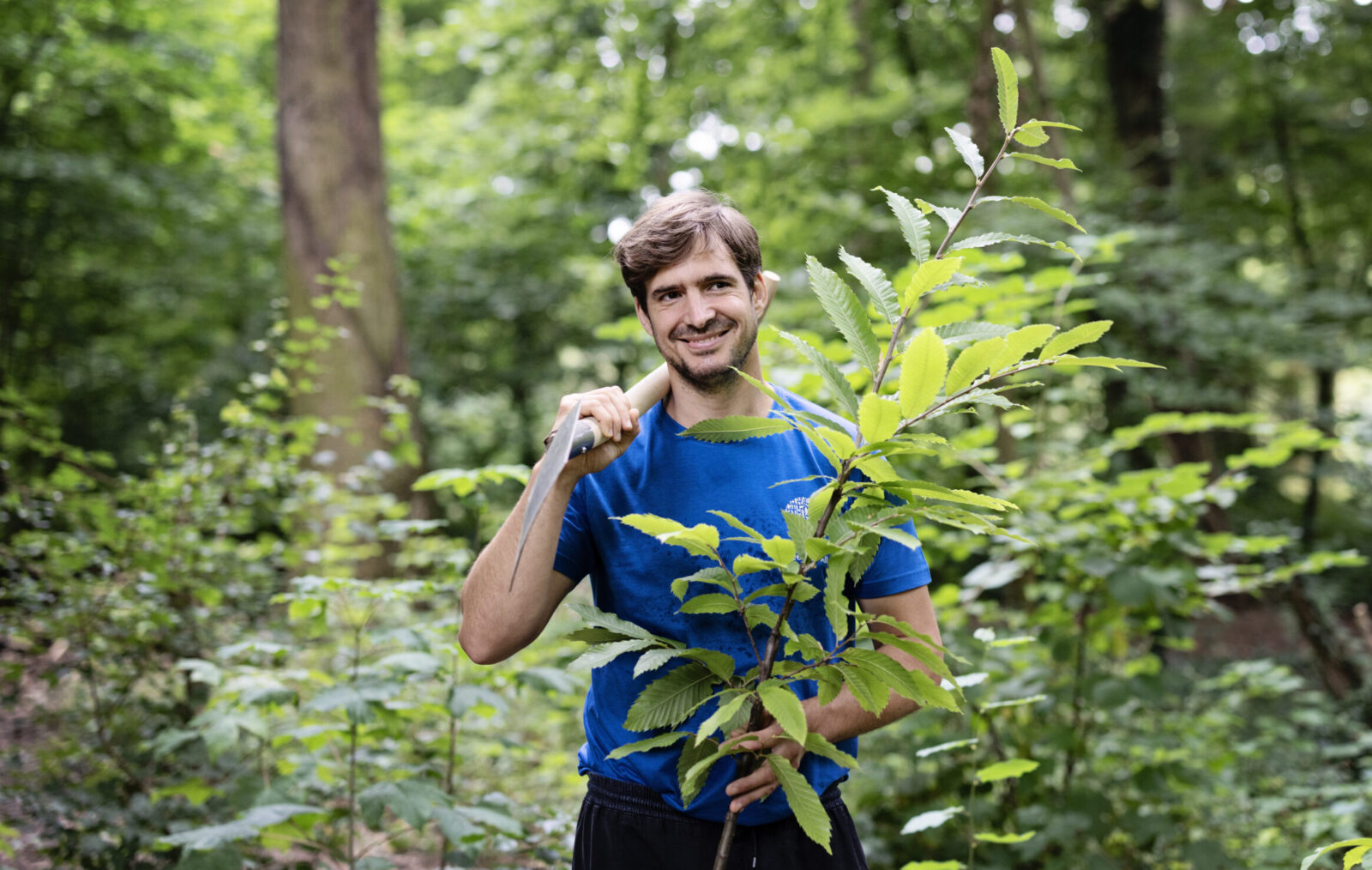
Ambassadors are invaluable to us. They help us raise even more people’s awareness of the importance of trees and inspire them to contribute a tree themselves. Last year, we welcomed 4 new ambassadors and one patroness.
Jennifer Hoffman is an actress and presenter, and for many years has been a real champion of sustainability. When she started presenting the TV programmes Genaaid and Gefileerd, there was no stopping her. She saw with her own eyes the negative impact that fast fashion and the food industry have on our planet. Since then, she has been working with even more conviction for a better world.
“For me, change begins with nature, as nature is our foundation. So we must always continue to care for it. And we can do that by planting more trees.”
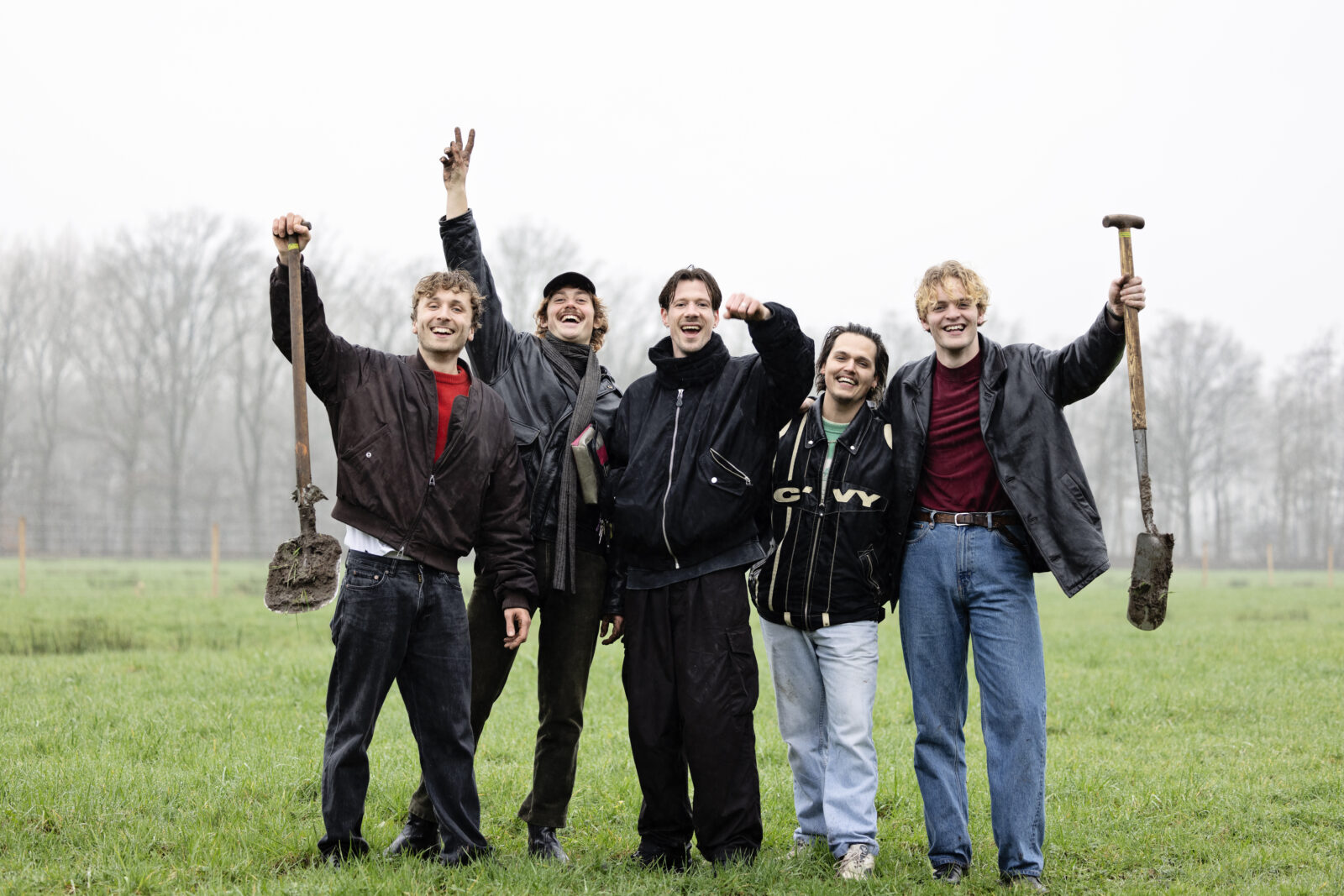
In the case of Son Mieux, we have gained not just one, but seven new ambassadors! The band from The Hague wants to give something back to the earth, as their shows have quite an impact on the climate. So they are planting trees with us.
When buying a ticket for a live show, their fans can make an eco-donation or donate directly online to the Son Mieux forest in South Holland. We are incredibly proud of the band’s green sound. Or as they say themselves, ‘Let’s plant some trees!’
Egbert-Jan Weeber is an actor and, above all, a true nature-lover. As a child, his grandfather often took him to the woods; something he wants to do in the future with his own kids as well.
“I’m concerned about all the nature that’s disappearing. We should actually be planting more trees; for a better climate, clean air and a healthy planet. That’s what I want to devote myself to as a Trees for All ambassador.”

Babette Porcelijn is an impact expert. As a speaker, writer, trainer and adviser, she gives people and organisations more insight into their impact on the planet, substantiated by practice and science.
She has written the books ‘De verborgen impact’ (The Hidden Impact) and ‘Het happy 2050 scenario’. She also set up the foundation Think Big Act Now, to help people improve their systems and make them more sustainable. “The importance of forests is often underestimated. That’s why I’m an ambassador for Trees for All. The more trees, the better.”
Her Royal Highness Princess Margarita of Bourbon-Parma is the patroness of Trees for All. And she is fulfilling this role in a special way! The princess wants to raise people’s awareness of the importance of trees and inspire them to plant trees. And she is doing that herself as well.
Through her company De Parme Design – where she designs jewellery inspired by nature – she is supporting various projects by Trees for All. “In that way, I can give something back to nature, which is an endless source of inspiration to me.”
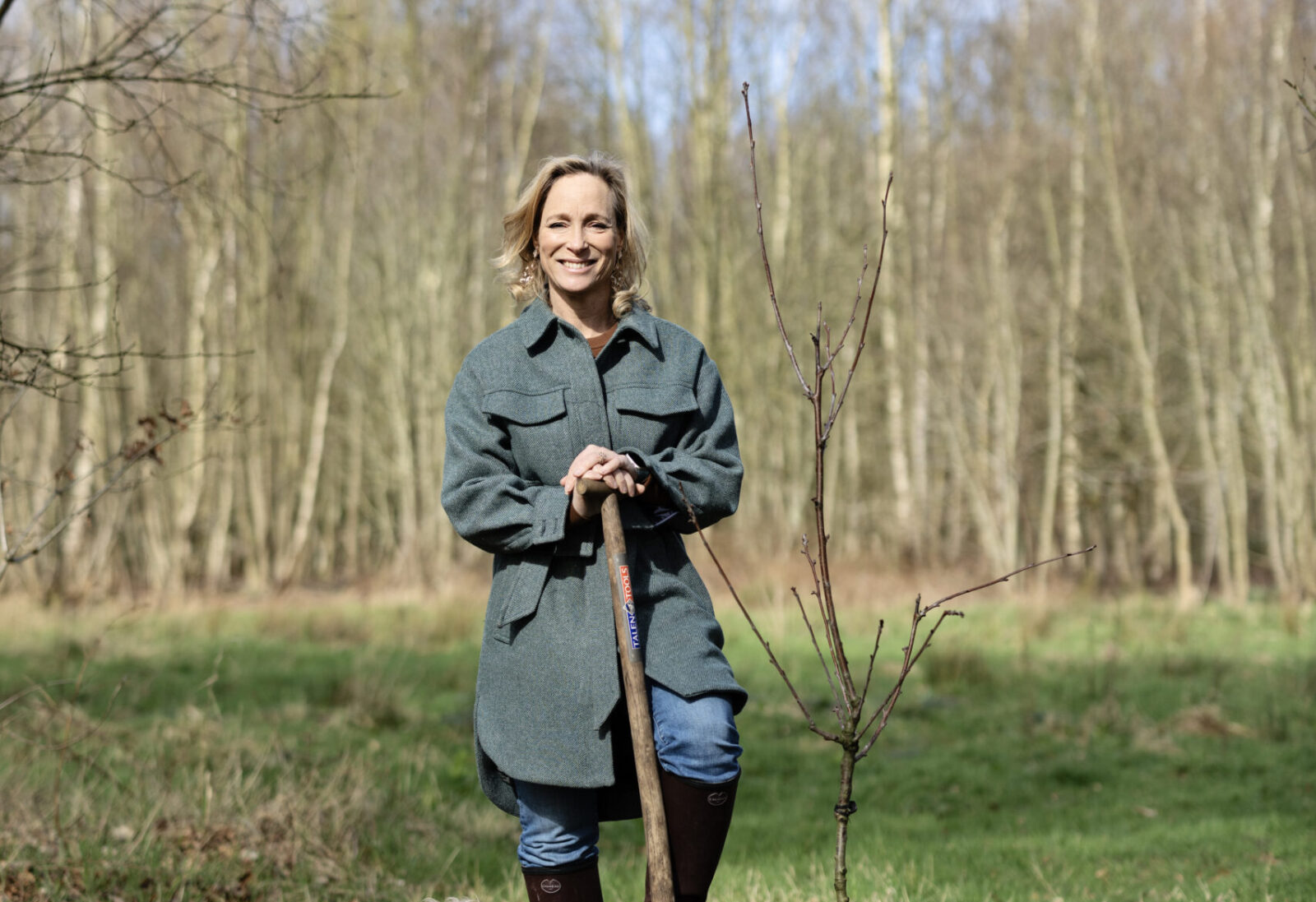
Curious about our other ambassadors? You can find them on our website.

The work of Trees for All involves risks and uncertainties. Managing these risks is therefore an important part of our work. What are these risks and how do we manage them optimally?
Trees for All has listed and documented the main risks, using a risk analysis matrix, with the goal of being able to manage them in a structured way. The management team, the director and the board were involved in drawing up the list. They looked at external risks (outside-in impact) as well as internal risks (inside-out impact).
The risk dossier was compiled in accordance with the principle impact = chance x effect. The risk analysis includes the listed risks along with the following:
The management team and the director keep the dossier up to date. Every year, they discuss the risk analysis with the whole board and adjust it where necessary. The risk analysis also forms the basis for the amount of continuity reserve deemed desirable by the board.
Fundraising is strategically important to the continuity of our organisation and the achievement of our goals. For fundraising, we are largely dependent on donations from private individuals and businesses. Most of the funds we raise are designated, i.e. they are appropriated for planting forests or offsetting carbon emissions.
We also receive donations that are undesignated, such as the donation made to us by the Nationale Postcode Loterij. Undesignated donations give us the scope to invest in new projects, awareness campaigns and our own organisation. Such a donation is therefore an important addition to the regular income from our own fundraising, enabling us to develop new, innovative programmes, for example, or to cover organisational costs (in part).
The greater part of our income comprises donations from businesses. Various external factors can have a negative influence on the willingness of businesses to support our objectives. In 2024, for instance, we saw a decline in the support for projects to offset carbon emissions, partly due to negative publicity about carbon offsetting. Other factors that may play a role are different priorities in sustainability policy, or less favourable economic prospects.
We therefore continually work on our brand awareness, our relationship management and attracting new private and corporate donors, by focusing on the positive impact of our activities on the climate, biodiversity and living conditions. We also continue to expand our propositions and invest in a diverse donor database. From 2025, for instance, there will be an extra focus on funds and major donors.
Damage to our reputation can undermine the willingness of businesses, private individuals or other organisations to support our objectives. This may occur, for example, through improper dealings or integrity issues within our own organisation or in connection with our partners or ambassadors. Our reputation can also be damaged in the event of a data leak.
Our tolerance regarding the risk of reputation damage is low. We continually ensure that our organisation is in order, thanks to a careful personnel policy and clear work processes and procedures. The powers are set out in articles of association and regulations. We also have a good management structure, with a critical board, covering all the areas of expertise that are important to our organisation.
We also comply with all the legal norms and sector-related agreements, such as privacy laws, ANBI conditions and the CBF qualification system. And finally, we ensure compliance with our integrity policy and anti-money laundering policy. External parties, such as project partners and ambassadors, are carefully screened before we enter into collaboration with them.
Tree planting and reforestation projects always involve risks. For instance, planting may be delayed due to unforeseen circumstances or saplings may be lost because of extreme drought. In the case of international projects, political or geo-political risks may arise. And there may be changes to local laws and regulations, which might not be covered by contracts in all situations.
We are prepared to accept some of these risks in order to achieve our mission. However, we always strive to keep the risks within acceptable limits. All our projects therefore undergo extensive assessment and screening before we start (due diligence), drawing on our in-house expertise or that of third parties. We monitor progress carefully through contact moments with our project partners (online and offline), field visits and detailed reports. We set payment terms that depend on the progress of the project (“activities and output milestones”).
Besides tree planting and reforestation projects, Trees for All also supports CO2 projects. Through these projects, donors can demonstrably offset their carbon emissions. Since mid-2021, we only offer this option through certified projects, for which we have financed the planting ourselves. This method means that the period of pre-financing is longer and that the associated risks are higher.
All our CO2 projects are certified by Plan Vivo. This internationally reputable standard guarantees the amount of carbon sequestered, or still to be sequestered, to a large extent. Moreover, projects certified by Plan Vivo have a broad impact. They contribute to a better climate, increase biodiversity and involve the local population in the project. Previously, Trees for All also worked with emission allowances from projects certified by VCS-CCB.
By organisational risks, we mean circumstances that impede or damage the effectiveness of the organisation, e.g. fire or water damage, IT malfunctions or cyber crime.
In order to avoid this as far as possible, we regularly assess the cover of our insurance policies. We also have good contractual agreements for IT support and maintenance. Starting in 2025, we have also appointed an internal IT specialist. In addition, we will raise our employees’ awareness of cyber crime, IT and security through training courses.
Our own work organisation is relatively small compared to the scope of our activities, as we work extensively with external project partners who are responsible for the day-to-day implementation of tree planting and reforestation projects. This gives us the flexibility to quickly upscale or downscale activities, depending on the situation. On the other hand, this is a vulnerability, for example if staff in critical positions are temporarily absent or leave employment. We therefore continually work on reinforcing and optimising our organisation and we invest in the training and development of our employees.
Trees for All supports dozens of tree planting and reforestation projects worldwide. If we enter into several large-scale projects at the same time, it leads to considerable project expenses that may not run parallel to our income from donations. We therefore continually monitor the total of the project obligations we have entered into, balancing them against the liquid assets available to us and the donations that are pledged to us and which we expect to receive.
All the project obligations entered into are included on our balance sheet as liabilities. Donations from fundraising are only included when they have been received or when they have been invoiced to corporate partners. At the end of 2024, all our project obligations were covered by the donations received.
Our liquid assets in Euros are held by two sustainable Dutch banks: Triodos Bank and ASN Bank. Triodos Bank has a BBB rating with a stable outlook (Fitch). ASN Bank is owned by the Dutch state.
Trees for All runs a currency risk on contractual obligations entered into in USD. For contractual obligations in USD, we hold an equivalent amount of liquid assets in a USD account with ABN AMRO in order to cover the risk.
Trees for All is a foundation without a profit motive. In accordance with the Dutch Anti Money Laundering (AML) regulations, we are not subject to the Money Laundering and Terrorist Financing (Prevention) Act (Wwft). However, we do strive to meet the relevant AML conditions as far as possible. We think this is important, as we receive financial donations from, and give financial support to forestry projects in high-risk countries. We have therefore set up an anti-money laundering policy.
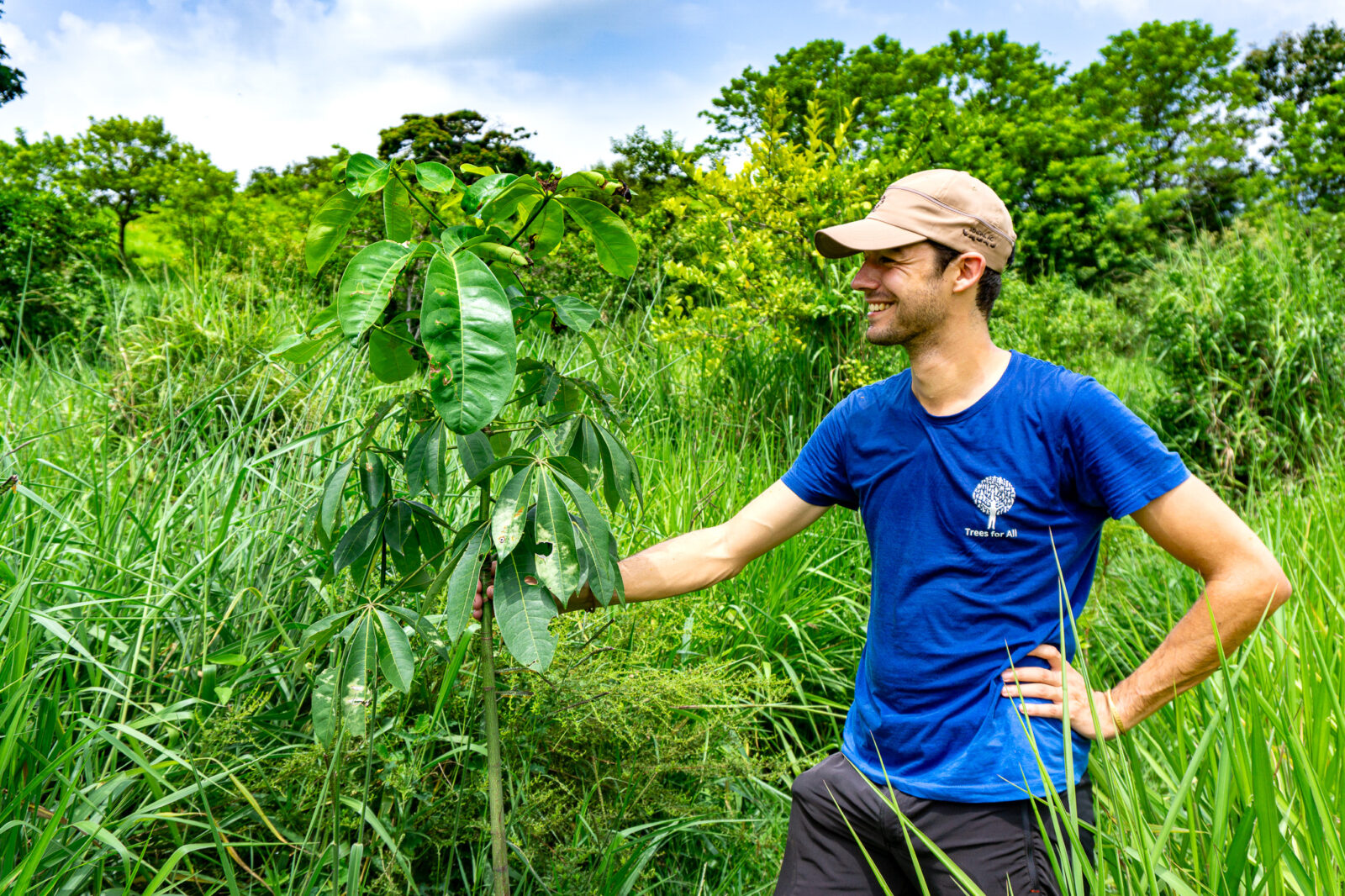
The accountability statement describes how Trees for All functions at managerial, executive and financial levels, in accordance with the requirements set by the Netherlands Fundraising Regulator (CBF).
Trees for All s a charity with an independent board that holds final responsibility for our foundation. The board has appointed directors with delegated powers, which includes the day-to-day management of the team.
Trees for All has its registered office in Utrecht. Our articles of association are published on our website.
Trees for All is recognised as a charity by the CBF. This means that we meet the strict quality standards of the Netherlands Fundraising Regulator (CBF); the independent regulator for charitable organisations in the Netherlands. The CBF checks every year that we meet the quality standards. This guarantees our donors that Trees for All is reliable and that their donations are spent properly..
Besides being recognised as a charity, Trees for All is also registered as a Public Benefit Organisation (ANBI). This means we have no profit motive and our work is carried out in the broader interest. In our case, that involves more trees and forests – for a better climate, more biodiversity and healthier living conditions worldwide.
Trees for All works in accordance with the board model, which means that we have an independent board that holds final responsibility for our foundation and has appointed directors with delegated powers.
Our board has five members. Their tasks include adopting the long-term policy, the annual plan, the budget and the annual accounts. They also supervise the functioning of the directors and the work organisation, and are involved in drawing up the strategy, the long-term strategy and the policy to be followed. Finally, the board also takes decisions about entering into new project obligations that exceed the mandate of the directors.
In 2024, the composition of the board changed, and Frederique de Jong Schouwenburg joined as a new board member. The board is actively involved in the organisation and came together eight times for a board meeting in 2024. The annual self-evaluation of the board’s performance took place at the beginning of 2025.
Within the board, three committees are active, on which board members sit, based on their expertise:
In 2024, the board members received a volunteer fee to the maximum permissible amount, which was € 2,100 per year (pro rata). It is not advisable that board members carry out paid assignments for the foundation, and this did not take place.

Mateo Mol
Primary and secondary post(s):

Kees Romme
Primary and secondary post(s):

Cor von Meijenfeldt
Primary and secondary post(s):

Frederike Hummel
Primary and secondary post(s):

Frederique de Jong Schouwenburg
Primary and secondary post(s):
Our directors are responsible for our long-term policy, the annual plan and the general policy, and for achieving our objectives. The directors take on new employees and ensure an effective and efficient organisation. In doing so, they identify developments and – in consultation with the board – make adjustments where necessary. The responsibilities and authorities are set out in the directors’ regulations.
In 2024, the composition of our management changed with the introduction of a new leadership model. Our Managing Director, Simone Groenendijk, stepped down from Trees for All on 1 March 2025 after six years. She was succeeded by two new directors. On 1 October 2024, Stef Röell – previously Manager Forest & Climate – joined the management team as director of Projects and Innovation. In addition, Marieke Romano started as director of Fundraising, Marketing & Communication on 6 January 2025.
The board appoints the directors, assesses them annually and sets their salaries. In determining the remuneration policy and setting the salaries, Trees for All complies with the Regeling beloning directeuren van goededoelenorganisaties (Remuneration of directors of charity organisations regulation). This regulation gives a maximum norm for the annual income, based on several criteria, leading to a ‘BSD’ score.
Until 2024, the Trees for All directors were classed in job group G of the BSD score 395 (as in 2023). The maximum gross income was € 129,292. The actual salaries remained within these maximums. No loans or guarantees were received by the directors. The annual income, too, including the taxed allowances, additions to the taxable income, pension costs and other remuneration, remained with the maximum of € 160,322 per year that is included in the regulation.
From 1 October 2024, the two directors of Trees for All were classed in job group F of the BSD score 344. The maximum gross income was € 115.922, and the maximum annual income was € 143.743. The remuneration of the directors will remain within these norms for twelve months and can be found in our Annual Accounts.

Simone Groenendijk
General director (until 1 October 2024)
Director of Fundraising, Marketing & Communications (until 1 March 2025)

Stef Röell
Director of Projects & Innovation (as of 1 October 2024)

Marieke Romano
Director of Fundraising, Marketing & Communications (as of 6 January 2025)
Secondary posts:
The directors manage the work organisation. On 31 December 2024, the team comprised 26 employees (including the directors). Curious to see all the faces behind Trees for All?
Alongside its regular team, Trees for All can call on a number of volunteers. Their rights and obligations are set out in a volunteer agreement. Two volunteer agreements were concluded in 2024.
Policy forms an important basis for carrying out our daily activities. Our policy is outlined in more detail below.
At Trees for All, we work with an annual plan and budget, which are drawn up under the responsibility of the directors and adopted by the board following discussion.
Where necessary, the annual plan and/or budget are adjusted throughout the year. This was the case in 2024, due to decreasing income as a result of changes in the market. Of course, we have taken account of these developments in drawing up the new annual plan and budget for 2025. For instance, we will be broadening our propositions and taking a more target group-based approach in our work, in order to better meet the demand of donors.
In addition, our planning and control cycle in 2025 comprises not only financial factors, but also result indicators. These have been drawn up in collaboration with the teams and they link up with our objectives, thus reinforcing our impact and allowing us to continue to respond flexibly to change.
Once every three years, the board adopts a long-term policy that sets out the focus points and directional goals. The long-term policy is formulated and implemented through the annual plans and budgets. We will publish our long-term policy on our website during the course of the year.
Integrity is an important hallmark of a professional and reliable organisation. Not only does it promote internal transparency and cooperation, but it also gains the trust of stakeholders. We therefore work with an integrity policy and a code of conduct. They set out various norms that we believe are important in acting with integrity: both within the organisation and in dealings with other parties involved with Trees for All.
In addition, we work with:
Finally, as a recognised charity, we are obliged to report unacceptable behaviour to the Central Bureau on Fundraising (CBF). The CBF thus supervises the development and application of the integrity system. No reports were made in 2024.
At Trees for All, we believe in sustainability in all we do. This is reflected throughout our organisation. Our tree planting and reforestation projects focus on the long term, and we remain involved in them for at least ten years. And we prefer to enter into long-term collaborations with our project partners and corporate donors.
Sustainability is also visible in our day-to-day activities. Our colleagues travel as often as possible by public transport or in groups, to the office, for example, or to the tree planting days in the Netherlands. We also have a sustainable office with an A+ energy label within walking distance of Utrecht Central Station, our lunches are vegetarian and we use as little paper as possible.
It is therefore our international project visits that account for most of our carbon emissions. So we visit the international projects once every two years, in principle, and combine project visits wherever possible. In 2024, six international field visits took place, whereby nine of our projects were visited.
In 2024, our total carbon emissions were 53.09 tons. We calculated this using the Envirometer tool provided by the Stimular foundation, based on the carbon emission factors of Milieu Centraal.
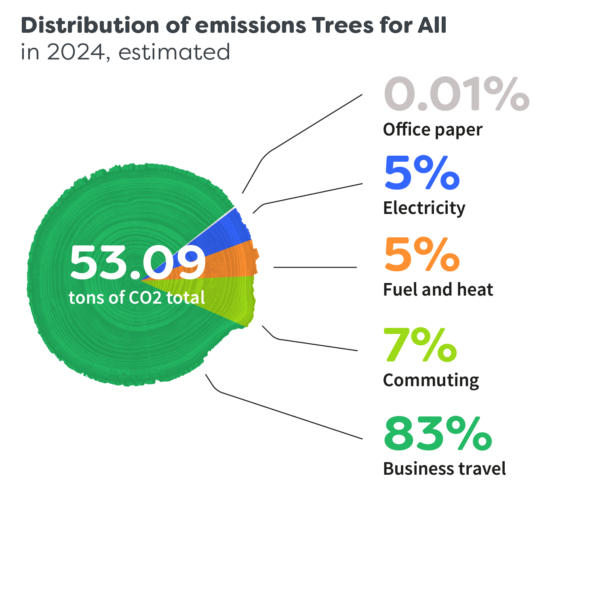
Our annual accounts are drawn up in accordance with the Directive for Fundraising Institutions (RJ650), published by the Dutch Council for Annual Reporting. The main principles are outlined below.
Trees for All strives towards optimal spending of the donations we receive. In this way, we work on achieving our goals effectively and efficiently: planting more trees worldwide and raising people’s awareness of the importance of trees. In doing so, we use a number of ratios as financial management tools.
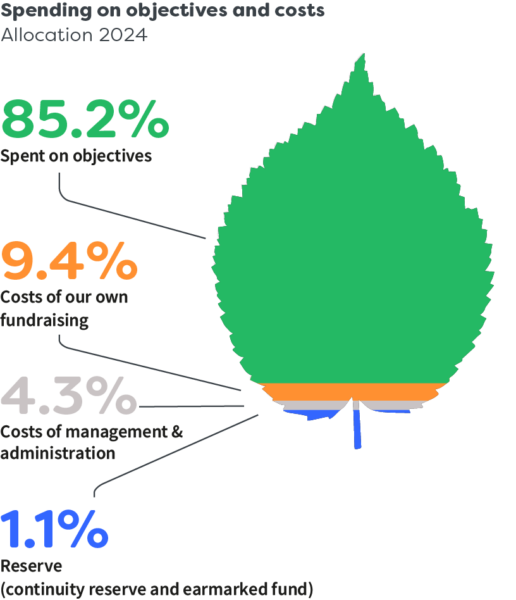
On a stock balance sheet, we record how many trees have been donated and how many tons of carbon must be sequestered (number of carbon credits). This is set against the obligations arising from contracts with project partners, which set out how many trees will be planted and how much carbon will be demonstrably sequestered. We aim for a correct proportion of donations received and contractual obligations entered into. Our auditor is reviewing this stock balance and has issued a notice for this.
The continuity reserve is a financial buffer that serves to guarantee the continuity of our work organisation and objectives in the event of disappointing results, for example. On the basis of a risk analysis, the board has set the desired amount of the continuity reserve at € 2.6 million. In the risk analysis, all the risks are weighed on the basis of the chance of them occurring, and an estimate is made of the impact on achieving our goals if certain risks should occur.
The short-term and long-term liabilities include the project obligations still to be paid under contracts concluded. They also include the binding declarations of intent with our project partners. They can be found in our Annual Accounts.
In 2024, we had no financial investments or loan capital owed to third parties.
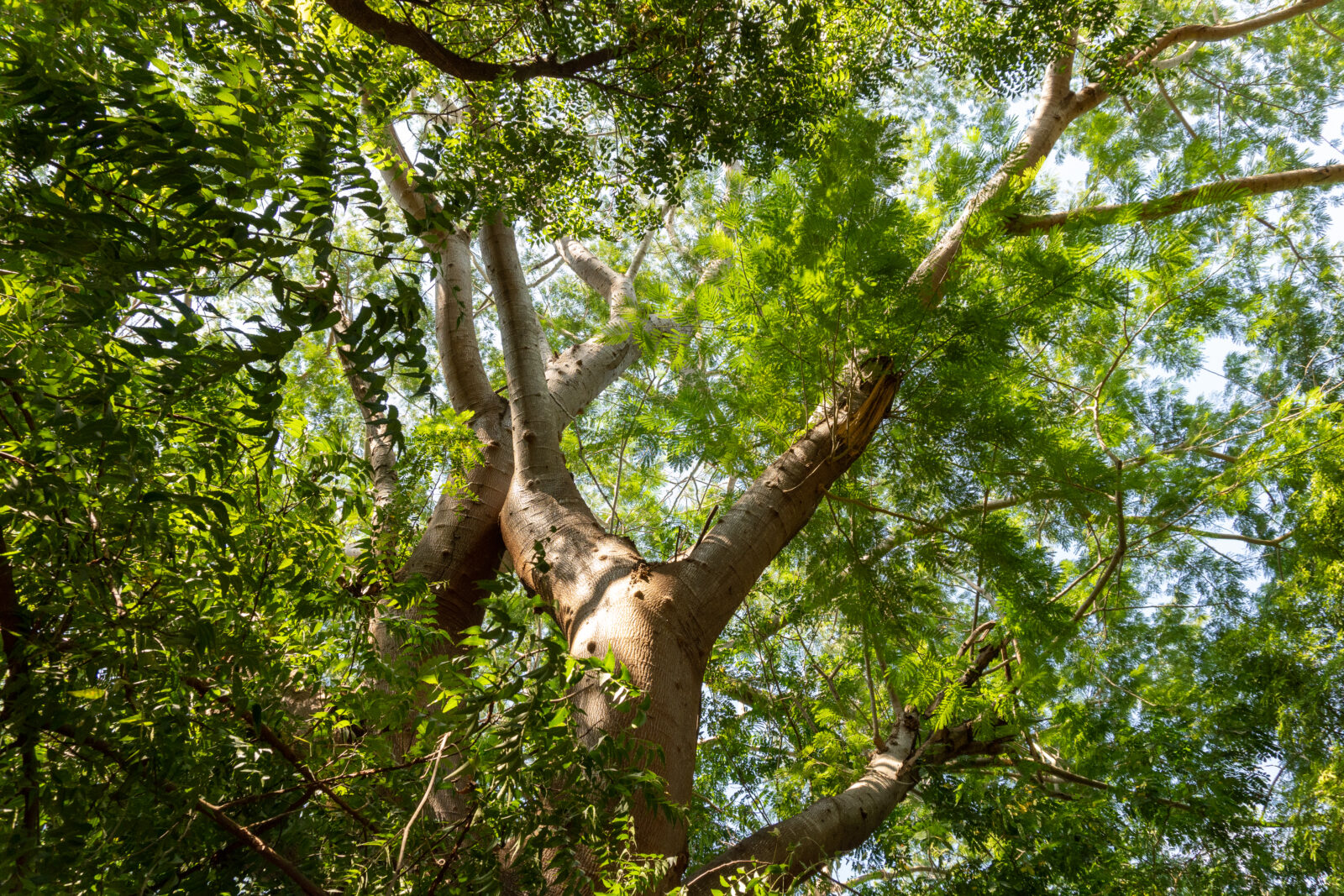
The annual accounts of Trees for All are drawn up in accordance with the Directive for Fundraising Institutions (RJ650), published by the Dutch Council for Annual Reporting.
| Assets | 31 December 2024 | 31 December 2023 |
| Fixed assets | ||
| Fixed assets | 48,319 | 57,497 |
| Current assets | ||
| Taxes | 0 | 0 |
| Receivables and accrued assets | 1,188,809 | 1,068,394 |
| Liquid assets | 7,636,651 | 7,243,658 |
| Total assets | 8,873,779 | 8,369,550 |
| Liabilities | 31 December 2024 | 31 December 2023 |
| Reserves and funds | ||
| Continuity reserve | 1,588,920 | 1,501,056 |
| Designated fund GroenDoen | 177,008 | 356,649 |
| Designated fund International Projects | 323,966 | 0 |
| Total reserves and funds | 2,089,894 | 1,857,705 |
| Short-term and long-term liabilities | ||
| Long-term liabilites | 1,032,250 | 1,012,724 |
| Short-term liabilities | 5,751,635 | 5,499,121 |
| Total liabilities | 8,873,779 | 8,369,550 |
| Income | Results 2024 | Budget 2024 | Results 2023 |
| Income from private individuals | 1,474,594 | 1,671,003 | 1,524,431 |
| Income from businesses | 5,748,671 | 7,815,529 | 6,893,385 |
| Income from lotery organisations | 250,000 | 350,000 | 400,000 |
| Income from other non-profit organisations | 1,295,404 | 1,013,468 | 1,331,174 |
| Total income | 8,768,669 | 10,850,000 | 10,148,990 |
| Expenditure | Results 2024 | Budget 2024 | Results 2023 |
| Expenditure on objectives | |||
| Objective planting forests and trees | 6,773,156 | 8,772,725 | 7,786,296 |
| Objective raising awareness | 699,810 | 777,967 | 591,016 |
| Total expenditure on objectives | 7,472,966 | 9,550,691 | 8,377,312 |
| Costs of own fundraising | 824,391 | 1.032.942 | 790,851 |
| Costs of management and administration | 372,452 | 357.389 | 358,584 |
| Total expenditure | 8,669,809 | 10.941.024 | 9,526,747 |
| Result before financial income and expenses | 98,860 | -91.023 | 622,243 |
| Financial income and expenses | 133,332 | 50.000 | 13,239 |
| Result | 232,192 | -41.023 | 635,481 |
| Result has been allocated to/withdrawn from: | |||
| Continuity reserve | 87,864 | 108,977 | 278,833 |
| Designated fund GroenDoen | -179,638 | -150,000 | 356,649 |
| Designated fund International projects | 323,966 | 0 | 0 |
| Assets | 31 December 2024 | 31 December 2023 |
| Fixed assets | ||
| Acquisition cost | 77,671 | 33,463 |
| Cumulative depreciation | -20,175 | -9,485 |
| Book value as of 1 January | 57,496 | 23,978 |
| Investments | 11,173 | 44,498 |
| Disposals | 0 | -290 |
| Depreciations | -20,350 | -10.979 |
| Cumulative depreciation disposals | 0 | 290 |
| Book value as of 31 December | 48,319 | 57,497 |
| Receivables and accrued assets | ||
| Contributions receivable | 1,165,935 | 1,072,302 |
| Provision for doubtful receivables | -21,080 | -25,874 |
| Prepaid pension contributions | 7,910 | 7,397 |
| Prepaid expenses | 7,541 | 6,396 |
| Other receivables and accrued assets | 28,502 | 8,173 |
| Total receivables and accrued assets | 1,188,808 | 1,068,394 |
| Liquid assets * | ||
| Balance as of 31 December | 7,636,651 | 7,243,658 |
* The liquid assets are at the free disposal of Trees for All and are used for the outstanding project obligations. On 31 December 2024, € 19,188.87 of the assets was not freely disposable, in connection with the bank guarantee given for renting the office.
| Liabilities | 31 December 2024 | 31 December 2023 |
| Reserves and funds | ||
| Continuity reserve | ||
| Balance as of 1 January | 1,501,056 | 1,222,223 |
| Appropriation of result | 87,864 | 278,833 |
| Balance as of 31 December | 1,588,920 | 1,501,056 |
| GroenDoen Fonds | ||
| Balance as of 1 January | 356,649 | 0 |
| Credit: donations | 25,000 | 550,000 |
| Debit: expenditures | -204,641 | -193,351 |
| Balance as of 31 December | 177,008 | 356,649 |
| Bestemmingsfonds Projecten buitenland | ||
| Balance as of 1 January | 0 | 0 |
| Credit: donations | 323,966 | 0 |
| Debit: expenditures | 0 | 0 |
| Balance as of 31 December | 323,966 | 0 |
| Total reserves and funds | 2,089,894 | 1,857,705 |
| Long-term liabilities | ||
| Contribution received in advance from the National Postcode Lottery | 0 | 250,000 |
| Outstanding project obligations | 1,032,250 | 762,724 |
| Which duration > 1 year and < 5 years | 915,120 | 928,521 |
| Which duration > 5 years | 117,130 | 84,203 |
| Total long-term liabilities | 1,032,250 | 1,012,724 |
| Short-term liabilities | ||
| Accounts payable | 35,838 | 83,566 |
| Payroll taxes and social security contributions | 40,542 | 40,007 |
| Holiday entitlement and accrued holiday pay | 91,329 | 86,304 |
| Advance contribution from the National Postcode Lottery | 350,000 | 350,000 |
| Advance contribution programs | 126,427 | 0 |
| Project obligations still to be paid | 4,782,116 | 4,491,179 |
| Programme costs still to be paid | 274,312 | 424,939 |
| Other liabilities and accrued liabilities | 51,071 | 23,125 |
| Total short-term liabilities | 5,751,634 | 5,499,120 |
For the implementation of tree planting and reforestation projects worldwide, Trees for All provides donations to its project partners in the Netherlands and abroad. We often enter into a contractual obligation before the necessary donations have been raised. This was also the case in 2024.
On the balance sheet date, planting obligations had been contracted for a number of trees that was greater than the number for which donations had been received. The same applied to carbon credits. The receipt of future donations is never set in advance. The surpluses are therefore not recognised on the balance sheet. On the other hand, all the contractual obligations entered into are included on the balance sheet as liabilities.
In the past (2007-2011), Trees for All invested in a larger certified reforestation project. Based on the assumptions made, around 81,000 carbon credits could be obtained until 2036. The initial verification was planned to take place in 2020. After that, the first credits to then become available would be used to offset carbon for Trees for All’s donors.
Steps have been taken towards verification in 2024. Monitoring was carried out in 2024 to assess the realised and expected CO2 sequestration. This initial monitoring shows that the amount of CO2 credits is likely to be lower. As the exact impact of this is still uncertain, no reliable estimate of any shortfall can be made at this time. Therefore, no provision has yet been recognised for this.
A rental agreement has been concluded for the use of workplaces at Voetiusstraat 2 in Utrecht, which expires on 30 November 2028. The rent and service costs for 2025 are € 81,361.
| Income | Actual 2024 | Budget 2024 | Actual 2023 |
| Income from private individuals | |||
| Donations for planting trees | 897,249 | 987,449 | 760,116 |
| Donations for carbon offsetting | 388,427 | 450,770 | 399,826 |
| Legacies | 0 | 0 | 109,066 |
| Undesignated income* | 188,918 | 232,784 | 255,423 |
| Total | 1,474,594 | 1,671,003 | 1,524,431 |
| Income from businesses and other non-profit organisations | |||
| Donations for planting trees | 4,741,811 | 4,308,502 | 4,108,039 |
| Donations for carbon offsetting | 1,937,052 | 3,449,578 | 2,785,274 |
| Donations programmes | 198,573 | 850,000 | 1,150,000 |
| Undesignated income* | 166,639 | 220,917 | 181,246 |
| Total | 7,044,075 | 8,828,997 | 8,224,559 |
| Income from lottery organisations | |||
| Income from lottery organisations | 250,000 | 350,000 | 400,000 |
| Total | 250,000 | 350,000 | 400,000 |
| Expenditure | Actual 2024 | Budget 2024 | Actual 2023 |
| Direct costs of the objectives | |||
| Costs for projects abroad | 3,398,163 | 4,623,700 | 4,970,599 |
| Costs for projects in the Netherlands | 2,770,840 | 3,326,834 | 2,299,909 |
| Other project costs | 150,450 | 320,000 | 96,078 |
| Total | 6,319,453 | 8,270,534 | 7,366,586 |
| Personnel costs | |||
| Gross wages | 1,161,874 | 1,218,828 | 1,032,639 |
| Social security contributions | 189,249 | 246,957 | 167,790 |
| Pension contributions | 47,976 | 54,078 | 36,742 |
| Absenteeism insurance | 56,101 | 52,500 | 48,131 |
| Other personnel costs | 132,531 | 201,625 | 108,901 |
| Travel expenses | 43,337 | 46,000 | 43,687 |
| Total | 1,631,068 | 1,819,988 | 1,437,890 |
| Staff | |||
| Number of FTE staff at 31 December 2024 | 20.13 | 19.75 | 17.65 |
| Staff employed this year and/or parts of the year | 26 | 23 | 25 |
| Accomodation costs | |||
| Office rent | 75,821 | 75,000 | 65,564 |
| Other accomodation costs | 18,110 | 15,000 | 15,035 |
| Total | 93,931 | 90,000 | 80,599 |
| Office costs | |||
| Office expenses | 5,409 | 10,000 | 9,745 |
| Automation costs and licences systems | 98,595 | 118,400 | 90,560 |
| Total | 104,004 | 128,400 | 100,305 |
| Depreciation costs | |||
| Inventory | 8,928 | 12,000 | 2,412 |
| Automation | 11,422 | 9,600 | 8,567 |
| Total | 20,350 | 21,600 | 10,979 |
| Fundraising costs | |||
| Marketing and communication | 381,460 | 505,000 | 398,993 |
| Total | 381,460 | 505,000 | 398,993 |
| General costs | |||
| Bank costs | 23,563 | 35,000 | 22,235 |
| Accountancy fees | 33,004 | 22,000 | 22,087 |
| Consultancy fees | 8,608 | 25,000 | 22,792 |
| Contributions and subscriptions | 24,833 | 25,000 | 20,914 |
| Release of doubtful contributions from the previous financial year | -21,199 | 0 | -3,031 |
| Provision for doubtful contributions | 21,830 | 0 | 25,874 |
| Board coasts** | 10,063 | 10,500 | 9,183 |
| Other general costs | 18,843 | 13,000 | 11,340 |
| Total | 119,545 | 130,500 | 131,394 |
* Trees for All donors can indicate that their donation is for specific projects (designated) or for the organisation in general (undesignated). If no allocation is specified, Trees for All allocates the donation to the projects available.
** For its work, the board received a volunteer allowance (pro rata) of € 2,100 per person (2023: € 1,900). The board members have no secondary posts (remunerated or unremunerated) that might conflict with the activities and/or objectives of Trees for All. There are also two volunteers who do occasional work for Trees for All.
| Expenditure | Objective planting forests and carbon offset | Objective awareness-raising | Costs of fundraising | Management and administration | Total result 2024 | Total budget 2024 | Total result 2023 |
| Direct costs of the objective | 6,234,746 | 84,707 | 0 | 0 | 6,319,453 | 8,245,534 | 7,366,586 |
| Personnel costs | 439,956 | 411,400 | 483,561 | 296,150 | 1,631,068 | 1,819,988 | 1,437,890 |
| Accomodation costs | 22,071 | 24,820 | 31,128 | 15,912 | 93,931 | 90,000 | 80,599 |
| Office costs | 24,438 | 27,481 | 34,466 | 17,619 | 104,004 | 128,400 | 100,305 |
| Depreciation costs | 4,782 | 5,377 | 6,744 | 3,447 | 20,350 | 21,600 | 10,979 |
| Financing costs | 5,537 | 6,226 | 7,809 | 3,992 | 23,563 | 35,000 | 22,235 |
| Fundraising costs | 19,073 | 114,438 | 228,876 | 19,073 | 381,460 | 505,000 | 398,993 |
| General costs | 22,553 | 25,361 | 31,808 | 16,259 | 95,981 | 95,500 | 109,159 |
| Total | 6,773,156 | 699,810 | 824,392 | 372,452 | 8,669,810 | 10,941,022 | 9,526,746 |
| Cost allocation | Objective planting forests and carbon offset | Objective awareness-raising | Costs of fundraising | Management and administration | Total result 2024 | ||
| Personnel costs | 27% | 25% | 30% | 18% | 100% | ||
| Accomodation costs | 23% | 26% | 33% | 17% | 100% | ||
| Office costs | 23% | 26% | 33% | 17% | 100% | ||
| Depreciation costs | 23% | 26% | 33% | 17% | 100% | ||
| Financing costs | 23% | 26% | 33% | 17% | 100% | ||
| Fundraising costs | 5% | 30% | 60% | 5% | 100% | ||
| General costs | 23% | 26% | 33% | 17% | 100% | ||
The cost allocations for 2024 for costs that cannot be directly allocated are determined on the basis of job profiles and time spent on activities. The outcomes of the time spent on activities are linked to these profiles, following which the allocation of the organisation’s activities is made, on the basis of the hours worked. At the end of 2024, the time spent on activities was checked through time registration and corrected where necessary.
| 2024 | 2024 | 2024 | |
|---|---|---|---|
| Name | S. Groenendijk | S. Groenendijk | S. Röell |
| Function | Managing Director | Director Fundraising, | Director Projects & Innovations |
| Marketing & Communications | |||
| Contract | |||
| Nature of contract (duration) | Indefinite period | Indefinite period | Indefinite period |
| Hours | 40 | 40 | 40 |
| Part-time percentage | 100 | 100 | 100 |
| Period | 01-01-24 t/m 30-9-24 | 01-10-24 t/m 31-12-24 | 01-10-24 t/m 31-12-24 |
| Renumeration | |||
| Gross wage/salary | 75,011 | 25,004 | 24,000 |
| Holiday allowance | 5,818 | 1,939 | 1,920 |
| Other | 495 | 165 | 165 |
| Total annual income | 81,324 | 27,108 | 26,085 |
| Pension costs (employer's sharel) | 8,142 | 2,714 | 3,144 |
| Total annual income (incl. pension costs) | 89,466 | 29,822 | 29,229 |
| Total 2023 | 80,736 | 26,912 | 0 |
| BSD score | |||
| Criterion | 395 | 344 | 344 |
Utrecht, 21 May 2025
Mateo Mol
Chairman
Kees Romme
Treasury Manager
Cor von Meijenfeldt
Board member
Frederike Hummel
Board member
Frederique de Jong Schouwenburg
Board member
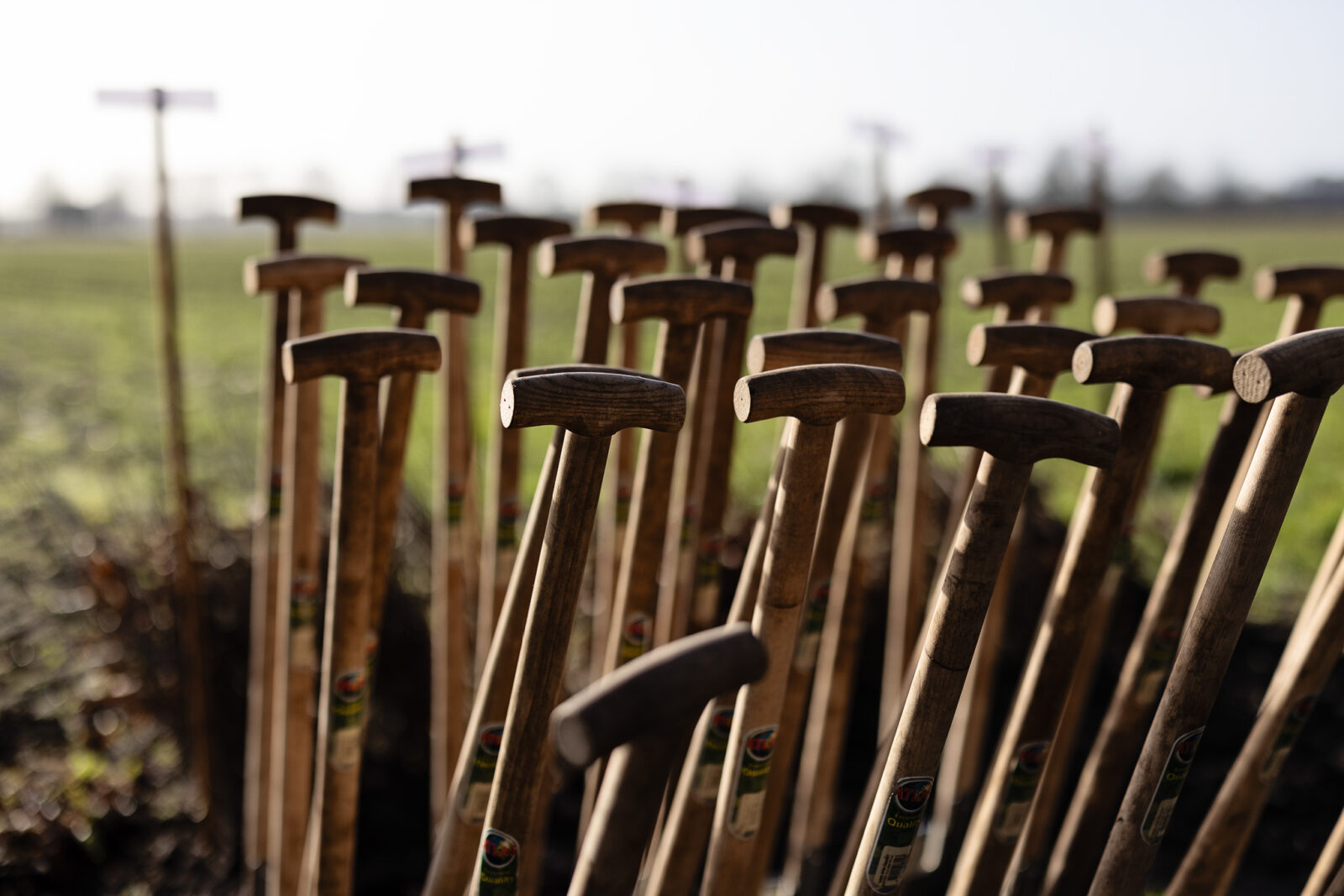
The accounting policies set out how we have determined the value of the annual accounts and the various items from the annual accounts.
Drawing up the annual accounts requires the board to form judgements and make estimates and assumptions. These influence the application of accounting policies and the reported value of assets, liabilities, income and expenditure. The actual results may therefore differ from these estimates.
The estimates and underlying assumptions are assessed continually and reviewed where necessary. Amendments are included in the period in which the estimate is reviewed and in future periods for which the amendment has consequences.
Compared to last year, there was no change to the accounting policies applied for the valuation and determination of results.
The annual accounts have been drawn up on the basis of the going concern assumption. This means that our valuation of the assets and liabilities and our determination of the results are based on the assumption that our activities are continued.
Designated fund GroenDoen Fonds
The annual accounts include a designated fund for our GroenDoen Fonds. Contributions we received in 2024 that have not yet been spent on projects are added to this. In 2025, the related expenditure is charged to this fund.
Designated fund International Projects
In the annual accounts, the designated fund International Projects has been created for our CO2 project in Tanzania. The contributions received in 2024 are added to this. In 2025, the related expenditure will be charged in part to this fund.
There are outstanding project obligations that we concluded in US Dollars. In order to cover the difference in exchange rate, an equivalent amount in US Dollars is reserved in liquid assets. On the balance sheet date, both positions are converted to Euros at the exchange rates applicable on that date.
The fixed assets are valued at the cost price (acquisition or manufacturing cost), after deduction of depreciation. Depreciation is calculated in accordance with the linear method based on the estimated economic life.
Any residual value is taken into account in the calculation. Depreciation takes effect from the time of being taken into use. Depreciation on tangible fixed assets is calculated on the basis of the estimated useful life.
Estimated useful life of the fixed assets:
Receivables, prepayments and accrued income are initially recognised at fair value and subsequently at amortised cost price. Provision for bad debts is deducted from the book value of the receivable.
The liquid assets are recognised at nominal value.
The foundation’s reserves and funds are divided into different reserves and funds:
Provisions are included for legal or constructive obligations. These are the result of an event in the past for which a reliable estimate can be made. An outflow of funds will probably be necessary to settle such an obligation.
Liabilities and accruals and deferred income are initially recognised at fair value and subsequently at amortised cost price. All contractual obligations concluded and formal declarations of intent (constructive obligations) are included as project financing, under the project obligations still to be paid. A distinction is made between short-term liabilities (with a duration of less than one year) and long-term liabilities (with a duration of more than one year).
The pension scheme of the employees of Trees for All Stichting is insured with a.s.r. The old-age pension is a pension scheme based on individual defined contribution agreements. The contribution we pay to the pension provider is recognised as an expense in the statement of income and expenditure.
When the contribution has not yet been paid to the pension provider, it is included on the balance sheet as an obligation. When the contributions already paid exceed the contributions owed on the balance sheet date, then a deferred asset item is included.
In the case of a pension scheme deficit, Trees for All is not obliged to pay supplementary contributions. For this reason, the contributions relating to a particular period are charged to the results in that period.
Income and expenditure are recognised in the period to which they relate. Caution is exercised in applying the policies. Income is recognised only if it is realised by the balance sheet date. Expenditure and risks from before the end of the financial year are included if they became known before drawing up the annual accounts.
The results are determined as the difference between the income and the expenditure over the reporting year, taking account of the aforementioned accounting policies.
The following income is recognised in the year in which it is received:
Income from long-term partnerships with businesses and other non-profit organisations is recognised in the year it is pledged (based on the contract).
The income from lotteries comes from the Nationale Postcode Loterij. These contributions are recognised in the year in which the costs are incurred.
Income from legacies is recognised throughout the financial year, insofar as the scope of the legacy can be reliably determined. Advances are recognised in the year in which the respective amounts are received.
Under spending on objectives, we recognise the project and programme obligations entered into at the time they are entered into or when formal declarations of intent (constructive obligations) regarding them are made. If the funds raised for a project exceed the project obligations entered into, the difference is recognised in this item as an Obligation still to be entered into.
The internal costs include costs for personnel, accommodation, office, fundraising and general costs. These internal costs are allocated to the objectives, and to the costs of fundraising, and management and administration. The costs of management and administration comprise the costs incurred by the organisation in relation to (internal) business operations.
The personnel costs are the costs of permanent and hired staff. They form the greater part of the internal costs. Personnel costs are incorporated in the statement of income and expenditure on the basis of the conditions of employment, insofar as they are payable to employees.
Interest income is recognised in the period to which it relates. The same applies to interest expenditure and similar expenditure.
The annual accounts incorporate events that provide information about the actual situation on the balance sheet date and which appear up to the date of drawing up the annual accounts. If such events do not pertain to the actual situation on the balance sheet date, but are important for users of the annual accounts to form judgements, then their nature and their estimated financial consequences are explained in the annual accounts as events after the balance sheet date.
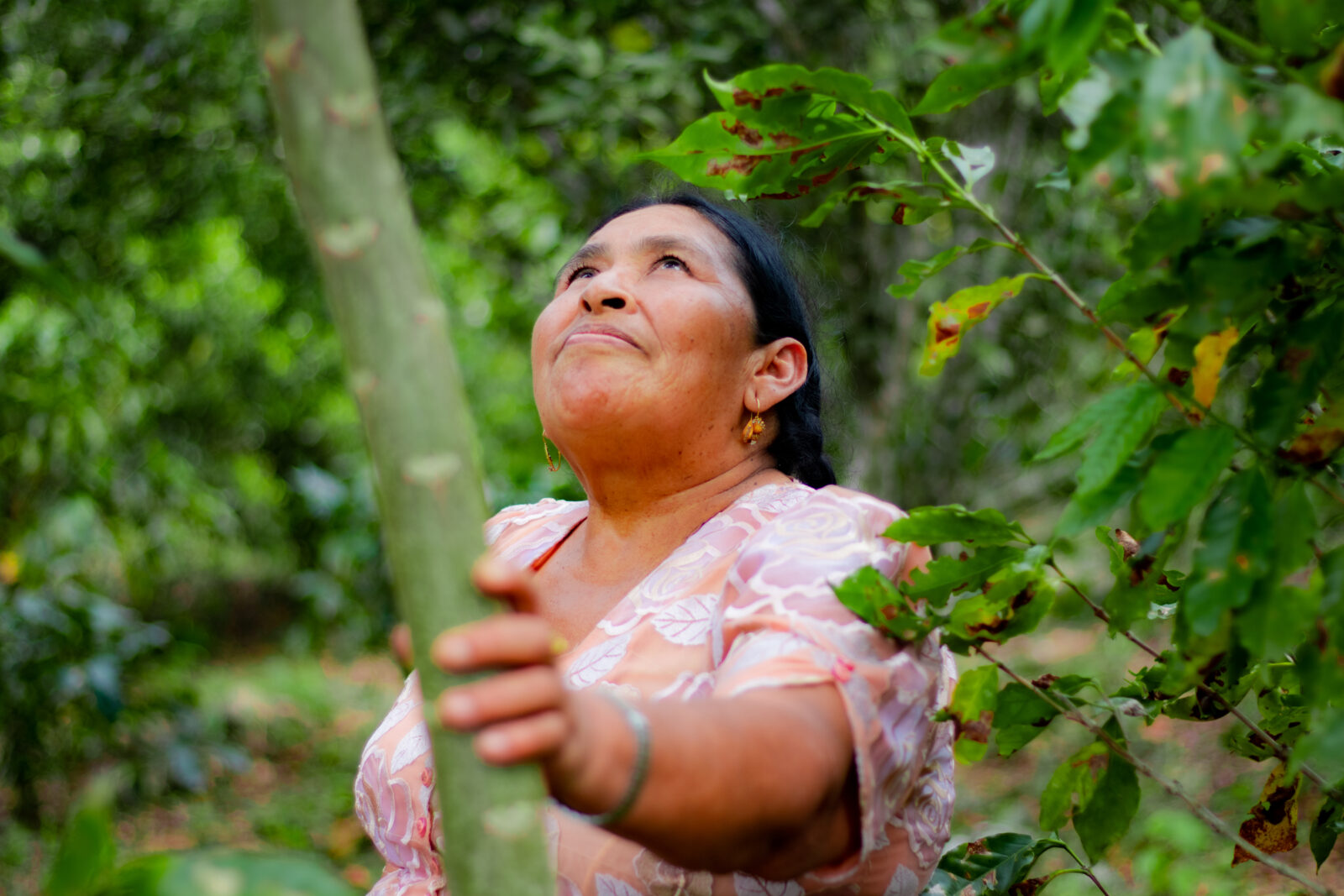
In 2025, too, we want our work to make an impact worldwide. Here, we explain how we aim to fulfil this ambition.
In recent years, our corporate fundraising has been successful and we have generated a wide support base of business partners. At the same time, the market around us is constantly developing and we want to continue to stand out as an organisation. This requires a more proactive and targeted approach in our collaboration with businesses.
In 2025, we are therefore making a clear distinction between various types of business partner. This target group-based approach allows us to better meet the wishes of businesses and provide customisation. Meanwhile, we continue to invest in existing relationships and to broaden the collaborations by, for example, partnering with businesses that not only support us financially, but also share their knowledge and expertise. This is a valuable development with great potential.
2024 saw a decrease in demand from businesses for carbon sequestration. This was due in part to negative reports on the theme of carbon offsetting and to the shift from offsetting to reducing emissions. We applaud this latter development wholeheartedly and will therefore provide businesses with better support in this area in the coming year. We will do so, for example, through tools for footprint analyses and by linking up with reporting requirements and CSRD policy.
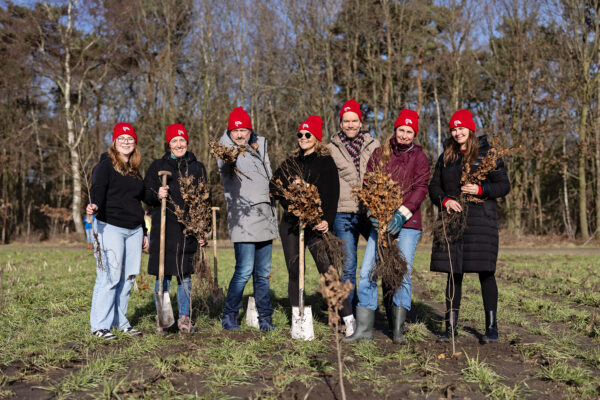
We saw a positive trend in 2024 among our private donors: the number of repeat donations is rising. We would like to continue this trend by involving donors in our work as much as possible. We will therefore continue to invest in updates on their donations and organise tree planting days for private donors, and we will introduce an online donors’ panel, in order to find out even more about the wishes of our supporters.
To attract new donors, we are working on increasing our brand awareness. Successful campaigns like Earth Day and Green Friday will be continued. We are also exploring the use of mass media like TV. And thanks to a partnership with the NS, we will gain visibility on trains in the Netherlands.
Finally, we are building further on the collaboration with our ambassadors, whose wide support bases are an invaluable way of getting people involved in our work.
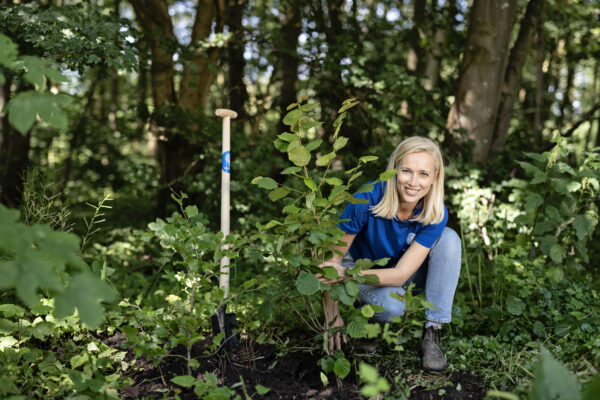
Besides businesses and private individuals, we are focusing in 2025 on a new target group: funds and major donors. This involves donations from equity funds or family foundations, for example, or large private donations and legacies.
We are starting to build up a relevant network of funds and foundations who want to contribute to our goals. We are also responding further to the growing interest in lifetime trusts and bequests to charities. In recent years, the first people have already chosen to include Trees for All in their will. We are very grateful for this special form of support, and in the coming year we hope to inspire more people to choose this way of handing down a world with more forests.
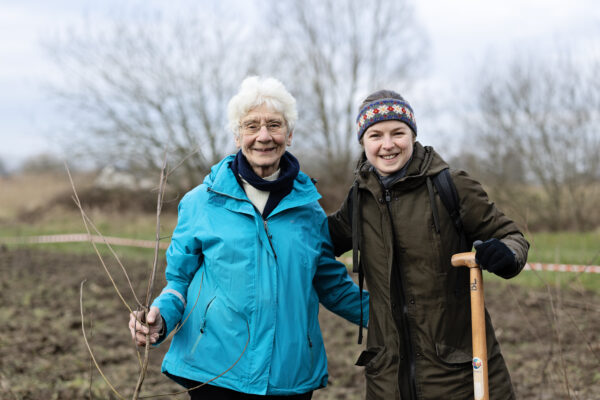
In 2025, we will continue to facilitate projects that contribute to greening the Netherlands. In doing so, we can count on the long-term collaborations with our current project partners. In addition, we are broadening our collaboration with project partners, knowledge institutes and universities, to improve the monitoring of biodiversity in our projects, for example.
In implementing our programmes (like Trees for Schools and the GroenDoen Fonds), we receive support from Univé, Arla Foods and ASML. We spend part of the budget on acquisition, in order to attract new schools to Trees for Schools and to facilitate more local greening initiatives through our GroenDoen Fonds.
For instance, we are working on two pilots to green industrial estates and the healthcare sector in the Netherlands.
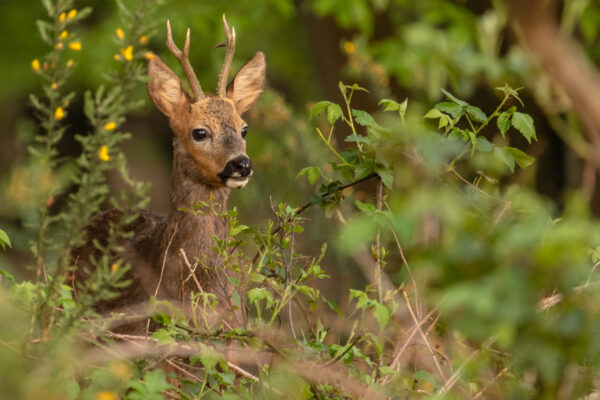
Internationally, we are reinforcing existing partnerships and expanding the number of projects in Europe. In addition, we are focusing on the development of scalable reforestation concepts. In recent years, for instance, we have contributed to the transformation of invasive grasslands in Indonesia into tropical rainforest. The method has proved successful, and we may be able to use it in other places in Asia.
We are also expecting our new reforestation project in Tanzania to be certified by Plan Vivo in the first half of 2025. Then it will be possible for donors to contribute to this project as well.
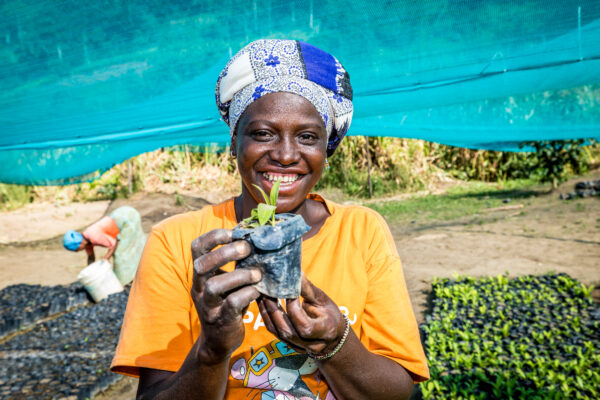
And finally, we are broadening the impact of our work. For example, we are carrying out studies into improved water absorption in Bolivia, thanks to tree planting. And on Borneo, we want to contribute to constructing water dams, which are essential for healthy peat swamp forests. Furthermore, in 2025 we are implementing a new monitoring policy in order to better map out the impact we are making worldwide.
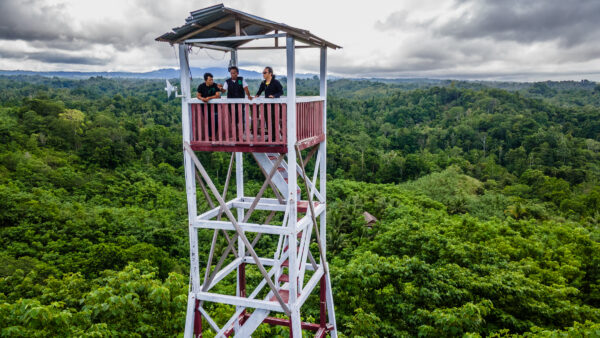
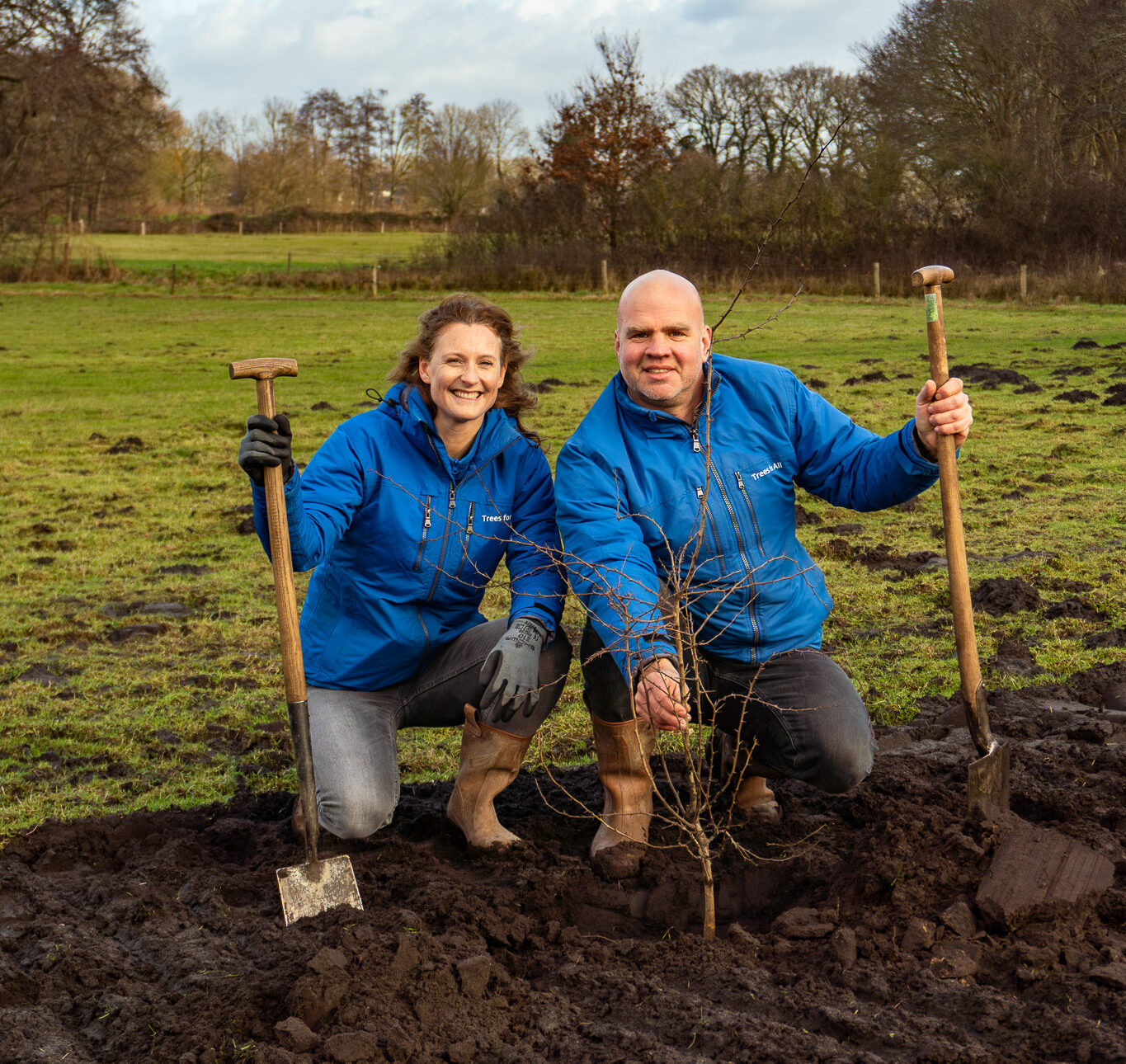
In this way, in 2025 we are taking the next step in our mission of planting more trees worldwide, protecting existing forests and raising even more people’s awareness of the importance of trees. Your support helps us to fulfil this mission, and together we can create a green and healthy planet. Thank you!
On behalf of the management,
Stef Röell (director of Projects & Innovation) and Marieke Romano (director of Fundraising, Marketing & Communications)
The budget takes account of possible price increases.
| Income | Budget 2025 | Realisation 2024 | Budget 2024 |
| Income of private individuals | 2,010,033 | 1,474,594 | 1,671,002 |
| Income of businesses and other non-profit organisations | 6,444,310 | 6,194,075 | 7,978,998 |
| Income of lottery organisations | 350,000 | 250,000 | 350,000 |
| Income of programmes | 1,470,798 | 850,000 | 850,000 |
| Total income | 10,275,141 | 8,768,669 | 10,850,000 |
| Expenditure | Budget 2025 | Realisation 2024 | Budget 2024 |
| Spent on objectives: | |||
| Objective CO2 offset and planting forests | 8,189,122 | 6,773,156 | 8,772,725 |
| Objective awareness-raising | 909,996 | 699,811 | 777,967 |
| Total spent on objectives | 9,099,118 | 7,472,967 | 9,550,692 |
| Fundraising costs | 1,196,943 | 824,392 | 1,032,942 |
| Management and administration costs | 465,639 | 372,452 | 357,389 |
| Total expenditure | 10,761,700 | 8,669,811 | 10,941,023 |
| Financial income and expenditure | 80,000 | 133,332 | 50,000 |
| Result | -406,559 | 232,192 | -41,023 |
| Result has been allocated to / withdrawn from: | |||
| Continuity reserve | 20,940 | 87,864 | 108,977 |
| Designated funds | -427,500 | 144,328 | -150,000 |
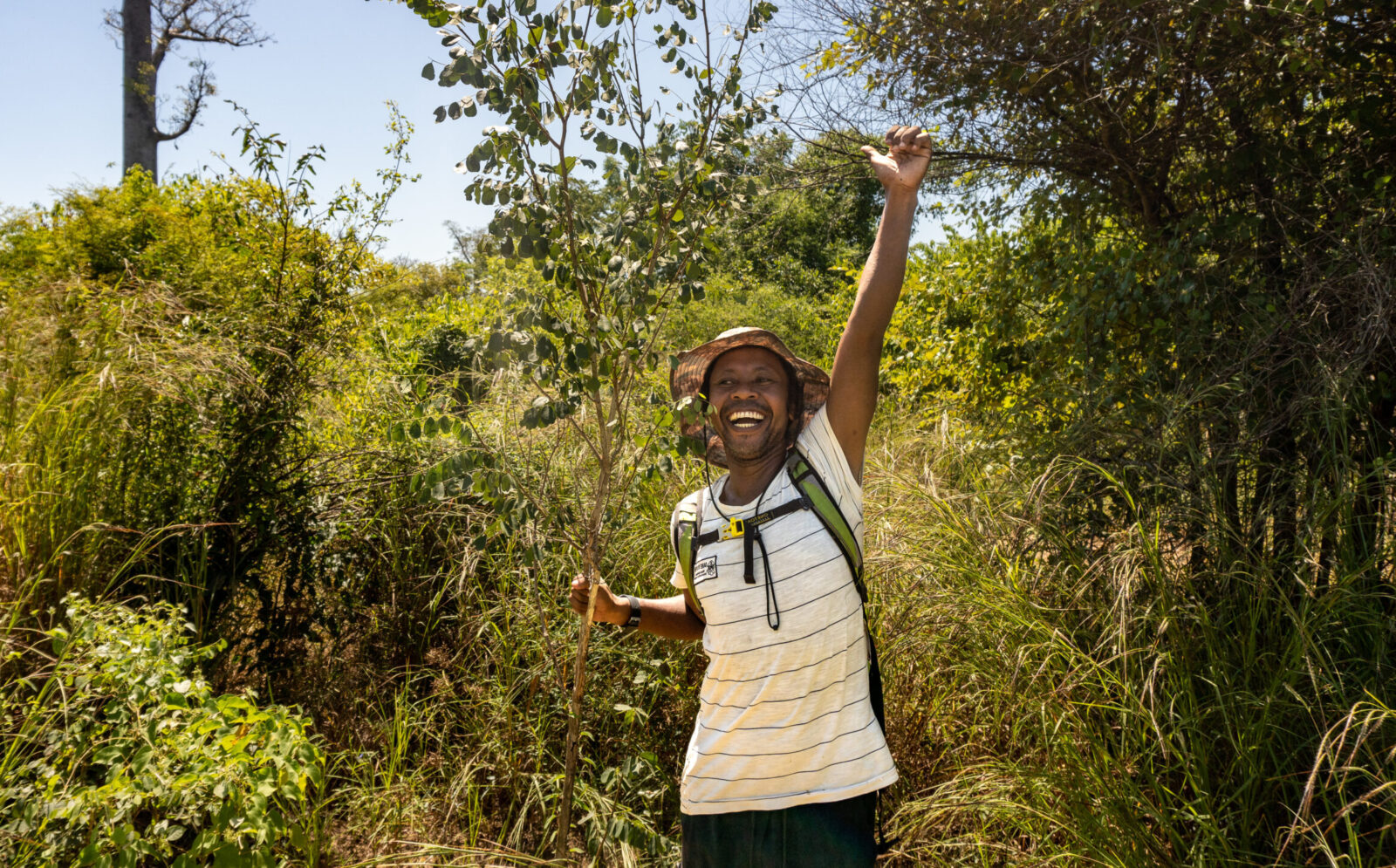
We hope we can count on your support (again) in 2025. Plant a tree directly or read more about our work on our website.
